

















plus+ SUMMER • 2023
Cooling Persists, Employers are Reducing their Workforces p 6 AI: A Cautionary Tale for NonLawyers p 22 LIGHTS! CAMERA! ACTION! Shareholder Meetings Enter the Modern Age p 12 Leveling the Playing Field – Achieving Some Tort Reform Across the United States p 8 Common Pitfalls of 1031 Exchanges p 28
As Talk of the Economy
When
Ladder collapsed?
Base of the ladder slipped?
Analysis determined that the worker overreached, causing the ladder to become unstable and fall.

it comes to workplace incidents, our team of industrial hygienists, biomechanists, and Imaging Sciences visualization specialists provide an unparalleled ability to dig beyond the conjecture and speculation to find and convey the truth like no one else.
Broken rung?
Improper set-up?
2023 800.782.6851 SEAlimited.com Since 1970 Know. SUBMIT AN ASSIGNMENT Forensic Engineering, Investigation and Analysis
Partner USLAW NETWORK Inc. since 2004.
©
Proud
FEATURES:
IMMIGRATION 101
By Amy Erlbacher-Anderson • Baird Holm LLP
As Talk of the Economy Cooling Persists, Employers are Reducing their Workforces
By: Julie Proscia • Amundsen Davis, LLC
Leveling the Playing Field – Achieving Some Tort Reform Across the United States
By Kyle Weaver and Christopher Barkas • Carr Allison
Moving Toward a Cohesive COVID Court System?
An Analysis of Federal Jurisdiction of Personal Injury Claims Arising Out of the Pandemic
By Brendan T. Vandor • Williams Kastner
LIGHTS! CAMERA! ACTION!
Shareholder Meetings Enter the Modern Age
By John D. Cromie • Connell Foley LLP
CANNABIS INSURANCE: COVERAGE AND CONSIDERATIONS
page 2
page 6
page 8
Name image and likeness: Business, legal, and fairness considerations for companies engaging in NIL deals with student-athletes
By Justin B. Jones • Fee, Smith & Sharp LLP page 24
Advances in Cell Phone Technology for Rapid Accident Responses
By Jake Pipinich and Charlie Schreck, Pierce Couch Hendrickson Baysinger & Green, LLP page 26
Common Pitfalls of 1031 Exchanges
By Zachary S. Berry • Moran Reeves & Conn PC page 28
DIVERSITY, EQUITY, and INCLUSION in INVESTIGATIONS: A CRITICAL ASSET for EVERY INVESTIGATION
page 10
page 12
By Elizabeth Dalberth • Sweeney & Sheehan, P.C. page 14
“Pixels” and “Cookies,” Charming Terms for Tracking Technology, Can Lead to Ugly Data Privacy Headaches
By Molly Arranz and Sofia Valdivia • Amundsen Davis LLC page 16
AI Adoption Poses Privacy, Legal Pitfalls
By Daniel E. Furshpan and Ibtidanoor Rahman • Rivkin Radler LLP. page 18
A Premises Liability Case Study: Baker o/b/o Balam v. TJ Inc. d/b/a Beauty Land Beauty Supply
By Nicholas K. Thompson • Copeland Cook Taylor & Bush, P.A page 20
AI: A Cautionary Tale for Non-Lawyers
By S. Katie Calvert • Quattlebaum, Grooms & Tull PLLC page 22
DEPARTMENTS:
By Amie Norton • Marshall Investigative Group page 30
Planning for Exemption Reduction: Why Business Owners Need to Consider Advance Gifting Ahead of 2026
By Richard R. Marsh • Flaherty Sensabaugh Bonasso PLLC page 32

Negligent Entrustment2... How far does the liability extend?
By Erica Spurlock and Seraphim Sparrow • Jones, Skelton & Hochuli, P.L.C. page 34
What Makes a Good Trial Theme?
By Christina Marinakis, J.D., Psy.D. and David Metz
IMS Consulting & Expert Services page 36
When Energy Ignites: Exploring Thermal Runaway Failure Modes in Lithium-ion Batteries
By Sanket Kadam • S-E-A page 38
Why Should Workers’ Compensation Carriers, Self-Insured and Injured Workers Care about the Medicare Secondary Payer Act?
By John Kane, AIC, MSCC, CMSP-F • Ametros page 40
PLAYING OFFENSE, a new perspective on defense strategies and countering the “attorney-driven medical” cases
By Melissa Casey • MehaffeyWeber page 42
The articles contained herein are for informational purposes only and are not intended to be the basis for decisions in specific situations nor a substitute for legal counsel. Copyright © 2023 USLAW NETWORK, Inc. All rights reserved. From the
..........................................................
faces of
.......................................................... page
firms on
..................................................... page
Successful verdicts & transactions ........................ page
diversity, equity and inclusion .............................. page
in his words ........................................................... page
pro bono Spotlight ................................................. page 60 About USLAW ............................................................ page 62 USLAW NETWORK SourceBook ..................................... page 64 uslaw member firm listings ..................................... page 67 telfa listings .......................................................... page 77 Spotlight on Corporate Partners............................ page 79
Chair
page 1
uslaw
45
the move
50
52
56
59
table of contents SUMMER 2023
www.uslaw.org
At Arcadia, our passion for empowering people is at the heart of everything we do. Our knowledge helps resolve conflicts, reduce litigation expenses and create long-term financial security for people involved in personal injury claims — helping settle over 500,000 claims, and positively impacting the lives of those we serve. Over 1,000 clients rely on Arcadia; we invest significantly in the development of innovative products and security tools that make doing business with us easier, and helping your clients settle more cases, faster.
• Licensed in all 50 states & Canada
• Experienced settlement consultants
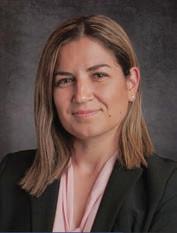
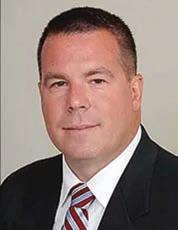
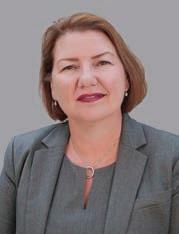

• Lifetime payments & tax-advantaged income
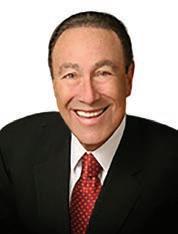
• Spendthrift protection using a myriad of settlement tools
Visit teamarcadia.com | call 810.376.2097
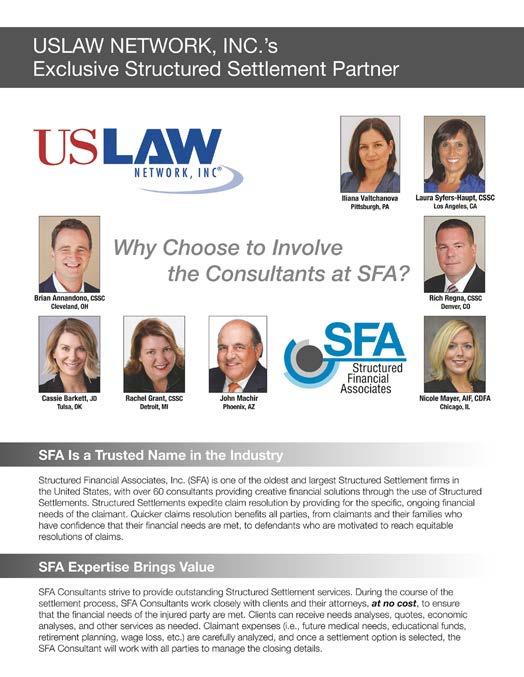 Rachel Grant, CSSC Detroit, MI
Rich Regna, CSSC Denver, CO
Iliana Valtchanova Pittsburgh, PA
Len Blonder Los Angeles, CA
Rachel Grant, CSSC Detroit, MI
Rich Regna, CSSC Denver, CO
Iliana Valtchanova Pittsburgh, PA
Len Blonder Los Angeles, CA
Our humanistic approach leads to better settlements for your clients.
from the Chair’s Desk
Artificial intelligence. Immigration. Diversity. Remote work. Cannabis. These issues impact the workplace daily. Through this issue of USLAW Magazine, we bring you insights, perspectives and what you need to know about these hot topics and more. Our member attorneys and exclusive corporate partners share updates and observations on these matters, delivering timely information on issues impacting today’s businesses. Stay on top of the “great resignation,” learn more about the impacts and precautions of ChatGPT, see how the “remote” world impacts board meetings, and enjoy a good read about the intersection of corporate sponsorships and college athletes through “NIL” deals.
In this issue, we share recent member successes in the courtroom, plus several successful transactions. We succeed when our clients succeed, and we are proud to share some of our members’ positive impacts on behalf of and for their clients. Our members are also generous in their time providing pro bono legal assistance to low-income individuals and organizations, and we highlight several pro bono champions in this issue.
USLAW provides complimentary client resources and a destination to connect with legal counsel wherever your legal needs arise. Please bookmark this magazine’s member directory and client resources sections, visit our website, uslaw.org, and call us directly to let us know how we can assist you with your legal needs.
Enjoy this latest issue of USLAW Magazine. Thank you for your support of USLAW and our members.
Sincerely,
Amanda Pennington Ketchum
USLAW NETWORK Chair Dysart Taylor | Kansas City, MO
Publisher RogeR M. Yaffe
Editor Connie WilSon
Art Director Jeff fReiBeRT • Compass Creative
BOARD OF DIRECTORS
aManda P. KeTChuM, ChaiR Dysart Taylor, Kansas City, MO
oSCaR J. CaBanaS, ViCe ChaiR Wicker Smith, Miami, FL
KenneTh B. WingaTe, SeCReTaRY/TReaSuReR Sweeny, Wingate & Barrow, P.A., Columbia, SC
TaMaRa B. gooReViTz, MeMBeRShiP ManageMenT diReCToR Franklin & Prokopik, P.C., Baltimore, MD
ThoMaS S. ThoRnTon, iii, ClienT liaiSon diReCToR Carr Allison, Birmingham AL
JennifeR d. TRiCKeR, aSSiSTanT TReaSuReR Baird Holm LLP, Omaha, NE

BRadleY a. WRighT, PRaCTiCe gRouP liaiSon Roetzel & Andress, Cleveland, OH
RodneY l uMBeRgeR, iMMediaTe PaST ChaiR Williams Kastner, Seattle, WA
dan l longo, ChaiR eMeRiTuS Murchison & Cumming LLP, Los Angeles, CA
KeVin l fRiTz, ChaiR eMeRiTuS Lashly & Baer, P.C., St. Louis, MO
BaRBaRa BaRRon MehaffyWeber Houston, TX
douglaS W. ClaRKe Therrien Couture Joli-Coeur
Montreal, Quebec, Canada
KeelY e duKe Duke Evett, PLLC Boise, ID
STanfoRd P. fiTTS
Strong & Hanni, PC
Salt Lake City UT
JeSSiCa l. fulleR Lewis Roca
Denver, CO
eaRl W. houSTon, ii
Martin, Tate, Morrow & Marston, P.C. Memphis, TN
MeRTon a hoWaRd Hanson Bridgett LLP San Francisco, CA
MiChael a ludWig
Jones, Skelton & Hochuli, P.L.C. Phoenix, AZ
RoBYn f. MCgRaTh Sweeney & Sheehan, P.C. Philadelphia, PA
JeffReY l o’haRa Connell Foley LLP
Roseland, NJ
laRRY a. SCheChTMan Amundsen Davis LLC Chicago, IL
fRedeRiCK M. heiSeR
Future USLAW Leaders Representative Klinedinst PC Irvine, CA
MiChael C. TYSon Diversity Council Representative Wicker Smith Orlando, FL
KaRen a. VeRKeRK
TELFA Representative Dirkzwager Arnhem, Netherlands
leW R. C. BRiCKeR, Chair eMerituS Amundsen Davis LLC, Chicago, IL
John d. CRoMie, Chair eMerituS Connell Foley LLP, Roseland, NJ
ThoMaS l oliVeR, ii, Chair eMerituS Carr Allison, Birmingham, AL
®
RogeR M. Yaffe, Chief exeCutive OffiCer roger@uslaw.org
®
CheRYl hanleY, PraCtiCe GrOuP, SPeCial PrOjeCtS, and COrPOrate Partner direCtOr cheryl@uslaw.org
BRiana SelleRS, direCtOr Of MeetinGS and eventS briana@uslaw.org
JennifeR Randall, MeMberShiP ServiCeS ManaGer jennifer@uslaw.org
Paige ThoMPSon, MeMberShiP ServiCeS COOrdinatOr paige@uslaw.org
Connie WilSon, COMMuniCatiOnS SPeCialiSt connie@uslaw.org
uslaw.org • Phone/Fax 800.231.9110
US LAW www.uslaw.org 1
www.uslaw.org
IMMIGRATION 101
While the U.S. immigration system is remarkably complex, it is ultimately based on four principles: family unification, admitting immigrants with skills valuable to the U.S. economy, protecting refugees, and promoting diversity.

OVERVIEW
To begin with, a person must have a visa status to enter on a temporary basis and to remain on a permanent basis. Most enter in a temporary visa status, then obtain permanent status through one of several methods.
NONIMMIGRANT VISA STATUS
A nonimmigrant visa status allows a foreign national to enter for a pre-determined amount of time for a specific purpose. It is generally obtained by application to the U.S. Department of State (USDOS) and the issuance of a visa stamp at a U.S. consulate in their home country but may also be obtained through a petition to change of status approved by the U.S. Citizenship and Immigration Service (USCIS) when the person is present legally in the U.S. Note: a visa stamp is a colored foil placed by a U.S. consulate in a passport, allowing entry in the status and between the dates listed on the stamp; visa status is the rights received by entering the U.S. or being approved for a change of status.
The most common visa used to enter the U.S. is the B-1/B-2 visitor visa (individuals from select countries may enter with no visa stamp under the Visa Waiver Program (ESTA if apply electronically)). The B-1/ B-2 visa allows entry for up to 6 months for travel or business. It does not provide work authorization, including working remotely for a business located in another country,
except in limited circumstances. A B-1 visa entry allows one to perform services in the U.S. for a company abroad, while on their payroll, for a small number of purposes. A B-2 visa entry is for travel only.
The most common employment-based, nonimmigrant visas include:
H Visas – a limited number of H-1B and H-2A/B visas are available each governmental fiscal year (i.e. - 65,000 regular H-1B visas and an additional 20,000 for advance degree graduates from a U.S. university). Most years or, in the case of H-2 visas, every six months, H visas are exhausted before the fiscal year begins.
a. H-1B – for employment in a specialty occupation of a person who holds the credentials required by the position. The position must require application of a body of specialized knowledge and at least a bachelor’s degree. A total of six years of visa validity is available, except under special circumstances. The employer must pay the “prevailing wage” for the position and location of employment, to which the U.S. Department of Labor must attest.
b. H-2A – for employment as a temporary or seasonal agricultural worker. Employers conduct required recruitment to demonstrate that there are no available U.S. workers and pay the prevailing wage.
c. H-2B – for employment as a temporary, seasonal, or intermittent non-agricultural worker. The position may be skilled or unskilled, such as: landscapers, hotel or resort employees, certain childcare workers, and sports instructors.
2 SUMMER 2023 USLAW MAGAZINE US LAW
Amy Erlbacher-Anderson Baird Holm LLP
d. H-3 – for persons invited to the U.S. to receive training in any field, except medicine.
L-1 Visas - for persons employed as an inter-company transferee in an executive, managerial, or specialized knowledge capacity. Requires a multinational corporation structure and prior employment with an affiliated company for one out of the past three years. A subcategory allows for entry into the U.S. to open a new office for a foreign company but will only be valid for one year. There is no quota on L visas nor do prevailing wage rules apply, but they are limited to a total of five or seven years.
J-1 Visa – for students, scholars, trainees, teachers, au pairs, professors, research assistants, specialists, and leaders in a field of specialized knowledge who are sponsored by an approved exchange program. J visas are not subject to an annual quota or wage rate minimums, but are generally limited to one to three years and may be subject to a two-year home residency requirement, which can only be waived in limited circumstances.
TN Visas – available only to Canadian or Mexican citizens for approximately 60 listed professions, most of which require a post-secondary degree. Mexican nationals must apply to a U.S. consulate for initial TN visa status. Canadian nationals can apply at a port of entry. There is no quota on TN visas, nor are they subject to any wage rules.
O Visas – for individuals who demonstrate “extraordinary” abilities in the form of sustained national or international acclaim as artists, athletes, entertainers, scientists, or educators and are at the top of their field. O visas are not subject to an annual quota or prevailing wage rules.
An individual may also enter the U.S. in a non-employment-based status. In addition to the B visitor visa, the most common are: Refugees and Asylees – A refugee is a person wishing to flee or unwilling to return to their home country because of persecution or fear of persecution; an asylee is a refugee who has requested asylum upon entry into the U.S. or shortly thereafter.
Fiancé(e)s – admitted solely to marry a U.S. citizen (K-1 visa) within 90 days of entry. A fiancé(e) applies for permanent resident status after the marriage takes place.
Temporary Protected Status – persons from a country the U.S. Department of Homeland Security designates as having conditions preventing it from adequately
handling its citizens’ return and/or its people from returning home safely until conditions improve – i.e., Venezuela, Syria, Afghanistan.
Students – a student visa enables foreign persons to take part in an academic program of study leading to an undergraduate or graduate degree(s) (F-1) or a vocational degree or certificate (M-1). Employment may be allowed in the form of on-campus employment, off-campus employment, curricular practical training (employment that is an integral part of an established curriculum), or optional practical training (post-graduation employment directly related to a student’s major).
Dependents – immediate family members of a nonimmigrant, limited to spouses and children until age 21.
Deferred Action for Childhood Arrivals (DACA) - administrative relief that protects eligible immigrants who entered the U.S. as children from deportation and allows them to work. DACA status and work permits must be renewed every two years. Solely a discretionary determination to defer removal action, DACA does not confer any lawful status.
IMMIGRANT VISAS
Most individuals remain in the U.S. by qualifying for an immigrant visa, then applying to adjust status to lawful permanent residence. In addition to the USDOS visa “lottery” and asylum, there are two ways to obtain an immigrant visa--through employment or family.
Employment-Based – There are nine employment-based “preferences” based on the type of individual, ranging from internationally renowned individuals to unskilled workers. Special categories exist for religious workers, certain “exceptional” individuals, and designated occupations. There is an annual quota (generally 140,000 visas) that is divided among the categories, then divided among all recognized countries. A “typical” employment-based process involves three steps: USDOL labor certification, USCIS determination of eligibility for an immigrant visa, and applying for resident status.
Family-Based – There are five family-based “preferences” based on the individual’s relationship to a U.S. citizen or legal permanent resident. Not all family members of LPRs or citizens can qualify for an immigrant visa. All family-based immigrant visas are subject to annual quotas, except immediate relatives (spouse, parent, minor child) of a U.S. citizen.
Special rules apply to fiancé(e) visas holders and prospective adopted children as well as children who have been neglected or abandoned in the U.S. and are wards of a state or juvenile court. There are also special rules for certain Iraqi and Afghan citizens who assisted the U.S. in war efforts and for a battered spouse or child and widow[er]s of U.S. citizens.
Currently, nearly all of these categories have significant backlogs, which means a delay in applying for permanent residence status until the category and home country reaches their “priority date,” which can take months, years or decades.
PERMANENT RESIDENT STATUS
Once approved for an immigrant visa in a current category, an individual submits an application to USCIS to adjust status or to USDOS to process permanent resident status at a U.S. consulate. The process includes security checks, a medical examination, and proof that one will not become a public charge; an interview may also be required. If approved, the individual receives a “green card” and can remain an LPR for life. Permanent residents have nearly all the rights and obligations of a U.S. citizen.
CITIZENSHIP
After being a permanent resident for 5 years (2 years if LPR status was based on marriage to a U.S. citizen), one can apply to become a U.S. citizen. The naturalization process includes an application, security checks, an interview, a civics exam and English tests. If successful, the person receives a naturalization certificate and is eligible for a U.S. passport and all the rights of a U.S. citizen.
DISCLAIMER/WRAP-UP
While this article barely skims the surface of the complex, and often confounding, area of immigration, it hopefully provides a basic overview, and perhaps better appreciation of, our immigration system.
Amy Erlbacher-Anderson practices in employment-based immigration and employment verification. She is active in the American Immigration Lawyers Association (serving on agency liaison and special interest committees and a regular conference speaker) and the International Medical Graduate Taskforce. Amy is included in the Great Plains Super Lawyers, Who’s Who Legal: Corporate Immigration and The Best Lawyers in America® in Immigration since 2007.

US LAW SUMMER 2023 USLAW MAGAZINE 3

We help you bridge the gap between “legal speak” and “jury speak” to effectively educate jurors—and encourage them to support your side.

USLAW NETWORK CORPORATE PARTNER JURY CONSULTING | TRIAL PRESENTATION Educate
Audience 877.838.8464 contactus@expertservices.com Let’s get started: expertservices.com
When stakes are high and facts are complex, you need to be sure decision-makers will understand your case.
Your
As Talk of the Economy Cooling Persists, Employers are Reducing their Workforces
As talk of an economic slowdown persists, so have the number of layoff announcements hitting the news. While the last quarter of 2022 saw the technology and financial sectors lay off thousands of workers, in 2023, this trend is expanding into other sectors of the economy. Before employers make any reduction-related decisions, they need to develop a strategy to mitigate their risk of litigation. The strategy should not only ensure that the selection plans are based on valid, nondiscriminatory business criteria, but that the organization is complying with federal and state Worker Adjustment and Retraining Notification (“WARN”) requirements, ERISA, and wage and hour laws. On top of all of the legal requirements, employers should also develop strategies to lessen the impact of the reduction on the affected employees. Together, it is enough to cause anyone heartburn. This article will address these issues and give both a legal and practical analysis of steps to take to try and ease the heartburn and reduce the potential for litigation.
Employees terminated as part of a layoff or reduction in force enjoy many of the same rights and protections under the law as if they were being terminated individually. As such, even before we analyze WARN or any other wage and hour requirement, it is critical for employers to develop neutral
criteria for determining the composition of the affected group. Developing neutral criteria and reviewing the selected individuals/groups prior to implementation will prevent an inadvertent disparate impact on protected categories (i.e., the selection of only female-identified employees) and ensure that the selection supports the goals of the reduction.

T he selection criteria utilized will change for each organization and each reduction in force. If a business line is eliminated, the reduction may just be limited to that line of employees versus that of a companywide loss. Consequently, the criteria utilized needs to be reevaluated for each reduction and then consistently applied. Examples of lawful non-discriminatory criteria include:
a. Seniority (last hired, first fired);
b. Employee status (i.e., contingent, part time, contract etc.);
c. Business needs related to ser vice area, region, unit or geography;
d. Skills-based assessments (i.e., crossover potential); or
e. Union obligations.
The above criteria can be used individually or in conjunction with other bases. Once the number and group of affected individuals are identified, employers need
to ensure that they are compliant with the numerous federal and state requirements before effectuating the reduction in force. Depending upon the size of the affected group and the employer, WARN may be applicable. The federal WARN Act requires employers to provide sixty (60) days advance written notice to affected employees before plant closures or mass layoff occurs. The advance notice is designed to allow workers and their families transition time to seek alternative jobs or enter skills training programs. The federal WARN Act is applicable to both private for-profit businesses and private non-profit organizations and has a number of nuances that can be challenging to follow. Federal WARN notices are required when a business with 100 or more full-time workers (not counting workers who have less than 6 months on the job and workers who work fewer than 20 hours per week) lays off at least 50 people at a single site of employment or employs 100 or more workers who work at least a combined 4,000 hours per week. WARN notices are also required when an employer closes a facility or discontinues an operating unit permanently or temporarily in a manner that affects at least 50 employees, not counting part-time workers, at a single site of employment. A plant closing also triggers WARN when the employer closes
6 SUMMER 2023 USLAW MAGAZINE US LAW
Julie Proscia Amundsen Davis, LLC
an operating unit that has fewer than 50 workers, but that closing also involves the layoff of enough other workers to make the total number of layoffs 50 or more. In addition to federal WARN requirements, a number of states (including Illinois, California, Georgia, Iowa and Maine) have separate WARN obligations that can include different thresholds for compliance and notifications to state and local entities.
An employer’s failure to comply with federal and state WARN laws can be costly. Employers who violate the federal WARN Act can be required to pay each affected employee backpay, as well as any employee benefits they would have been eligible for prior to any loss of coverage, including medical expenses. To avoid any potential legal violations, employers should consult with an attorney experienced in dealing with state-specific and federal WARN laws, preferably an experienced labor and employment attorney or law firm that specializes in labor and employment law.
In addition to WARN, a number of other federal and state laws affect layoffs, with each law having its own requirements and enforcement rules. Of significant note are the Older Workers Benefit Protection Act (“OWBPA”) and the Employee Retirement Income Security Act (“ERISA”). The OWBPA regulates certain rights re-
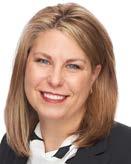

lated to group terminations for employees 40 years of age and older and controls how and what you include in group releases to ensure protection against age discrimination claims. ERISA governs employee benefits, including retirement and health and welfare benefits. Moreover, because reductions in force typically impact employee benefits considerations, including COBRA, vacation payout, retirement benefits, etc., planning beyond the initial selection process is a critical part of the process. The reduction must be carefully reviewed and orchestrated to ensure that all earned and accrued benefits are not only paid out, but paid out according to the timeframes set forth by state and local laws, union contracts, and employee agreements. This includes ensuring that employees timely receive their final paycheck, commissions, and COBRA notices. Ensuring compliance alone is only one half of the mitigation equation. The second half of the equation is to develop strategies that help the affected workers become gainfully reemployed as quickly as possible. As a general rule, the more quickly an individual is reemployed, the less likely they are to sue. Mitigation strategies include offering alternative work assignments/transfers when available, job placement assistance, resume writing services, severance benefits
(that always include a release of claims), and voluntary buyout packages. Many states and counties have workforce development departments that can be leveraged as a resource to affected employees. Like selection criteria, there is no one fit for assistance mitigation strategies and many employers utilize a number of strategies all at once, depending upon the nature and scope of the reduction.
The most important takeaway when conducting a reduction in force is the importance of planning. Ensuring that neutral criteria are developed, that all wage and hour laws are followed, that appropriate WARN notices are issued, and that workers are given the tools to successfully move on from an organization is no small task. However, developing strategies before the reduction will save you years of future legal headaches.
US LAW SUMMER 2023 USLAW MAGAZINE 7
Julie Proscia is a partner in Amundsen Davis ’s Labor, Employment, Benefits and Immigration Service Group. Contact: jproscia@amundsendavislaw.com
Leveling the Playing Field

Achieving Some Tort Reform Across the United States
We are from Florida. Many of you are probably jealous of the natural beauty of our state, our low taxes, and the tweets which track the escapades from our most famous resident, “Florida Man.” But your jealousy was short-lived. You quickly fell out of love with Florida when you found yourself litigating personal injury claims here before March 24, 2023.
In those dark days, Florida was labeled a judicial hellhole. The rulings of our highest court, cozy undiscoverable relationships between plaintiff attorneys and treating physicians, medical funding companies and a growing number of mega-verdicts made Florida as undesirable as the business end of an alligator. Something had to be done. The state reached full crisis mode. Years of work was needed from a handful of stakeholders to level the playing field for all litigants in Florida and to return fairness to Florida’s courts. On March 24, 2023, with a quick signature from the governor, Florida experienced sweeping and possibly its most meaningful tort reform ever.
We participated in parts of the yearslong struggle to bring about these lasting and meaningful reforms and learned many lessons along the way. This article is not about tort reform in Florida. Rather, it is a blueprint for tort reform across the United
States based on our observations and from participating in the process.
We are not politicians. We learned this repeatedly throughout the process. So, the first step is assembling a good team. This should start years before the offensive. No single person can accomplish reforms on this scale alone, and the expertise of many different domains is helpful. The team should include a talented, seasoned, and well-respected individual or individuals who can navigate the halls of the legislature, read between the political lines and games, and steer the political ship. We were blessed with a tremendous pair of lobbyists who impressed us at every turn.
You’ll need a person capable of running a smart public relations campaign— who can get the word out about the cause and why it matters to the constituency, and someone who can serve as a spokesperson for the movement for the media is crucial.
Other crucial team members are an expert in campaign finance laws in your state and a talented fundraiser. Could forming a PAC be helpful to your cause? Also, who cares enough about this cause to contribute money to finance the efforts in the first place?
Subject matter experts (a/k/a civil defense attorneys) are a must. Attorneys
should not only have suggested language for legislation handy but also be able to explain to legislators, their staff, the media, and constituents why the law is flawed, how it impacts them, and how it should be changed. When you try to change the law— rest assured—the other side of the bar will be there. You should be too.
The final member of the team is the constituent. In our time in Florida’s Capitol, and later, in Washington, D.C., the buzzword is constituent. Legislators, true to their duty, want to know how the existing and proposed law will impact the constituent. Hearing it directly from those impacted is tremendously helpful. The other side will be prepared too. In Florida, we listened to opposition testimony from hundreds of people who felt the changes in the law would be harmful to their day in court or would deprive them of any recovery at all.
Be prepared to counter emotion with facts—hard data. We learned in addition to hearing from constituents directly, legislators also wanted concrete examples of how the existing law was inefficient and led to absurd results. In our experience, we were able to gather and provide the increase in per-mile costs of insurance, limited excess insurance availability, insurance carriers
8 SUMMER 2023 USLAW MAGAZINE US LAW
Kyle Weaver and Christopher Barkas Carr Allison
that pulled out of the market entirely, and other real-world examples any person could look at and say “hey, that’s not right!”
A united front is also tremendously helpful. Make friends. Fast. The other side will be united and prepared with a big war chest to fight you. After all, the trial bar is fighting for their livelihoods and boy, they will fight. If your ideas are supported by other business interest groups, think tanks, and are broad enough to garner support from other industries, you’re on the right path. It’s important to remember the narrower the issues you present to the legislature, the more you are on a very small island surrounded by sharks. You will not get everything you ask for, and the amendment process may leave you worse off than when you started if you are not careful. What issues are really causing heartburn in your state? They should not be trucking specific, retail specific, etc. The more groups the bill can benefit, the better.
The legislative session will move fast. The real work in getting the team together, going over the ideas and getting feedback on what is feasible, assembling a united front, finding a bill sponsor, and educating other legislators and their staff begins long before the bill is enrolled. The time to figure out your message and for constituents
to explain their pain is not the few days (or hours) the bill lives in the limelight. We suggest having weekly or bi-monthly calls for the months leading up to your legislative session with all involved. Cliché as it may be—communication and coordination are key.
When the show starts, ensure your people are in town and can be ready to react instantly. Those who will be the face of these bills need to know what they will say when called, with the lights on and cameras rolling. Rehearse their testimony, but not to the point of being a robot. Speak, don’t drone. Look around and make eye contact. Be passionate, but don’t bang your hand, raise your voice, or ever lose sight of the fact that the speaker is the face and voice of the movement. A lot of effort and credibility can be burned by an unprepared or overly impassioned person at the lectern. We watched it happen more than once.
In sum, it’s a new day in Florida. Our courts will wrestle with what the changes mean for years to come. We still have other issues to address, too. So, the work goes on. We will continue our efforts to level the playing field here. If we ever make it to level ground, we’ll work to maintain it. We are not politicians, but these were our takeaways from our time participating in the political process. The real experts, our

aces in Florida the last several years, were Alix Miller, Ph.D., president and CEO of the Florida Trucking Association, and Chris Dudley of The Southern Group. They are two people you should know. We hope our observations will serve as guideposts for tort reform across the nation so all parties can have a fair day in court.
Kyle Weaver is a shareholder in Carr Allison’s Tallahassee, Florida office. His practice is dedicated to the defense of transportation claims across Florida, Georgia, and Alabama. Kyle graduated from Florida State University and Cumberland School of Law (AL).
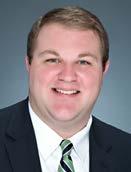
Christopher Barkas is a shareholder in Carr Allison’s Tallahassee, Florida office. His career began as a prosecutor in Miami, Florida. He now defends transportation, employment, products liability, and retail claims. He graduated from Florida State University and Cumberland School of Law (AL).
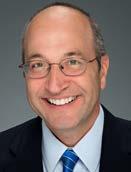
US LAW SUMMER 2023 USLAW MAGAZINE 9
Moving Toward a Cohesive COVID Court System?
An Analysis of Federal Jurisdiction of Personal Injury Claims Arising Out of the Pandemic
A host of tort lawsuits filed over the past few years involving nursing homes and patients’ allegations that they contracted COVID-19 due to the nursing homes’ negligence provides an opportunity for national and multi-state employers to analyze and prepare for how to respond to future tort claims arising from the COVID-19 pandemic and its aftermath.
In a blow to the healthcare employer industry, the U.S. Supreme Court in November 2022 declined to hear California nursing home Glenhaven Healthcare’s appeal of the Ninth Circuit Court of Appeals’ ruling denying Glenhaven’s bid to remove to federal court a wrongful death lawsuit filed by one of its patients in 2020. Attorneys on behalf of the estate of Ricardo Saldana, a Glenhaven resident who died of COVID-19 in May 2020, filed the lawsuit in California state court, alleging that Glenhaven did not provide proper personal protective equipment to employees and did not identify or isolate workers or residents who had or were suspected of having COVID-19. (Similar lawsuits across the
country have alleged the failure to enforce social distancing, implement and/or follow proper infection protocols and guidelines, and effectively train employees to take precautions to prevent the spread of the virus). In response, Glenhaven removed the case from state to federal court, but the U.S. District Court for the Central District of California remanded the case back to state court in October 2020. Glenhaven then appealed to the Ninth Circuit.
Crucially, the Ninth Circuit upheld the remand even though Saldana had pled a claim for Glenhaven’s willful misconduct, a claim which the Third Circuit Court of Appeals in 2021 held provided an exclusive federal cause of action (i.e., could not be litigated in state court). Such claims for willful misconduct were specifically mentioned in the Public Readiness and Emergency Preparedness (PREP) Act, which was originally signed into law in 2005 to encourage the rapid production of vaccines in the midst of a public health emergency. [Previously, plaintiffs would often intentionally decline to make claims for willful
misconduct, reasoning that courts would grant defendants’ removals to federal court based solely on the inclusion of those claims].

Saldana v. Glenhaven hinged entirely on the scope of the PREP Act. Importantly, the Act provides—or arguably provides—immunity from tort liability for certain types of employers during a public health emergency. Within the context of the COVID19 pandemic, some courts have found companies to be protected under PREP if they were engaged in providing “countermeasures” to fight the pandemic, such as using personal protective equipment in their businesses, implementing reliable COVID-19 tests, or administering vaccines. Notably, the Office of General Counsel of the Department of Health & Human Services has issued several advisory opinions stating that the PREP Act is a complete preemption statute and that nursing homes are specifically entitled to its protection if they provide covered countermeasures.
Ever since the PREP Act was signed into law in 2005, but especially since the
10 SUMMER 2023 USLAW MAGAZINE US LAW
Brendan T. Vandor Williams Kastner
COVID-19 outbreak, employers such as Glenhaven have sought to remove to federal court any tort claims that arguably are covered under the Act, arguing that a state court does not have jurisdiction to decide such federal questions. Now, following the Supreme Court’s refusal to hear the Saldana v. Glenhaven case, it is likely that many more of these types of tort claims will stay in state court—particularly in those states within the Ninth Circuit’s jurisdiction.
By no means, however, does this represent the end of the story. Currently, the Second, Third, Fifth, Seventh and Eleventh Circuits have either recently considered or are going to consider the same issue of whether personal injury, wrongful death, and other negligence suits filed in state court can be removed to federal court if they involve alleged harms ostensibly protected under the PREP Act. Depending on the facts of the specific case, the U.S. Supreme Court could very well agree to take up the issue and hear one of these cases, particularly considering the wide-ranging
implications of limiting or broadening an employer’s remedy of seeking federal court jurisdiction in response to state tort claims arising out of the COVID-19 pandemic. Employers, then, should take heart that there is currently no Supreme Court precedent on the issue, and the right case may still be out there. Similarly, until the remaining circuits (i.e., besides the Third and Ninth circuits) consider the question and issue their decisions, plaintiffs in these jurisdictions are stuck with the conflicting Third and Ninth Circuit decisions and may be hesitant to bring claims that could result in preemption or removal on PREP Act grounds.

Finally, companies with some plausible connection to healthcare and/or public health and safety—such as trucking companies engaged in transporting materials necessary to fight the COVID-19 pandemic, which can arguably be construed as “countermeasures” under PREP—should consider thinking outside the box when confronted with claims filed in state court for personal injury or wrongful death aris-
ing out of acts that occurred during the pandemic (roughly 2020 through 2022). In the context discussed in this article, they should consider seeking protection under the PREP Act via removal to federal court, at least until a uniform national precedent has been established. Before doing so, of course, a thorough analysis of the facts of the case, the specific claims being pled, and the potential establishment of negative precedent should be carefully considered with the assistance of legal counsel.
Brendan Vandor is a general litigation partner at Williams Kastner in Seattle, Washington. He has participated in several high-exposure trials in the transportation personal injury context and serves a primary role on Williams Kastner’s rapid response transportation team.

US LAW SUMMER 2023 USLAW MAGAZINE 11
LIGHTS! CAMERA! ACTION!
Shareholder Meetings Enter the Modern Age

The COVID-19 pandemic has had a profound impact on American society and the global economy. The crisis brought on new developments and accelerated technological innovations. Organizations have been at the forefront of these changes, especially as entities evaluate corporate governance requirements and the manner in which business is conducted with the public.
Most state corporate statutes require corporations to conduct an “annual” meeting and meetings that may otherwise be required to approve corporate actions. One of the primary agenda items is often the election of directors by the shareholders. Annual meetings also often address shareholder approval for amending corporate governance documents, including the cer-
tificate of incorporation or bylaws; approving material changes or transactions such as a merger, acquisition, dissolution or sale of substantial assets; or approving a guarantee of debts not otherwise in furtherance of the corporation’s purpose.
As individuals and businesses increasingly turned out of necessity to electronic meeting platforms to conduct business and participate in “virtual” face-to-face remote meetings, many state legislatures took note.
As a result, in the context of corporate governance, multiple jurisdictions amended applicable corporate laws to more specifically and broadly permit remote shareholder meetings, including allowing the use of electronic meeting platforms. Corporate attorneys, general counsel and commercial
litigators should take note of these developments.
While initially these statutor y amendments permitted remote shareholder meetings during a declared “state of emergency,” such as the COVID-19 pandemic, given the rapid and widespread implementation of remote platforms, many jurisdictions have dropped the state of emergency requirement and now permit remote shareholder meetings to be held solely or in part by means of remote communication if the Board of the organization authorizes, secures and adopts guidelines and procedures that: (a) verify that each person participating remotely is a shareholder or a proxy of a shareholder; (b) provide each shareholder participating remotely with a
12 SUMMER 2023 USLAW MAGAZINE US LAW
John D. Cromie Connell Foley LLP
reasonable opportunity to participate in the meeting, including the ability to read or hear the proceedings, as well as to vote during same; and (c) make and maintain a record of any shareholder votes or other actions taken by remote communication at the meeting.
It should also be noted that today limited liability companies (“LLC”) constitute a significant percentage of business entities in the United States. While many recent statutory amendments to state corporate laws did not similarly address changes to the statutory provision governing LLCs, the following recommendations are designed to ensure that the protections outlined above are implemented for remote corporate shareholder meetings will also apply to LLCs. Similarly, the guidelines for remote shareholder meetings are arguably equally applicable to directors’ meetings which are also authorized by state statute and bylaws provisions.
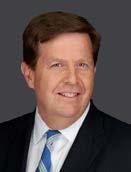
VERIFICATION
Verifying that each remote participant is a shareholder or a proxyholder in the Company and tracking each shareholder or proxyholder’s vote can be a challenge. Often, public corporations that hold virtual-only shareholder meetings delegate this process to a third-party service provider to facilitate the meeting through a dedicated virtual annual meeting platform (e.g., Broadridge) (as opposed to a simple livestream). For both public and nonpublic companies, virtual meeting platforms should allow virtual attendees to verify their identities so that they can be counted toward a quorum and actions requiring a vote, as well as to ask questions and participate during the meeting.
Shareholder verification typically occurs by including a unique code in each shareholder’s proxy materials or a meeting link that he or she can use to log in to the meeting website. If a shareholder casts a vote during the meeting, the unique code allows the proxy solicitor to ensure that the shareholder’s proxy, if one was submitted, is replaced by the shareholder’s vote cast during the meeting. As a practical matter, companies should conduct a dry run of the virtual meeting with its virtual meeting platform provider to avoid and minimize issues.
PARTICIPATION GUIDELINES
Companies also have an obligation to provide clear and complete directions to their shareholders on how they can participate in shareholder meetings. It is critically important that companies electing to hold virtual shareholder meetings address the
following issues:
1. Provide shareholders with complete, clear and detailed instructions on how they can attend the meeting and vote both prior to and at the meeting.
2. Prepare all instructions in a clear and unambiguous manner.
3. Display all instructions in a prominent and easily accessible location.
4. Where applicable, distinguish and explain different procedures for shareholders of record and shareholders holding shares as beneficial holders.
5. Where applicable, describe whether and why a shareholder must obtain and/or provide additional information to the corporation, including, without limitation, a legal proxy in advance of the meeting and how to do so.
6. Confirm whether attendance at the meeting is limited solely to shareholders or is open to both the shareholders and guests.
7. Adopt guidelines for online participation in shareholder meetings. These guidelines for online participation should be shared in advance of and during the meeting.
8. Establish procedures to validate online meeting participants as shareholders.
9. Establish procedures for shareholders to vote remotely and to record such votes properly.
10. Establish guidelines for questions from shareholders who intend to participate online. For example, it is advisable to develop procedures for posting all questions in advance of the meeting and for allowing shareholders to communicate before the meeting to indicate they wish to ask a question or make a statement.
Similarly, corporations should provide specific and reasonable time guidelines for posing questions to management. As important, these should delineate specific and reasonable guidelines for the display of questions and answers to avoid the potential for misuse of how questions are filtered, organized, displayed or answered.
To address these concerns, the company should consider displaying all reasonable questions asked during a meeting; provided, however, that malicious or frivolous questions are excluded at the discretion of the company. Companies should also consider organizing and answering questions based on groupings of related questions or organizing and answering questions based on the time that each question is submitted. When a hybrid meeting format is utilized, companies should con-
sider alternating questions that are posed in person, over the telephone and via the internet. Consideration should also be given to establishing procedures for questions received during the meeting but not answered during the meeting as well as to establishing procedures to allow a shareholder to revoke or re-frame a question.
MEETING RECORDATION
It is critically important that corporations utilizing remote platforms for shareholder meetings also implement policies and procedures to archive the meeting on a publicly available website for a specific and reasonable period of time. These procedures should address, among other issues, how long the record will be maintained, whether to record executive sessions and the impact, if any, on any decisions or votes taken if all or a portion of the recordation is subsequently lost. Companies should also consider the need to mute disruptive participants who cause or induce interference at a meeting. It is also important for corporations to establish procedures to allow for the posting of questions and answers after the meeting is concluded. Corporations should also reserve the right, subject to statutory requirements, to make a decision to cease recording a meeting at any point.
The use of remote meeting and election meeting platforms to conduct shareholder (as well as member and director) meetings will likely continue to grow. To protect the rights of shareholders, directors and other stakeholders, practitioners should be mindful of this trend and monitor applicable controlling state law, which continues to evolve with technology and the needs of society. Corporations should proactively adopt bylaw amendments to address the myriad of issues - - substantive and practical - - that are implicated by these changes. Commercial litigators should also take note of these developments and ensure participants comply with all procedural requirements. Traditional in-person meetings may never go away fully but are much more likely to be completed in a hybrid or remote format.
US LAW SUMMER 2023 USLAW MAGAZINE 13
John Cromie is a partner with Connell Foley LLP in New Jersey. He is Chair Emeritus of USLAW NETWORK, Inc. and Chair of Connelly Foley’s Corporate and Business Law Group.
CANNABIS INSURANCE Coverage and Considerations
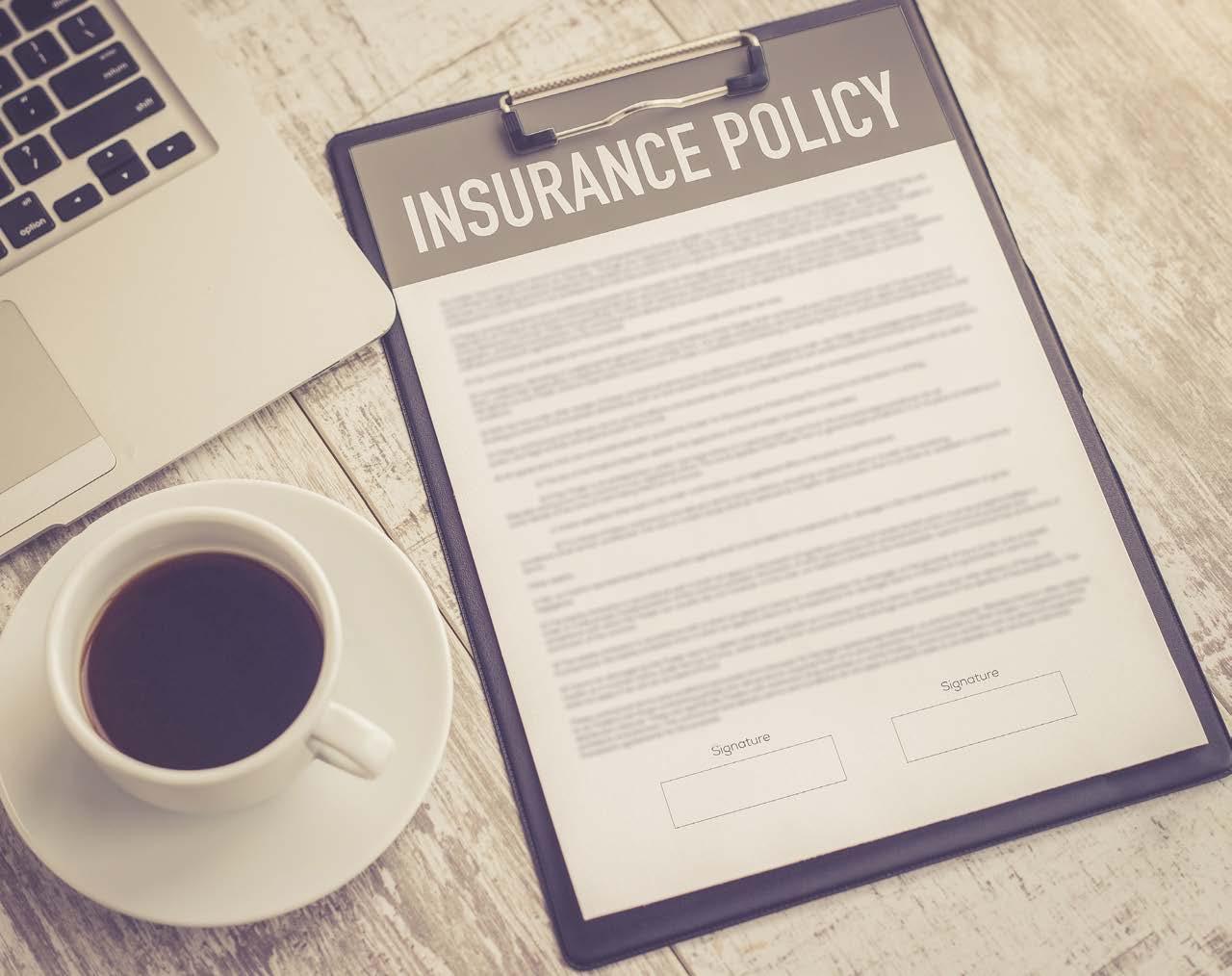
As more states legalize marijuana, new challenges arise for the insurance industry, and there are also risks unique to cannabis-related businesses. As a result, cannabis businesses would be smart to take a more proactive role when obtaining insurance coverage. This can be a difficult task depending on which state the business operates in. Some states, like California,
have numerous insurance carriers offering coverage for cannabis businesses; in other states, especially those where cannabis has been recently legalized, there is a lack of insurance carriers willing to offer coverage. In those states, cannabis businesses must rely on lesser-known insurers or insurance companies discovered through word-of-mouth. In addition, coverage may be extremely
limited, so companies must be extra careful when purchasing insurance.
Initially, cannabis businesses should consider retaining an experienced broker who knows the risks specific to cannabis businesses. Cultivators and growers may have different concerns than distributors and sellers, and an experienced broker can assist in choosing the specific coverages
14 SUMMER 2023 USLAW MAGAZINE US LAW
Elizabeth Dalberth Sweeney & Sheehan, P.C.
needed and what exclusions to look out for. Brokers may also service multiple states and have intimate knowledge of insurance companies and the types of insurance they carry, and they also may have pre-existing relationships with the carriers and their underwriting teams. It may also be beneficial to retain an insurance coverage attorney with experience in the cannabis industry, who can evaluate policy provisions and the initial insurance application.
There are numerous coverages that cannabis-related businesses should consider. These include coverage for general liability, professional liability, product liability, workers’ compensation, theft, cybersecurity, equipment failures, cargo, crop, recall and commercial automobile. Businesses should not cut corners when considering which lines to purchase because doing so could result in catastrophic losses, and businesses are better served by taking the time and spending the money to ensure their businesses are properly insured at the outset instead of risking an uninsured loss in the future.
One of the most important types of insurance to consider is cybersecurity insurance. Each state has strict regulations with regard to tracking cannabis from seed to sale. States utilize specific software tracking and require detailed record-keeping and reporting. Seed-to-sale operations offer many different entry points for possible hacking and cyberattacks, and such attacks result in significant costs to resolve. Cybersecurity insurance should cover incident response time, data breach notification services, privacy breach containment and data restoration, and can mitigate financial losses and reputational damages. Cannabis growers should consider cybersecurity insurance as well in order to limit access to their proprietary information. Sellers should likewise limit access to grower information. Cannabis businesses should also develop and implement an incident response plan, as a shorter response time will save on costs and also potentially save a business.
A related type of insurance to consider is coverage for theft. This is a common problem at dispensaries where theft can involve product and client information. Dispensaries use point-of-sale systems, which are targets for electronic theft of information, and employees have access to personal and financial data. A good broker should be able to negotiate a provision for theft and vandalism, which might have reduced coverage limits but could still protect against employee theft of client property, theft of money and theft of product. Also, employees should be vetted, trained and
closely supervised.
States are also reporting increased instances of theft, as cannabis sellers often have large amounts of cash and product on hand, making these businesses favorable targets for criminals to take advantage of. Underwriters will inquire about security on premises, including locks, storage protocols, and limited access to product and money. With regard to product during transport, cannabis businesses must be mindful that personal automobile insurance usually excludes coverage for “criminal activity,” and cannabis is still listed as an illegal Schedule I substance under the Controlled Substances Act. In addition, personal automobile policies do not cover cargo. Cannabis transporters should ensure they have a commercial automobile policy, only use company vehicles, make sure the vehicles are unmarked, and also consider insurance that covers cargo. Businesses should also take advantage of any seminars offered by law enforcement dealing with the security of cannabis businesses.
Another area of concern for cannabis businesses is coverage for business interruption and continuity of business. Cannabis businesses can suffer losses due to cyberattack shutdowns, fire losses, and expenses caused by having to temporarily relocate to new premises. Business interruption insurance will cover lost income caused by those losses. Similarly, growers and cultivators have concerns over crop loss; they should explore crop loss insurance that will offer protection against loss of crop due to hail, winds, freezing temperatures, drought and excessive humidity.
Concerning product liability, there has been an increase of lawsuits alleging bodily injury and even death due to mislabeled products. These cases typically allege that the THC content was much higher than what was set forth on the label. Product liability insurance would provide coverage for liability due to defective products, and protect both a grower and a seller. It should cover first-party claims, such as where a user claims the product made them ill, and even third-party claims, wherein the product causes physical injury to a third party. A broker should also explore coverage for defective product recalls.
A good broker can also navigate insurance coverage exclusions and ensure that there are no exclusions that could negate coverage. For example, many policies have exclusions for “criminal acts” which exclude coverage for claims based on theft. CGL policies could also contain endorsements and exclusions excluding coverage for cannabis-related activities, employee
dishonesty, violations of ordinances or laws, vandalism and fungus. Cannabis businesses must be mindful to thoroughly examine insurance policies to safeguard against perceived coverage where there is none, and this is an area where a company could benefit by retaining coverage counsel.
T here is pending, but apparently stalled, litigation that could alleviate insurers’ concerns in writing policies for cannabis businesses, called the Clarifying Law Around Insurance of Marijuana (CLAIM) Act, H.R. 2068, 117th Congress (20212022). The CLAIM Act was introduced in the House and referred to the House Committee on Financial Services in March 2021. Its purpose is “[t]o create a safe harbor for insurers engaging in the business of insurance in connection with a cannabis-related legitimate business . . .” It would apply to cannabis and cannabis products, including concentrates, edibles, tinctures, topicals and cannabis-infused products. It has a broad definition of “cannabis-related legitimate businesses,” including cultivators, producers, manufacturers, sellers, transporters, dispensaries and distributors. It also broadly applies to “the business of insurance . . . whether performed directly or indirectly.” It includes “the authorizing, processing, clearing, settling, billing, transmitting, delivering, instructing to be delivered, reconciling, collecting, or otherwise effectuating or facilitating of payments or funds” by a wide variety of means, including credit and debit cards, checks and electronic fund transfers. It prohibits a federal agency from prohibiting or penalizing an insurer for engaging in business with a cannabis-related legitimate business. It also prohibits a federal agency from recommending or encouraging an insurer not to engage in business with a policyholder solely because the policyholder is an owner, operator or employee of a cannabis-related legitimate business. This Act is still pending, but if passed, it should appease insurers’ fears about entering into the cannabis market, and will also broaden the opportunities for cannabis businesses in the search for insurance.
Elizabeth Dalberth of Sweeney & Sheehan, P.C. in Philadelphia practices cannabis law, employment, contracts, insurance, professional liability, personal injury and premises liability. She is a member of the Philadelphia Bar Association Cannabis Committee.

US LAW SUMMER 2023 USLAW MAGAZINE 15
“Pixels” and “Cookies,”
Charming Terms for Tracking Technology, Can Lead to Ugly Data Privacy Headaches
Molly Arranz and Sofia Valdivia Amundsen Davis LLC
Companies in all industries and of all sizes are evaluating sophisticated and useful technology for their websites and applications (their “apps”) in an effort to enhance and develop their image or brand and to support the marketing and sales of products or service offerings. Chief among them are tracking technologies, such as pixels and cookies, code that can be embedded in a company’s website, for instance. Historically, this tracking technology has been considered to collect de-identified data points about user behavior, such as where a person “clicks” on the website, what searches are being performed, and what kind of “traffic” certain offerings on the website get.
However, caution should be exercised when using these tools—advancing
at a lightning pace—because they sit at the heart of an emerging area of data privacy litigation.
SOME BACKGROUND
When you visit a company website, it is now commonplace to see a “cookie pop-up” asking you what kinds of cookies you will accept during your visit. There are lesser-known kinds of tracking technology offerings, such as pixels, that can be running on a company’s website as well. Tracking pixels are code snippets embedded on a website, which are nearly invisible on the website but contain a “tag” that tracks user behavior.
Is this tracking technology capturing website visitors’ names, addresses, emails,
phone numbers or any sort of traditional “personally identifiable information?” No. Instead, the substantive data points captured, recorded and potentially shared with third parties are mouse clicks, navigation through webpages, time spent on certain webpages, and perhaps searches conducted on a webpage. And, yet, these seemingly anonymized and de-identified activities in combination with antiquated statutes, such as the federal Wiretapping Act, have fueled privacy class action litigation as of late.
Companies should remain vigilant as to how advancements in technology and software applications intersect with the potential consent and disclosure requirements of older statutes and current privacy regulations because, otherwise, businesses
16 SUMMER 2023 USLAW MAGAZINE US LAW
may find themselves unwittingly subject to this emerging area of data privacy and consumer privacy litigation.
SESSION REPLAY TOOLS
Take, for instance, a tracking technology known as “session replay.” This technology offering can help a company review and then analyze what website visitors do when they navigate across webpages. Session replay tools visually recreate user moves and mouse clicks, providing valuable insight to multiple teams across a company’s organization. This helpful and seemingly-privacy-neutral technology has prompted allegations, in recent consumer class actions, that companies using this technology are illegally wiretapping visitors to the website.
Plaintiffs claim that session replay tools are improperly “recording their interactions” on a company’s website without the requisite consent. Notably, the states where these cases are pending are each “all-party consent” states, meaning that explicit consent is required from both parties prior to “recording” communications and interactions. This is why consumers are made aware of phone calls being on a recorded line when a company is contacted for customer support, for example. Now, through creative pleading, consumers are alleging a failure to obtain this same consent for the “monitoring” or “recording” via this tracking technology.
Notably, as of this summer, federal district court judges in Delaware and Florida have dismissed these session replay lawsuits. A Delaware federal court found that there was no injury or invasion of privacy because the sessions were only tracking consumer behavior. There was no injury, in fact, if plaintiffs cannot claim that companies are obtaining personal information or attempting to monetize the information collected. However, plaintiffs have also had some recent wins. Last year, the Third Circuit found that the transfer of consumer data from a business’s website to its service providers, through session replay tools, was an “interception” under Pennsylvania’s state wiretapping law. And the Ninth Circuit held that businesses must obtain prior express consent from users for their use of session replay software under the California Invasion of Privacy Act. Of course, as many of the lawsuits concerning data privacy are still pending, the opinions in this area of law are still developing.
TRACKING PIXELS IN THE HEALTH CARE INDUSTRY
Tracking pixels, such as those offered by Meta (Facebook) and used in Google
Analytics, have also been under fire recently. Like session replay tools, these pixels track user behavior, site conversions, web traffic, and other metrics. This information can help businesses deliver a better website user experience, showcase relevant advertisements, and identify unnecessary costs in marketing campaigns. While the use of these pixels is not new, the litigation surrounding them is, and healthcare providers and health-related entities that use these pixels may find themselves litigating on a new front.
Specifically, consumer privacy class actions, filed in both federal and state courts, contain claims that healthcare entities that use tracking pixels to analyze page clicks and other consumer behaviors are collecting and disclosing personal health information (PHI) to third parties like Google and Meta. Plaintiffs are attempting to push the bounds of the historic understanding of covered entities’ disclosures of PHI. Like the session replay litigation, in these lawsuits, plaintiffs claim violations of federal and state wiretapping laws, invasion of privacy, and breach of certain duties, amongst other claims. While the health care industry is the current target for tracking pixel allegations, the breadth of this litigation may be expanding. Just this past summer, retailers, companies in the finance industry, and entertainment providers have faced lawsuits regarding their use of tracking technologies.
WHAT THIS MEANS FOR YOUR BUSINESS
The vast uncertainty around the merit to these consumer claims based upon tracking technology translates into the very real chance of future class action lawsuits based on these purported “invasions of privacy.” This also means the extent of exposure is unknown; it may be significant, especially since the federal Wiretap Act has a substantial statutory amount recoverable for violations. These lawsuits should prompt you to gain a deeper understanding about the tracking technology you use and what is provided by your third-party service providers. Specifically:
1. Have regular discussions with your marketing team on what tools they are using to measure consumer engagement. A great team will continue to take advantage of new technology and analytic tools to grow your business. But as technology continues to advance, so does the legal landscape surrounding this technology. It is important to have ongoing discussions with your various internal teams to
ensure that you are aware of not only what tools they are using, but how, in order to assess which outward-facing disclosures need to be made.
2. Routinely assess how your company collects and uses the data it collects. What often makes data privacy tricky to navigate is that there is no one size fits all approach when it comes to compliance efforts. Your obligations for disclosures to website visitors, consumers and even your business partners will depend on a variety of factors, including from where the data is coming, how it is being collected, and what is being collected. And, as recent privacy class action lawsuits have taught us, the laws and legal recommendations are only continuing to emerge and evolve. Businesses need to have a comprehensive understanding of what data they actually take-in or collect and how it is being used in order to ensure proper consent gathering and privacy disclosures.
3. Evaluate other data privacy “risks”i.e. your data security structure and practices. These lawsuits are brought against a backdrop of growing concern over whether companies are appropriately analyzing, identifying and minimizing their data privacy risks. While you evaluate the consumer consent gathering and disclosures on the frontend, take time to review and audit your compliance with your cybersecurity and data protection obligations. Now is the time to update and likely upgrade your internal policies, practices and training for data collection, protection and sharing.
Molly Arranz is the chair of Amundsen Davis ’s Cybersecurity & Data Privacy Service Group and a partner in the firm’s Chicago office. Contact: marranz@amundsendavislaw.com
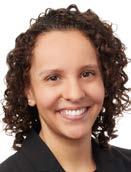
Sofia Valdivia is an associate in Amundsen Davis’s Cybersecurity & Data Privacy Service Group. Contact: svaldivia@amundsendavislaw.com

US LAW SUMMER 2023 USLAW MAGAZINE 17
AI Adoption Poses LegalPrivacy, Pitfalls
Artificial Intelligence (AI) is a new technology that enables machines to perform tasks with human-like intelligence. Among the various AI programs that are available, ChatGPT is widely considered to be the most popular. For a relatively small fee, the program can answer questions and assist with tasks such as writing code, composing text and even creating works of art.
To use ChatGPT, the user enters a prompt in a text bar, such as a question or command, and the program provides a relevant and meaningful response. The program also has the capacity to analyze and interpret large amounts of data. This makes it a powerful tool for companies across industries to improve their operations and processes.
But with new technology comes new concerns of data privacy and security along with questions about how AI data should be preserved and used in litigation.
Importantly, ChatGPT and other AI programs are not confidential. AI data, including prompts, are stored in a digital library and used to generate automated responses to other users’ inquiries. Furthermore, it is unclear exactly who has access to the digital library and whether that information and data can be accessed or sold to third-party developers or adver-
tisers. This is the major concern for companies that input sensitive business or customer information into the programs.
AI programs are also vulnerable to cyberattacks, just like most other online platforms. On March 20, 2023, OpenAI, the developer of ChatGPT, reported that they found a bug in the program’s source code that allowed users to view the chat history of active users. While they were fixing this problem, they discovered another issue with their server that exposed some users’ personal information, including first and last names, email addresses, credit card types, and the last four digits of their credit cards. OpenAI fixed the issue shortly after it was discovered, but the damage was done.

It should also be noted that information generated by an AI program is not always accurate. OpenAI admits that the technology is still in a research phase and can produce wrong information. There have even been lawsuits brought over the inaccuracies generated by AI, including a defamation lawsuit brought by a government official as a result of ChatGPT providing inaccurate information about that person, and copyright infringement lawsuits over AI programs using copyrighted material in its training data.
Given these security and accuracy con-
cerns, many companies are implementing policies governing how their employees use AI programs. For example, some companies have established guidelines for employees to follow when using AI in order to ensure that no sensitive company or customer information is entered. And companies are monitoring their employees’ use of AI programs to ensure that they are being used in a safe and confidential manner. Some companies are restricting employee use of AI altogether. Companies are also raising cybersecurity awareness. The goal of these policies is to minimize the potential risks associated with AI and to maintain control over how the technology is used.
Another issue that arises with AI technology is how it plays out in litigation. Since AI is such a novel and quickly emerging industry, there appear to be no published court opinions regarding disclosure of AI data. Generally, in discovery, documents and electronically stored information (ESI) must be turned over if it is relevant and proportional to the needs of the case. Information entered into and generated by AI is likely to be considered ESI and subject to disclosure. Accordingly, users must be careful and calculated when using an AI program as the data may ultimately be turned over to an adversary in litigation and
18 SUMMER 2023 USLAW MAGAZINE US LAW
Daniel E. Furshpan and Ibtidanoor Rahman Rivkin Radler LLP
have unintended, adverse consequences.
Admissibility of AI data in a trial setting presents another challenge. The trial judge serves as the gatekeeper, responsible for evaluating the admissibility of evidence, including ESI, and deciding whether the jury should be allowed to hear it. Courts consider the validity, authenticity and trustworthiness of ESI when deciding whether to admit it as evidence. In that respect, proponents of AI evidence at trial need to establish that it is authentic; for instance, does the AI program that generated the evidence produce the result that its proponent claims it does?
There are possibly endless challenges to the validity of data produced by an AI program. The program could have been designed with a bias; the people who were trained to use the program may not be properly qualified; the AI may not have been properly tested. Additionally, given the complex nature of AI technology, jury confusion is another factor that is considered. Lawyers who intend to offer, or challenge, AI evidence need to do the necessary work to explain how the AI system functions, how it produces its output, and how that output is relevant to the case.

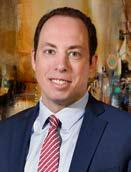
Even further, the intentional or even inadvertent deletion of AI data could lead
to spoliation sanctions. Spoliation is the destruction or alteration of evidence that could be relevant to a dispute. Penalties for spoliation include monetary fines, evidence preclusion, a negative inference instruction, or even struck pleadings. Deleting a chat history or enabling an automated deletion process after litigation is commenced could be considered destruction of ESI, even if accidental. As an example, in Meta Platforms, Inc. v. Brandtotal Ltd., No. 20-cv07182-JCS (N.D. Cal. May 27, 2022), a magistrate judge granted the plaintiff’s motion for sanctions due to the defendant’s failure to preserve relevant data. The defendant in the case used a logger tool to track the operation of its software products. Testimony revealed that relevant data was stored in the logger tool but was lost due to an automated deletion process. Although the defendant’s actions were not intentional, the court granted the plaintiff’s motion for discovery-related sanctions because the defendant failed to preserve the relevant data, and the data could not be duplicated or replaced.
To summarize, while AI technology can be very beneficial to companies in terms of efficiency and cost savings, it is important for organizations to be aware of the privacy risks that come with its use, especially as it
pertains to the handling and protection of sensitive information. Organizations should stay up to date with data privacy regulations and best practices for data security to ensure they are safeguarding sensitive company and customer information. Additionally, AI technology will inevitably be used in litigation, and it is necessary for companies and attorneys alike to stay abreast of new rules and court decisions governing the disclosure and admissibility of AI data.

US LAW SUMMER 2023 USLAW MAGAZINE 19
Daniel E. Furshpan is a partner in Rivkin Radler’s Critical Incident Response, General Liability and Medical Malpractice Defense practices. He can be reached at (516) 357-3436 or Daniel. Furshpan@rivkin.com.
Ibtidanoor Rahman is a summer intern at Rivkin Radler.
A Premises Liability Case Study Baker o/b/o Balam v. TJ Inc. d/b/a Beauty Land Beauty Supply
On April 6, 2018, Doris Balam fell inside the Beauty Land Beauty Supply store in Hattiesburg, Mississippi. The store is owned and operated by TJ Inc. In May 2020, Ms. Balam passed away from unrelated causes. On June 8, 2020, her daughter, Evelyn Baker, filed a lawsuit against TJ Inc. The case went to trial on March 14, 2023. This
case illustrates many legal and factual issues in a typical premises liability case.
THE LAW
Premises liability is the subset of negligence law. It applies to claims arising from injuries suffered on someone else’s property (i.e., premises) because of the property
owner’s alleged failure to keep the property safe. The classic example of a premises liability claim is a slip/trip-and-fall claim. Many states also allow premises liability claims arising from other types of incidents, such as construction accidents and assaults by third parties.
Under Mississippi law, the property
20 SUMMER 2023 USLAW MAGAZINE US LAW
Nicholas K. Thompson Copeland Cook Taylor & Bush, P.A
owner’s duty depends on the claimant’s “status.” There are three statuses. An invitee enters the property at the owner’s invitation for their mutual advantage. The classic example of an invitee is a customer in a store. A licensee enters the property with the owner’s license or implied permission for the licensee’s own convenience, pleasure, or benefit. The classic example of a licensee is a “social guest” in someone else’s home. A trespasser enters the premises without any invitation or permission. Many states have the same or similar “status” distinctions in their premises liability case law.
The property owner only owes licensees and trespassers the duty not to injure them willfully or wantonly. Most premises liability lawsuits are filed by invitees. The owner (or operator or person in charge) of the property owes a duty to invitees to exercise reasonable care to maintain the premises in a reasonably safe condition and warn of hidden dangers the owner knows or should have known. But property owners are not absolute insurers against all injuries of their invitees. Merely proving that an incident or injury occurred is not sufficient to prove liability. Instead, the plaintiff must prove that the property owner was negligent.
First, the plaintiff must show that a “dangerous condition” existed on the property, and that condition must be specifically identified. The property owner cannot be found liable if no “dangerous condition” existed or if the plaintiff cannot or does not identify the “dangerous condition” that caused the incident. And the existence of a “dangerous condition” cannot be shown merely because an incident or injury occurred.
In Mississippi, “normally encountered dangers,” such as sidewalks, curbs, and steps, are not dangerous conditions as a matter of law. The courts consistently hold that pathways do not become dangerous conditions simply because they contain minor imperfections or defects. In other words, the existence of slight variations in walkways does not constitute a dangerous condition. Many states have similar rules.
If a “dangerous condition” is shown, then the plaintiff may succeed by proving one of three available theories of liability. First, the plaintiff may show that the property owner caused or created the dangerous condition. Second, the plaintiff may show that the property owner had actual knowledge of the dangerous condition before the incident but failed to remedy or warn of it. Or third, the plaintiff may show that the dangerous condition existed for a sufficient length of time before the incident that the property owner can be imputed with con-
structive knowledge of it (i.e., should have known about it).
Most premises liability cases are decided on the constructive-knowledge theory. But the courts will not indulge presumptions as to the length of time the dangerous condition existed. The plaintiff must present admissible evidence with specific proof of the actual length of time. Circumstantial evidence may be used to prove it, but it must create a legitimate inference that places the issue beyond conjecture.
The time lapse between the time of the incident and the time the store opened (or the time of the last inspection) does not establish the length of time a condition was present. It is just as logical to presume that the dangerous condition occurred one minute before the incident as it is to presume that it occurred one minute after the store opened or one minute after the last inspection.
THE BALAM CASE
Ms. Balam was a business invitee in TJ Inc.’s store on April 6, 2018. TJ Inc. owed her the duty to use reasonable care to keep the store in a reasonably safe condition and warn of hidden dangers that TJ Inc. knew or should have known. Ms. Baker’s complaint alleged that Ms. Balam tripped on a “hump” in the store carpet and that the hump was a “dangerous condition.”
Before trial, Ms. Baker testified during her deposition that Ms. Balam told her she had fallen on a “hole” or “dip” in the carpet. Ms. Baker’s premises expert, Lamar Hawkins, testified during his deposition that, in April 2022, he found a 3/8-inch-high hump in the store carpet. He opined that the hump violated the 2012 International Building Code, certain OSHA regulations, the NFPA Life Safety Code, and the National Safety Code. But he admitted that OSHA only applies to employees and that the City of Hattiesburg had not adopted the NFPA Life Safety Code or the National Safety Code.
Based on Mr. Hawkins’s admissions, TJ Inc. filed a motion to exclude his opinions about all authorities and codes other than the International Building Code. The court granted that motion and excluded all those opinions from the trial. Based on Ms. Baker’s testimony and Mr. Hawkins’s opinions, TJ Inc. also filed a summary-judgment motion. It argued that TJ Inc. Ms. Baker had not correctly identified the “dangerous condition” at issue since Ms. Balam said she fell on a “hole” or “dip” and not a hump. Also, even if it was a hump, a 3/8-inch-high hump was not a dangerous condition because it was just a “minor imperfection or
defect” in a pathway and a “slight variation” in a walkway. Inexplicably, the court denied that motion, so the case went to trial.
At trial, Mr. Hawkins testified that he found a 3/8-inch-high hump in the store carpet, which he stated was a violation of the 2012 International Building Code. Ms. Baker testified that she arrived at the store about 25 minutes after the fall, and Ms. Balam said she had tripped in a “hole” in the carpet, which Ms. Baker called a “dip.”
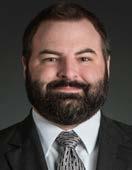
The co-owner of TJ Inc., Chin Yoon, testified that there were no humps or other dangers in the store carpet at the time Ms. Balam fell. She also testified that Ms. Balam fell in a different area of the store than Ms. Baker claims and that she tripped on her own foot. Two former store employees testified that Ms. Balam fell in a different area of the store than Ms. Baker claims and that, right after the fall, Ms. Balam told them her knee gave out on her.
None of Ms. Baker’s witnesses provided any evidence of how long the alleged carpet hump had existed. Chin Yoon testified that the store carpet was installed in January 2017, only 16 months prior to Ms. Balam’s fall. She testified that the store passed the city inspection before opening in January 2017 and that the store passed all the city inspections every year since then. She also testified that she and the store employees inspect and vacuum the carpet every day.
Ms. Baker’s medical expert, Dr. Howard Katz, testified about his April 2019 Independent Medical Evaluation of Ms. Balam and her injuries and medical treatment. Ms. Baker testified that Ms. Balam incurred $258,000 in medical bills from the fall. She asked the jury for $590,000 in compensatory damages.
After deliberating for 28 minutes, the jury returned a unanimous verdict in favor of TJ Inc. In the special verdict form, the first question the jury had to answer was whether the store carpet in the area where Ms. Balam fell was in a dangerous condition. The jury answered, “No.” The date of the verdict was March 15, 2023.
US LAW SUMMER 2023 USLAW MAGAZINE 21
Nicholas K. Thompson is a shareholder in Copeland Cook Taylor & Bush, P.A. He holds a Juris Doctorate and two bachelor’s degrees in philosophy and journalism. His law practice focuses primarily on insurance defense litigation, appeals, and estate planning and probate administration.
AI A Cautionary Tale for Non-Lawyers
Lately, it can be difficult to find common ground. Most of us, however, would agree with this: attorneys are expensive. Artificial intelligence systems such as ChatGPT and Google Bard, on the other hand, are free to use. It is no coincidence then that, since the emergence of AI, questions such as “how to draft a contract with AI” and “can AI prepare my will” are becoming commonplace. AI can be used to generate legal documents. But whether AIgenerated legal documents should be used is another matter entirely. For those seeking to utilize AI for the creation of legal documents like employment contracts, leases, and wills—proceed with caution. The risks associated with AI-generated legal documents may ultimately outweigh the benefits.
AI systems are power ful tools whose purpose appears limited only by human imagination. In short, AI systems employ algorithms to analyze information and identify patterns. AI systems “learn” from these patterns and subsequently draw upon that knowledge. Many consumers interpret the overwhelming amount of attention paid to AI as unconditional endorsement. Indeed, as some of the greatest minds of our generation implement AI across nearly every industry, it can be difficult to think of AI as anything other than an infallible marvel of technology. Someday, perhaps in the near future, AI may live up to these expectations.
As it stands, AI is a work in progress.
Above all else, AI is not an omnipotent intelligence. In order for AI to generate a document, a user must first communicate to the AI what type of document is needed and what information the document should contain. If the user’s communication is unclear, overbroad, or contains inaccurate information, the quality of the AI-generated document will suffer. The same holds true for legal documents. Users may simply lack the knowledge necessary to convey their legal needs fully or accurately to the AI, resulting in documents that do not adequately protect the user’s interests. For example, a user who asks an AI to generate a complaint for breach of contract may not be aware that other claims are also available to them. If these additional claims are not included in the AI-generated complaint, the user may lose the ability to assert these claims at a later date and could be unable to recover their damages. Unfortunately, users who lack the knowledge necessary to convey their legal needs fully or accurately to the AI will likely be unable to assess for themselves the suitability of the documents generated.
Currently, most AI-generated legal documents are overbroad, rudimentary, one-size-fits-all forms. For example, when asked to draft an employment contract, ChatGPT generated a one-page fill-in-theblank form that did little more than formal-

ize the employer-employee relationship. This form did not include provisions that prohibited employees from disclosing confidential information, that bestowed ownership of works created by the employee during their employment to the employer, that barred employees from working for a competitor, or that accounted for numerous other issues which might arise in a given context. Simple forms may suffice for some users; however, for many others, the failure to include adequate detail can result in significant harm. If, for instance, AI fails to include a non-compete agreement in a sales-driven startup’s employment contract, the startup may fail when it is unable to prevent its best salesperson from working with the local competition.
Contrar y to what some may believe, AI-generated legal documents do not necessarily comply with the law, nor do they ensure consumer compliance. There are laws at the local, state, and federal levels that, collectively, touch upon nearly every aspect of daily life. Similarities exist among the various laws; however, there are also significant differences in how laws are written, interpreted, and applied. The laws of two states may not govern a single matter in the same way. Different courts within a given state may issue contradictory opinions regarding the same issue. An administrative agency may interpret a law distinctly from how a United States District Court might.
S. Katie Calvert Quattlebaum, Grooms & Tull PLLC
22 SUMMER 2023 USLAW MAGAZINE US LAW
While AI may be able to identify differences in text, AI cannot employ reasoning and judgment in interpreting and applying the law to a specific set of facts as an attorney might. This, in turn, invites errors in AIgenerated legal documents.

As an example, a user may live in a state with laws very favorable to landlords. If the user—a landlord—requests that AI prepare a lease agreement with “standard terms” for property being leased in a second state, the AI-generated lease may contain terms that comply with the laws of the user’s state but violate the laws of the second state, which may have laws more favorable to tenants.
To further illustrate this point, consider a user who requests that AI generate a company timekeeping and overtime policy. Based on the user’s direction, the AI generates a policy that states employees may only clock in during their scheduled shift and that employees are to be paid for all onthe-clock work. Assume that some employees regularly perform work outside of their scheduled shift at their manager’s request, however. Pursuant to the company policy, these employees would not be paid for that work. Facially, nothing might appear to be wrong with the AI-generated policy, but the manner that the company policy is imple-
mented will almost certainly result in a lawsuit.
At this early stage, it is doubtful that AI can adequately perform due diligence. AI may be unable to access some court documents, cases, and other legal resources, including resources that are not electronically stored or are locked away behind paywalls. Companies that control certain legal resources, such as Westlaw and LexisNexis, have little incentive to provide outside AI with access to these resources. While AI may be able to quickly process a staggering amount of information, the lack of access to certain resources could result in problematic gaps in the AI’s knowledge. While a lack of knowledge is troublesome enough, AI may fill these gaps with false information. In fact, this recently happened to one New York attorney who is currently facing potential sanctions for filing an AIgenerated brief containing citations to fake cases. That attorney informed the court that he was “unaware that [ChatGPT’s] content could be false.”1
Finally, to be effective, some legal documents require additional human action. For example, in a majority of states, at least two witnesses must be present to observe a testator’s signature of a will to ensure au -

thenticity and to confirm the testator’s intentions. While this issue has not yet been addressed, AI almost certainly will not qualify as a witness; AI is currently incapable of fulfilling that role due, in part, to a lack of perception and conceptual reasoning. The intended heirs of testators who do not secure witnesses may later discover that they will not actually inherit what was promised them.
Certain AI systems may be free, but they are no substitute for an attorney. While some may be tempted to take advantage of AI-generated legal documents, such documents could end up costing much more than the amount which would have initially been spent in attorneys’ fees. If the ease of AI still seems an attractive alternative for document preparation, users should, at minimum, retain an attorney to conduct a review of AI-generated legal documents. AI may be impressive, but it will forever lack the human touch.
US LAW SUMMER 2023 USLAW MAGAZINE 23
S. Katie Calvert is an attorney at Quattlebaum, Grooms & Tull PLLC in Little Rock, Arkansas. Katie’s practice areas include Commercial Litigation, Class Action Defense, Employment Litigation, and Intellectual Property.
1 Kathryn Armstrong, ChatGPT: US lawyer admits using AI for case research, BBC News, https://www.bbc.com/news/ world-us-canada-65735769.
This article will briefly explore the current state of NIL and various considerations for businesses looking to enter name, image, and likeness deals with student-athletes.

BACKGROUND
In June 2021, the Supreme Court decided National Collegiate Athletic Association v. Alston, in a unanimous decision involving education-related payments to student-athletes under antitrust scrutiny. While the holding itself was narrowly tailored, the decision is widely regarded as foreshadowing negative rulings against the NCAA. That same year, individual states began passing laws giving collegiate student-athletes the framework to be compensated for their name, image, and likeness (“NIL”). In other words, student-athletes now have the ability to be compensated in areas such as advertisements, live appearances, social media posts, and signing autographs.
Name image and likeness
Business,legal,and fairnessconsiderations forcompanies engaginginNILdeals withstudent-athletes
Justin B. Jones Fee, Smith & Sharp LLP
CURRENT NIL STATE-BY-STATE PATCHWORK
Post-Alston, NIL is still at the forefront of college athletics. And Alston, in conjunction with the state law NIL patchwork that has proliferated in many states, has led to arguably the most dramatic legal shift in sports law since 1984 when the Supreme Court encountered antitrust in college football TV contracts in NCAA v. Board of Regents.
The current state-by-state NIL legal scheme is dramatically in flux. Some states, like Alabama, have decided to outright repeal their initial state law passed in 2021, while several others are changing their NIL law in dramatic ways. Many of the most recent legislative changes, such as the one that went into effect this July in Texas, are more lenient and broader, providing student-athletes with ideally better opportunities to capitalize on NIL. Some
commentators have suggested that these changes are leading to a race to the bottom where the most lenient and least restrictive NIL state law operates as the standard.
BUSINESS CONSIDERATIONS FOR A MULTIFACETED REGULATORY LANDSCAPE
For companies navigating NIL, the landscape is varied and complex. Compliance with current NCAA regulations, the current Interim NCAA NIL policy, state-specific NIL law, athletic conference guidelines, the school’s current contractual agreements, the school’s current honor code and institutional policies, and school-specific processes for reviewing and accepting NIL deals must be navigated in the current environment.
Moreover, the dealmaking climate can vary widely. For example, in Texas, using university institutional intellectual
24 SUMMER 2023 USLAW MAGAZINE US LAW
property in the NIL context was illegal until July 2023, whereas in Alabama, it is allowed with the permission of the university. Meanwhile, other states, such as South Dakota, have no NIL state law on the books. While some schools in Georgia can assist their student-athletes in working with businesses and aid them to some extent on appropriate terms and conditions, universities in other states cannot provide any help.
TERMS OF THE NIL DEAL
Given the above changing business dynamics, terms of NIL deals reportedly vary widely with little transparency to the public. Some athletic-focused websites like On3.com have started publishing purported NIL valuations, but almost all NIL contracts are not publicly disclosed and are shielded from disclosure by state open records privacy laws. As such, it can be difficult for businesses to gain a sense of the overall market and customary terms. Athletes have conveyed that, in response, some companies have taken the approach of utilizing boilerplate contracts to prevent term changes and standardize NIL deals.
WHO IS REPRESENTING THE STUDENT ATHLETE?
Meanwhile, a separate issue is the type of representation a business will face when negotiating an NIL deal. Certain athletes have legal representation, some athletes have “marketing representation,” and others conduct their NIL business without representation. Who may represent student-athletes is partially regulated on a state-by-state basis. In some states, student-athlete representatives follow a state-based Athlete Agent law requiring registration and bonding, while in other states, there are no such state law registration requirements. The bottom line is that prudent businesses that decide to negotiate NIL deals directly with student-athletes must potentially understand the student-athlete representation requirements in multiple jurisdictions, including but not limited to: (1) the state law of the NIL deal; (2) the state law where the university of the student-athlete is located; and (3) the student-athlete’s home state. Moreover, such an analysis of the student-athlete’s representation may need to be expanded to address more complicated legal issues like choice of law clauses and/or mandatory venue provisions included in the anticipated NIL contract.
FUNDAMENTAL FAIRNESS
One key but potentially overlooked aspect is fundamental fairness if the NIL deal was disclosed to the public, such as through litigation or voluntary disclosure by the student-athlete. The student-athlete may not have bargaining leverage or repre-
sentation, and should the deal go sideways after execution, negative public relations ramifications could outstrip any initial marketing gain for the company. So, unlike some business contracts where one party might cram down self-serving and/or onerous terms due to having more leverage, it could be the smart play for a business to consider dialing back extremely one-sided deal terms that could later be perceived as taking advantage of the student-athlete.
LENGTH AND SCOPE OF THE NIL DEAL
The length and scope of the deal are subject to the myriad of environmental parameters set forth above. Many state laws restrict the term length to when the student-athlete is enrolled at school. Contracts that purport to be “for life” or “in perpetuity” would likely run afoul of various state laws. Similarly, the subject matter of the NIL deal may be barred by state law restrictions, and many state NIL laws prohibit deals involving sin-tax topics such as alcohol, tobacco, or sports gambling. Finally, conventional nutsand-bolts consideration must be given to the nature of what is being asked in return from the athlete, whether those terms are clear, and the enforcement mechanisms available between the company and the athlete in the event of a breach.
COMPENSATION
The amount of monetar y compensation to the student-athlete is a separate and discreet issue. Several state laws assess compensation in “fair market value” terms. While such an ill-defined standard has yet to be interpreted by the courts, and current guidance from the NCAA is murky at best, the overarching public policy of states that have “fair market value” terminology is to try and distance NIL from explicit “pay-toplay.” In other words, certain actors like the NCAA are worried that an athlete could sign a $500,000 NIL deal to show up to a local campus car dealer for 15 minutes as a proxy for pay-to-play. In “fair market value” jurisdictions, the more significant the compensation or less significant the service(s) that the athlete is providing must be evaluated.
INSTITUTIONAL INTELLECTUAL PROPERTY
As noted above, not all states allow institutional intellectual property (such as a university logo or trademarked colors) to be utilized in an NIL deal. For example, a business may not be allowed to use a photo of the athlete and the university’s athletic marks in a social media campaign. In some states, university intellectual property is allowed with explicit permission from the university. Care must be taken to address the intellectual property nuances in such deals.
TEAM-WIDE DEALS
Recently, some businesses have garnered publicity and campus-wide goodwill by providing “team-wide” NIL deals to entire sports teams for a certain university, in some instances to both scholarship players and walk-ons. Such arrangements raise an issue as to whether “team-wide” NIL deals violate state law under state-specific pay-to-play provisions. Almost every state-specific NIL law makes it clear that “pay-to-play” is still illegal.
One criticism is that if the athletes are truly being compensated for their name, image, and likeness, a deal that provides equal compensation to everyone on the team (i.e., the star players down to the walk-on) is not representative of each individual athlete’s name, image, and likeness. Businesses must consider the ramifications if such contracts were declared to be in violation of NIL regulations.
COLLECTIVES
Moreover, the college sports landscape is now replete with “collectives,” a loosely defined term for groups purporting to aid players in monetizing NIL. While some collectives operate to gather deals and present them to athletes, businesses should stay abreast that both NCAA guidance and state law on collectives is in a state of rapid flux. If the law surrounding NIL is murky and fast-changing, the law on collectives is changing at hyper speed. One issue is that stakeholders are concerned that collectives are operating as a proxy for pay-to-play. Another issue is that collectives’ involvement in recruiting and impact on the proliferating transfer portal have placed collectives in the crosshairs of both the NCAA and several recent state NIL law amendments. Businesses that operate with collectives will need to stay abreast of these concerns.
THE FUTURE OF NIL
In short, the law on NIL is ever changing. While federal pre-emption involving NIL may eventually change the game, the bottom line is that businesses wishing to negotiate NIL deals with student-athletes have a multitude of issues to watch moving forward.
Justin B. Jones is a Partner at Fee, Smith & Sharp LLP in Dallas. He received a BBA in Marketing and a BBA in Management from Texas Tech University and a J.D. and Certificate in Sports Law from Tulane University. He can be reached at jjones@feesmith.com.

US LAW SUMMER 2023 USLAW MAGAZINE 25
Advances in Cell Phone Technology for Rapid Accident Responses



One of your tractor-trailers was just involved in a catastrophic accident in a remote area. Your driver needs immediate assistance. That driver is nervous, probably scared out of their mind, about to be interviewed by law enforcement, and will be taken for drug/alcohol testing. Law enforcement may already be in the process of moving the truck, the other vehicles or debris to get traffic moving. Statements, some possibly incriminating, are being taken. Witnesses are leaving the scene. Nearby surveillance videos are starting to roll over. One of the troopers involved in the acci-
dent has already sent a text message to a friend of his who practices personal injury law in the area, and potential plaintiff attorneys are already mobilizing to the scene. In short, time is of the essence, and you need someone with legal training to get out there, pronto.
You have a law firm’s rapid response team on call. That team has presumably trained to respond to accidents on a moment’s notice. They have training, gear, knowledge, experience, and hopefully the phone number of a few accident reconstructionists. Everything is in place to
snap into action in response to an urgent call regarding a serious accident. So, when that accident happens, you make the call, hoping to reach an attorney who can help the driver and preserve the evidence. But the call comes through, rings four (4) times and goes to voicemail. You wait a couple of minutes, knowing that time is of the essence and that your driver is sitting on the side of the road. Every second that goes by is another second with your driver alone on the scene, with evidence being altered or destroyed. You call again. Four (4) more rings to the silenced phone, and it goes straight
 Jake Pipinich and Charlie Schreck Pierce Couch Hendrickson Baysinger & Green, LLP
Jake Pipinich and Charlie Schreck Pierce Couch Hendrickson Baysinger & Green, LLP
26 SUMMER 2023 USLAW MAGAZINE US LAW
to voicemail. What are you supposed to do? You call the next firm in line. It goes to the firm who answered the call. If the carrier/ client and the attorney could have touched base quicker and more reliably via phone, this nightmare scenario could have been avoided. Putting some thought into your preparations now may help you avoid a similar scenario in the future.
With the advent of numerous “smart home” technologies, constant cell-phone notifications, calls, texts, alerts and other features that will “ping” a phone at night, many people silence their phones while they sleep. This is important for restful/ uninterrupted sleep, but also to maintain some sense of sanity. However, this presents a challenge for rapid-response attorneys, experts, adjusters, vendors and the like as someone must be available to take calls at odd hours and locations. Furthermore, people have lives. They go on vacation, consume alcohol, make plans and have other things that interfere with being able to field potential rapid response calls 24/7. There are alternatives (i.e., pagers, multiple phones, call schedules, “on call” weekends and other avenues to designate specific persons to answer calls), but these alternatives also have drawbacks: numerous additional devices, extensive planning and the reality that putting attorney or client cell-phone numbers on company websites further compromises any hope of privacy or work/life balance.
Technology has made advancements that may alleviate this problem and allow a group of select “rapid response” attorneys or a rapid-response team within a firm, company or organization to have a call system setup on a single phone that will prevent them from having to pass around numerous devices, develop call schedules or publish their personal phone number to the internet. iPhone 12 and later and most newer (2020 forward) Android-based phones have the ability to run dual-sim cards, essentially putting two separate phone lines into a single phone. There is a nominal cost with the provider/network, but the phone itself and its basic functions are identical to just one “personal” cell phone. When properly equipped, the phone will show two lines: a “primary” and “secondary” line. Several attorneys in a firm or a rapid response team within an organization can have these dual-sim, dual line phones and simply use the primary number as their personal cell-phone. The second line can then be used as a separate “rapid response” number that can be provided internally or to the internet/websites for calls designated as rapid response.
However, simply having a second line does not solve the problem of silencing the

phone during sleeping hours or making sure that calls are not missed, but recent technological advancements can help solve this problem as well. AT&T, for example, has a simple solution to this issue via call roll-over, which can easily be implemented between your designated rapid-response attorneys or agents. This process is called Conditional Call Forwarding and requires the use of CDMA (Code Division Multiple Access) Codes. These codes/protocols vary somewhat between providers but should be relatively easy to implement on modern phones. For an iPhone running on the AT&T Network, for example, you can select the designated rapid response line, and dial the following:
*61*the-number-to-be-forwarded-to# or *61*406-586-1588#
The 61 is the network command for call forwarding when a call remains unanswered. Check for a confirmation tone after entering the number, and if the forwarded party answers the forwarded call, the feature is activated. You can change the number of rings before a call is forwarded by entering *47 and following the prompts. When you hear a dial tone, enter 12 for 2 rings, 18 for 3 rings or 24 for 4 rings. There are numerous additional call features that fall under the Conditional Call Forwarding rubric that may assist with your unique needs.
For Android phones, from the home screen, go to the phone app itself, menu, settings, supplementary services and call forwarding. For unanswered calls (after selecting a number of rings), select the number you want the call forwarded to, or use similar CDMA codes such as those above (which vary by provider), but are very similar to the iPhone/ATT codes herein. Additionally, some Android phones use a “Call Assistant” number to complete Conditional Call Forwarding, where “Call Assistant” can be internally toggled to forward unanswered calls. These features vary via phone/provider but are easily setup via vendor for newer Android phones.
With these features enabled on a secondary line, the rapid-response designees within an organization no longer need multiple phones, pagers, schedules or otherwise. One initial point of contact can forward a call to a secondary, who can, in turn, forward to a third point of contact and so forth. This technology can work seamlessly with the user’s original primary line, and that person does not need to switch back and forth to have both a primary/personal line and a business/secondary line dedicated to rapid-response or critical work calls, which can then forward to a secondary user’s rapid-response or critical work
call line with no additional input from the end user. From a customer service perspective, when clients/carriers are calling for a rapid response, time is of the essence, and quickly deploying an attorney is critical. This technology helps to make sure that calls are routed within an organization to the correct people as promptly as possible.
Better yet, the secondar y or rapid response line can be left on during the night with the phone’s primary or personal line turned off and the “do not disturb” setting on the phone activated. This will mute any incoming personal calls, mute notifications, but still allow the phone to ring for a call placed to the rapid-response number. As such, a user can sleep without text/email notifications or calls to the personal line, but calls will still ring through to the rapid response line. Anyone wishing to receive personal calls to the primary number can leave that line turned on, or the rapid-response number can be given to important persons as an alternative in the event of an emergency.
Put together, this technology and programming essentially provides the user with the best of both worlds in having a single phone that can pass critical calls around within an organization and be partially silenced as necessary. We believe this technology will assist clients by providing superior customer service in the event that a rapid-response call is needed in, not only the transportation arena, but also across other practice groups/industries. Applied correctly, it should help you rest easier, knowing the lawyers who need to be there at the drop of a hat will pick up the call, thus avoiding the nightmare scenario discussed above.
Jake Pipinich is a partner with Pierce Couch Hendrickson Baysinger & Green, LLP in the Transportation/Logistics practice group and heads up the Rapid Accident Response Line. While not at work, Jake is happily married to Sarah Pipinich, and the pair raise backyard chickens and are avid lake boaters.
Charlie Schreck is a partner with Pierce Couch Hendrickson Baysinger & Green, LLP, a member of the Transportation/Logistics Practice Group and Rapid Response Team. While not at work, Charlie is happily married to Allyson Schreck and the pair are raising their two-year-old, Graham, and newborn, Jovie.
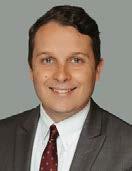
US LAW SUMMER 2023 USLAW MAGAZINE 27
Because of its tax benefits, the 1031 exchange is a popular transaction with securities issuers and investors. These transactions, however, are not without risk. This short article seeks to briefly describe these exchanges, the common pitfalls associated with them, and how to avoid these pitfalls.
BACKGROUND
What is a 1031 exchange, and why is it useful?
Internal Revenue Code Section 1031 allows taxpayers to defer capital gains taxes that would otherwise be owed on the sale of real property held for investment. In short, if the taxpayer sells real property (the “Relinquished Property”) that he or she is holding for investment purposes and rein-
Common Pitfalls of 1031 Exchanges
S. Berry Moran Reeves & Conn PC
vests the proceeds of that sale into new real property (the “Replacement Property”) for investment purposes, then the taxpayer will be treated for tax purposes as if they never sold the Relinquished Property. 1031 exchanges encourage liquidity in the marketplace by lowering barriers to entry for potential sellers.
Additionally, section 1031 can be an integral part of estate planning. Under current law, heirs who receive property following the passing of a decedent receive that property with a ‘stepped up’ basis for tax purposes. In other words, heirs are treated as if they purchased the property for fair market value as of the date the decedent passed. If the heir immediately sells the property for fair market value, they will not
owe any capital gains taxes. Any gains that accrued prior to the decedent’s passing remain untaxed. Many investors (particularly those with significant accrued gains associated with real property held for investment) utilize a series of 1031 exchanges to purchase more attractive real estate and diversify their portfolios over time while deferring tax liability.

What are the basic rules of 1031 exchanges?
The benefits of 1031 exchanges do not come without challenges – there are several strict rules that must be followed to successfully complete an exchange. The Replacement Property and Relinquished Property must be (i) of “like-kind” (i.e., of
Zachary
28 SUMMER 2023 USLAW MAGAZINE US LAW
the same character) and (ii) held for investment purposes. A taxpayer must also engage a qualified intermediary (also referred to as a “QI”) who holds proceeds from the sale of the Relinquished Property until the exchange is completed. The QI ensures that the taxpayer does not receive money or other property until the completion of the exchange, which would result in the taxpayer owing taxes based on the amount received. Taxpayers must comply with the strict timelines associated with 1031 exchanges: (i) the 45-day identification period and (ii) the 180-day exchange period. Taxpayers must identify their replacement property in accordance with one of three limiting rules: (i) the three-property rule that allows taxpayers to identify up to three potential Replacement Properties of any value, (ii) the two hundred-percent rule that allows taxpayers to identify any number of Replacement Properties so long as their cumulative value does not exceed two hundred percent of the value of the Relinquished Property, and (iii) the 95 percent rule that allows investors to identify any number of Replacement Properties so long as the taxpayer purchases at least 95 percent of the total value of the identified properties. Finally, taxpayers must reinvest the proceeds from sale of the Relinquished Property into the Replacement Property (i.e., the Replacement Property must be of equal or greater value than the Relinquished Property). In the event a portion of the proceeds are not reinvested into the Replacement Property, that portion will be subject to capital gains tax.
COMMON PITFALLS:
Many of the strict rules are less than intuitive, and their unforgiving nature often leads to missteps that can create tax liability. Some rules are more forgiving than others. For example, the failure to meet the strict deadlines referenced above or engage a QI will completely negate the ability to engage in a 1031 exchange. On the other hand, the receipt of other property (depending on the value of the property) and the failure to “replace debt” may result in taxes being owed on only a portion of the gain associated with the Relinquished Property.
Failure to meet the strict timelines
There are two main timelines associated with 1031 exchanges: (i) the 45-day identification period, and (ii) the 180day exchange period. Both the identification period and exchange period begin upon closing of the sale of Relinquished Property. These timelines are incredibly strict, and the IRS extremely rarely grants extensions (most extensions occur where there has been a state of emergency in
the locality of the Relinquished Property). Additionally, in order to qualify for the safe harbor contained in the regulations, QI arrangements are typically structured such that the taxpayer may not receive proceeds of the sale until the earliest of: (i) expiration of the 45-day identification period if the taxpayer does not identify potential Replacement Property, (ii) expiration of the 180-day exchange period if the taxpayer does not close on Replacement Property, or (iii) upon closing on the acquisition of Replacement Property. Reputable QIs will strictly follow these timelines, as failure to adhere to the timelines combined with a taxpayer’s assertion that they successfully completed the exchange could result in civil penalties or criminal liability for both the QI and taxpayer.
Receipt of “other property” on sale of relinquished property:
Perhaps one of the most common and often least intuitive missteps by taxpayers involves the receipt of “other property” from the sale of Relinquished Property. This sometimes occurs when the taxpayer receives a benefit or kickback in connection with the sale of Relinquished Property. However, this most often occurs where a portion of the purchase price paid to the taxpayer is in the form of a seller carryback note. A note issued in the name of a taxpayer is considered “other property” regardless of whether the taxpayer actually receives any payments under the note during the 180day exchange period. In order to avoid the receipt of “other property” in the exchange, any carryback financing note should be issued in the name of the QI for the benefit of the taxpayer. Any amounts paid under the note should be paid directly to the QI and will be included in the proceeds held by the QI to be used upon purchase of the Replacement Property. To the extent that the note remains unpaid upon closing on the purchase of Replacement Property, the taxpayer may purchase the note from the QI and use cash from purchase of the note to close on Replacement Property.
Failure to “replace debt” in the exchange
Most taxpayers have debt associated with their Relinquished Property. Under the terms of the financing documents, proceeds of the sale must be used to repay the loan secured by the Relinquished Property, and therefore, the QI will receive significantly less than the purchase price paid to the taxpayer. The value of the Replacement Property must still be equal to or greater than the value of the Relinquished Property. In other words, taxpayers must still replace the entire value of their Relinquished
Property and can accomplish that in one of two ways: (i) use all of the cash held by the QI and obtain a loan with an equal or greater principal balance, or (ii) use all of the cash held by the QI and contribute additional cash to close on the replacement property. Obtaining a loan to purchase the Replacement Property or bringing additional cash to the table is often referred to as “replacing debt” in an exchange.
Issues surrounding joint ownership of property
Finally, many taxpayers hope to use a 1031 exchange (or series thereof) to diversify their investment or to purchase larger, more sophisticated Replacement Properties. In other investments, investors achieve diversification and purchasing power by forming a partnership and pooling capital. While this would be ideal in exchange, the ability to pool capital is extremely limited – both interests in a partnership and securities do not qualify as “like-kind” Replacement Property in an exchange. There are only two ways for an individual to purchase an interest in jointly held property as a part of the individual’s 1031 exchange: (i) as part of a qualifying tenancy in common (see Rev. Proc. 2002-22), and (ii) as part of a qualifying Delaware statutory trust (see Rev. Rul. 2004-86). Following the collapse of the real estate market in 2008, lenders and other stakeholders quickly began to favor the Delaware statutory trust over TIC structures largely because of the trust’s centralized control. Relatedly, many investors prefer the ‘hands off’ nature of Delaware statutory trust investments as it allows investors to take a step back from day-to-day management.
CONCLUSION
Despite the strict rules associated with 1031 exchanges, they are an important tool to real estate investors. If contemplating an exchange, it is important to engage advisors such as accountants, attorneys, and financial advisors early and often to ensure that the exchange is not inadvertently blown.
Zach Berry is an associate on the commercial real estate and securities team at Moran Reeves & Conn PC. Zach’s practice focuses on real estate-related securities, including Delaware statutory trusts. He also has experience in commercial real estate and general business matters, including entity formation and corporate governance. Contact Zach at zberry@moranreevesconn.com.
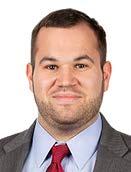
US LAW SUMMER 2023 USLAW MAGAZINE 29
DIVERSITY, EQUITY, and INCLUSION in INVESTIGATIONS A Critical Asset for Every Investigation

 Amie Norton Marshall Investigative Group
Amie Norton Marshall Investigative Group
30 SUMMER 2023 USLAW MAGAZINE US LAW
Diversity, Equity & Inclusion (DE&I) has become a major topic over the past few years and rightfully so. When reviewed and applied, these initiatives have proven to be valuable drivers for positive change within every industry in the United States.
When we make the commitment to be aware and continually review DE&I, updating initiatives whenever necessary, the work we do together and independently will be better. Productivity and profitability will be the fruit in business.
We will also find that our relationships with others become more meaningful in all areas of life.
When it comes to the investigative industry, the first prong of DE&I is key for Marshall Investigative Group. Diversity. Aside from creating community amongst the team, it is part of the foundation of a successful investigation.
At every level, diversity can be the difference between an average investigation and a successful investigation.
From administrative staff, business development representatives, investigators to surveillance agents – team members of every background add value.
Our differences make us stronger in every sense of the word.
APPROACHING EVERY INVESTIGATION
Preliminar y investigations, including Internet Presence Reviews, background checks or activity checks, help to determine what is best for each investigative request. They can help dictate IF the case warrants special consideration when assigning the investigator.
Considering all demographics and utilizing the information gained during this initial investigation, the investigator will know what type of vehicle blends into the area, what attire is common, whether a specific sex or even sexual orientation or age should be of consideration. This information is valuable when assigning the right agent to the job at hand.
WOMEN IN INVESTIGATIONS
When looking at the investigative industry, you will find it historically male-dominated.
Times have changed a bit, and while most field investigators (surveillance) continue to be men, the number of women taking an interest has grown. One of Marshall Investigative Group’s female agents has been in the investigation industry for over 30 years.
Today, industry wide, women represent
closer to 27%.
Women tend to face different challenges in the field - from safety concerns to personal comfort/conveniences.
Despite the differences, a female perspective can add value in the field or to any investigation.
Relative to conducting sur veillance and research, any agent who is tuned into their intuition, is invaluable. It’s 2023, but even in today’s environment, to some demographics, a female agent can appear unassuming. Within certain regions of the country, there are subjects who do underestimate a woman following them, as opposed to a male agent.
INCLUSIVE OF ETHNICITY, CULTURE AND LANGUAGE
Inclusion of agents with similar backgrounds and ethnicities in the area where the surveillance is being conducted will make for a more seamless investigation in the field.
It is essential sur veillance agents blend in on the job or risk “being made.” Every case is unique. Subjects are from all ethnicities and societies. Your investigative resources must have a team of agents from as many backgrounds as possible. It also helps maintain the anonymity of the surveillance. Investigators must pay attention to and honor local customs or habits. As an example, some neighborhoods have an afternoon play session in the streets around their homes, a good investigator will avoid situations like this.
When it comes to other field investigations like statements, recorded statements, EUO, or AOE/COE investigations, including an agent that makes the subjects feel more comfortable is a plus that cannot be ignored. Familiarity with the community or setting and understanding the subject’s language or customs help make the subject feel comfortable and contribute to a successful investigation.
A Special Investigations Unit (SIU) must have multilingual resources and agents of many ethnicities. SIU handles some of the most complex investigations. In matters of investigating an accident or cargo theft, for example, witness and recorded statements go best when the agent either speaks the same language or utilizes a translator. Sometimes your attire could even affect the subject’s perception of the interviewer, a suit or business attire may keep the subject from being forthcoming. Familiarities build trust and allow people to express themselves.
DIVERSITY, EQUITY, AND INCLUSION IN ACTION, AS A TEAM
Agents have the opportunity to roundtable. Having multiple agents from diverse backgrounds work on the same surveillance case or field investigations can be beneficial. Mixing male, female, racial or ethnic agents lends a broad perspective. All perspectives are considered when planning an investigation. Deliberating various points of view most often will aid in acquiring better information, leading to a better outcome for the client.
In sur veillance, we use both male and female investigators, depending on the details of the case, to form a team. This was particularly helpful in the instance of a traumatic brain injury (TBI) case, requiring Marshall Investigative Group to follow a male subject for at least six days and obtain video and audio documentation in public places as the subject conversed with others. By using both a female and male investigator on different days, we were able to successfully avoid suspicion and obtained evidence of the subject showing no substantial cognitive impairment. At one point, our female agent followed the subject into a bank, stood next to him, and obtained a video clip of him correctly tabulating three checks to deposit without using a calculator. The same subject demonstrated that they could not add 8 and 6 during a video deposition. This video led the jury to decide that the alleged injuries were not as severe as the plaintiff led them to believe in the complaint. The result was a $29 million demand reduced to a $1.5 million verdict—a favorable outcome for the attorney and a sigh of relief for the defendant.
Challenges are met when investigative resources are diverse enough to accommodate any request.
Amie Norton is a business development manager with Marshall Investigative Group, USLAW’s official investigative partner. Forever from Chicago, Illinois, and now a local to Charleston, South Carolina, Amie manages new and existing clients’ investigative needs nationally. She is a mother, runner, Indiana University graduate (go Hoosiers!), and enjoys meditation.

US LAW SUMMER 2023 USLAW MAGAZINE 31
Planning for Exemption Reduction: Why Business Owners Need to Consider Advance Gifting Ahead of 2026
Upcoming changes in the combined federal estate and gift tax exemption allow different possibilities for taking advantage of current exemptions. Such possibilities include advance gifting, arrangement for sales, and general estate planning updates.
The federal estate tax was previously “sunset” in 2010. However, Congress moved (relatively) quickly to reinstate it. At that time, Congress combined the lifetime gift exemption with the estate tax exemption. It then set the lifetime limit at $5,000,000, indexed to inflation. In 2017, for tax years 2018 onward, Congress doubled the exemption. The 2023 exemption is $12,920,000, adjusted for inflation. Moreover, a spouse
has the same exemption. A married couple can exempt up to $25,840,000 of assets with the combined exemption.
The problem (and opportunity) is that in the 2017 bill, Congress included another “sunset” provision wherein as of January 1, 2026, the “doubled” exemption ends and reverts to the 2011 $5,000,000 exemption (plus inflation). The current estimate is that the 2026 exemption will fall to between 6 and 7 million dollars.
As the 2024 and 2025 levels continue to increase, individuals may leave millions of dollars of exemptions on the table. The estate tax rate is progressive, maxing out at 40% of the taxable estate over $1 million.
How will the decrease affect potential taxpayers? Suppose that our taxpayer has an estate of $14 million. Suppose we presume that the 2025 exemption ends up at $14 million and the 2026 exemption ends up at $7 million. In that case, the taxpayer’s estate will pay no taxes if the taxpayer passes away in 2025 and nearly $2.75 million if the taxpayer passes away in 2026.
The opportunity for clients is that the estate tax exemption is combined with the lifetime gift tax exemption. Therefore, the question was posed, “What happens if the higher gift exemption is used up before 2026?” “Would there be a penalty later?”
“Would the IRS allow the exemption to be
32 SUMMER 2023 USLAW MAGAZINE USLAW
Richard R. Marsh Flaherty Sensabaugh Bonasso PLLC
used?” In November 2019, the IRS clarified its position in final regulations related to the Tax Cuts and Jobs Act.1 In those regulations, the IRS provided that individuals utilizing the higher gift tax exemptions through 2025 would not be adversely affected. The IRS offers an example on one of its FAQ pages, “Before 2018, A had never made a taxable gift. In 2018 when the [basic exclusion amount “BEA”] is $11.18 million, A makes a taxable gift of $9 million. A uses $9 million of the available BEA to reduce the gift tax to zero. A dies in 2026. Even if the BEA is lower that year, A’s estate can still base its estate tax calculation on the higher $9 million of BEA that was used in 2018.”2
This clarification by the IRS allows taxpayers to take advantage of these higher exemption amounts before the sunset in 2026. This also gives practitioners a reason to reach out to their clients, particularly business owners.
Part of the problem with estate planning is that individuals can be slow to act. This can be especially true with business owners as they generally have other, more pressing matters to address. At the same time, gifting and estate planning strategies for business succession can be time-consuming. It is worthwhile to begin planning now, even though we are more than two years away from the sunset.
One of the aspects that will take some time is having a business valuation performed. By having such a valuation done, one will better understand the benefits of early gifting. Further, the business valuation will allow you to consider splitting up the gift to secure a minority interest discount. Such valuation will also assist in responding to any challenges by the IRS.
Although a professional business valuation should be secured, preliminary work can begin to determine a rough value. By having a rough valuation, you can better plan the structure of the final plan. IRS Revenue Ruling 59-60 provides insight into how to value closely held companies. The ruling states that balance sheets for two or more years and detailed profit-and-loss statements for the last five years should be obtained. With that information in hand, you can start to determine if you have a potential estate or gift tax issue.
The actual mechanism of gifting the business can be simple or complicated. At the most basic level, an assignment of shares and membership interest can com-
plete the transaction. Even in such a situation, some due diligence should be done. One primary example would be to determine what personal guarantees, if any, exist and then work to release the owner from those.
Gifting the business presumes the owner wants a family member to have the company. Some owners may be looking to sell. That does not prevent the gifting strategy. If the business is sold, something still has to be done with the proceeds. Now, the newly liquid assets can be gifted to the next generation, and the exemption can be used up. With the liquidity in place, other options are available. One straightforward possibility is a spousal lifetime access trust, which allows the business owner to gift assets to a trust and provide an income stream for their spouse. Presumably, the business owner will then benefit from that income stream. The remainder can then pass on to their children.
There are, of course, downsides to advanced gifting. The biggest hurdle for many will be the loss of control. The owner will lose some or perhaps all control by gifting the company. They may also be concerned about their finances. Will they have enough money to live on? What kind of hit will their quality of life take? The planner needs to help address those concerns.
Different methods can be used to retain some level of control and stream of income. For example, some types of trust may be utilized. However, those will have a tradeoff between the level of control and taxation. Another potential avenue is recapitalizing the business and creating voting and nonvoting stock. The business owner could retain the voting stock and gift the nonvoting stock, thereby retaining control of the company.
When discussing the sunset, the political climate must be discussed. Nothing is stopping Congress and the president from removing the sunset provision and retaining the doubled exemptions. And because the sunset does not occur until the end of 2025, we may have a new president and a new controlling party in Congress. However, in many cases, the gifting plan does not have to be carried out yet. If the business owner plans to convey the business to their children, then the practitioner can prepare the succession plan. Then, it is ready to go if it appears that the sunset will happen. If Congress and the president act,
1 See IRS Treasury Decision 9884, available at https://www.federalregister.gov/documents/2019/11/26/2019-25601/estate-and-gift-taxes-difference-in-the-basic-exclusion-amount 2 IRS, Estate and Gift Tax FAQs, https://www.irs.gov/newsroom/estate-and-gift-tax-faqs, (last updated October 18, 2022)
then much of that drafting and planning will not be wasted because the succession still has to occur.
Due to this uncertainty, flexibility is going to be key moving forward. For example, often simple wills were prepared for clients that were comfortably under the estate tax exemption. In recent years, clients with appreciable assets have been guided into creating revocable trusts and pour-over wills. With revocable trusts, one can build in disclaimer trusts and provide the trustee and beneficiaries some leeway in allocating assets.
This uncertainty can also lead to using some tools that have fallen out of favor with the higher exemptions. For example, using irrevocable life insurance trusts can be appealing to clients. By having an irrevocable trust own the life insurance policy, the client minimizes the policy’s estate tax issues. The client is also less concerned than with other gifts because the asset the client is losing control over is one that control is not necessarily needed.
Using irrevocable life insurance trust also provides the opportunity to further educate clients on a misunderstood concept – the annual gift tax exclusion. With the life insurance trust, the client will “gift” the trust the policy premium each year. The current annual gift tax exclusion is $17,000, and that amount can be gifted to any number of people. Moreover, it will not count against the combined federal estate and gift tax exemption. This provides another mechanism for avoiding taxes down the road.
Advanced gifting is not going to be for everyone. For business owners, it should at least be a consideration. If an owner is reaching a point where he or she is thinking about “winding down,” now is a good time to consider doing it. With the double-exemption sunset approaching, considerable tax savings are available. Perhaps more important is meeting an owner and discussing succession planning. A good plan now will pay dividends later, even if one decides to forego advanced gifting.
Richard Marsh is an attorney with Flaherty Sensabaugh Bonasso PLLC in Clarksburg, West Virginia. His practice focuses on trust and estate planning, administration and litigation; real property; general business representation; and bankruptcy and creditor representation. He may be reached at 304.624.5687 or rmarsh@ flahertylegal.com

US LAW SUMMER 2023 USLAW MAGAZINE 33
Negligent Entrustment2...
The basics of a negligent entrustment claim are well known and fairly straightforward. The Restatement (Second) of Torts recognizes negligent entrustment as a cause of action, stating:
One who supplies directly or through a third person a chattel for the use of another whom the supplier knows or has reason to know to be likely because of his youth, inexperience, or otherwise, to use it in a manner involving unreasonable risk of physical harm to himself and others whom the supplier should expect to share in or be endangered by its use, is subject to liability for physical harm resulting to them.
In other words, if an owner loans her car to someone she knew or should have known was likely to endanger others while driving, she could be liable for the resulting car accident. But what if the owner loans the car to a responsible driver, who in turn loans it to an irresponsible driver? What if that person then loans it to their teenage son? How many borrowers is the original owner liable for entrusting the car to?
Surely, the best course of action to avoid liability is to have exclusive control by
the owner. While this might be doable for some, in the case of family vehicles, teenage decision-makers, or businesses that allow loaner or test-driven vehicles, exclusive control is simply not possible.
For car owners who cannot avoid lending their cars to others, Courts have looked to traditional theories of agency when determining if an owner is liable for secondor third- levels of entrustment. The Ninth Circuit Court of Appeals, in the 1964 case State Farm Mut. Auto. Ins. Co. v. Williamson, 331 F.2d 517 (9th Cir. 1964), when faced with the case of parents whose teenage son loaned a vehicle to his girlfriend, asked, “whether the initial grant of permission was broad enough to include an implied grant to the permittee of authority to give another use of the automobile?” In this matter, the parents allowed their 20-yearold son to use a family car but expressly prohibited their son from allowing anyone else to use it. The parents laid out a few ground rules for using the car, but their son violated those rules frequently. The parents knew about these rule violations but still allowed him to drive the car.
These parents knew their son had a girlfriend, and they had seen the girlfriend drive the family car before. When
the girlfriend got into a car accident, the Ninth Circuit had to answer whether the parents were liable for this accident under the theory of negligent entrustment, even though the parents explicitly told their son no one else could drive the car. The Ninth Circuit held that a jury could infer the parents should, and did, reasonably anticipate their son would permit his girlfriend to drive. The Ninth Circuit reasoned that by continuing to allow their son to use the car, the parents impliedly consented to the girlfriend driving, even in the face of their express prohibition. The court stated:

If the understanding of the parties is that a disregard of the ‘rules’ will be ignored, or will bring forth only reprimand or token punishment, an invitation to disregard is implicit. If a permittee is led to believe that the exercise of his own judgment within the ‘forbidden’ area will not prejudice him in his status as permittee or otherwise, authority to disregard can be found.
Twenty-four years later, the Texas Court of Appeals followed the same analysis in its Drooker v. Saeilo Motors decision. 756 S.W.2d 394 (Tex. App.—Houston [1st dist.] 1988).
34 SUMMER 2023 USLAW MAGAZINE USLAW
Erica Spurlock and Seraphim Sparrow Jones, Skelton & Hochuli, P.L.C.
How far does the liability extend?
Saeilo Motors was a car repair company that would loan customers cars while it repaired their vehicles. This case arose when Saeilo Motors’ own manager took a loaner car while Saeilo Motors repaired his car. This manager let one of his friends drive his car frequently. In fact, other Saeilo Motors employees saw this friend driving the manager’s car “on many occasions.” Saeilo Motors never gave the manager’s friend permission to use the loaner car, but the manager allowed him to drive it anyway. After the friend got into an accident, the Texas court had to decide whether the lack of express permission meant Saeilo Motors could prevail on a Motion for Summary Judgment, or whether the question of permission could get to a jury. Because Saeilo Motors employees knew the manager’s friend drove his cars often, the court held that a jury could decide whether Saeilo Motors gave implied permission to the manager’s friend.
In 2003, The Georgia Court of Appeals applied the same reasoning in Metro. Prop. and Cas. Ins. Co. v. McCall, 581 S.E.2d 651 (Ga. Ct. App. 2003). This case involved parents who loaned their family car to their son’s girlfriend frequently, subject to the condition that their son could not drive the
car. The girlfriend never violated this condition before, and so when the son drove the car and got into an accident, the court held there was no evidence to suggest the parents gave their son permission to drive the car.

Knowing that courts analyze cases this way, those who loan vehicles should take the following steps to avoid a negligent entrustment claim:
1. Fully vet employees, family members, or friends for prior automobile collisions, tickets, or any other indications of an unsafe driving history before loaning them a vehicle;
2. Set firm rules about allowing your drivers to lend the cars to third parties and enforce the rules with more than a reprimand - there should be real consequences for violating these rules; and
3. Closely monitor drivers to ensure ongoing safety and that they are not loaning out the vehicle beyond the original permission.
These rules are not an exhaustive list. Neither do these rules guarantee that you will never be sued under the theory of negligent entrustment. However, because courts are looking to agency rules and theory to determine if and when entrustment
Erica Spurlock focuses her litigation practice in the areas of automobile, commercial trucking, and other personal injury, wrongful death and general liability defense. She also represents product manufacturers, car dealerships, and rental car companies. In her practice, she has obtained favorable outcomes for many of her clients through motion practice, settlement negotiations, arbitrations, and trials in state and federal courts.
A member of the Transportation, Auto, Products & General Liability Defense Trial Group, Seraphim Sparrow works with insurers and commercial transportation companies to defend claims involving general civil litigation, product defect, and personal injury and wrongful death.

 has occurred on a secondary or tertiary level, strict rules and enforcement will be the strongest defense.
has occurred on a secondary or tertiary level, strict rules and enforcement will be the strongest defense.
US LAW SUMMER 2023 USLAW MAGAZINE 35
What Makes a Good Trial Theme?
“Pride Over Policing.” “Science, Not Speculation.” “A Culture of Callousness.”
“They Got What They Paid For.” What do these phrases have in common? Each was a trial theme we developed for our clients in high-profile cases, and each was quoted in newspaper headlines in the days that followed those trials. If the phrases stuck with reporters, you can be sure they stuck with the jurors who were watching, too. (Each case also ended in victory for our client, in case you were wondering.)
Trial themes are short, memorable phrases tied to your main arguments. They are intentionally oversimplified to make them easy for jurors to understand, write down, and assimilate throughout a lengthy trial. Well-constructed trial themes leave a lasting impression that can turn the tide of jury deliberations. But to harness their power, attorneys must understand why they work—and how to make them work well.
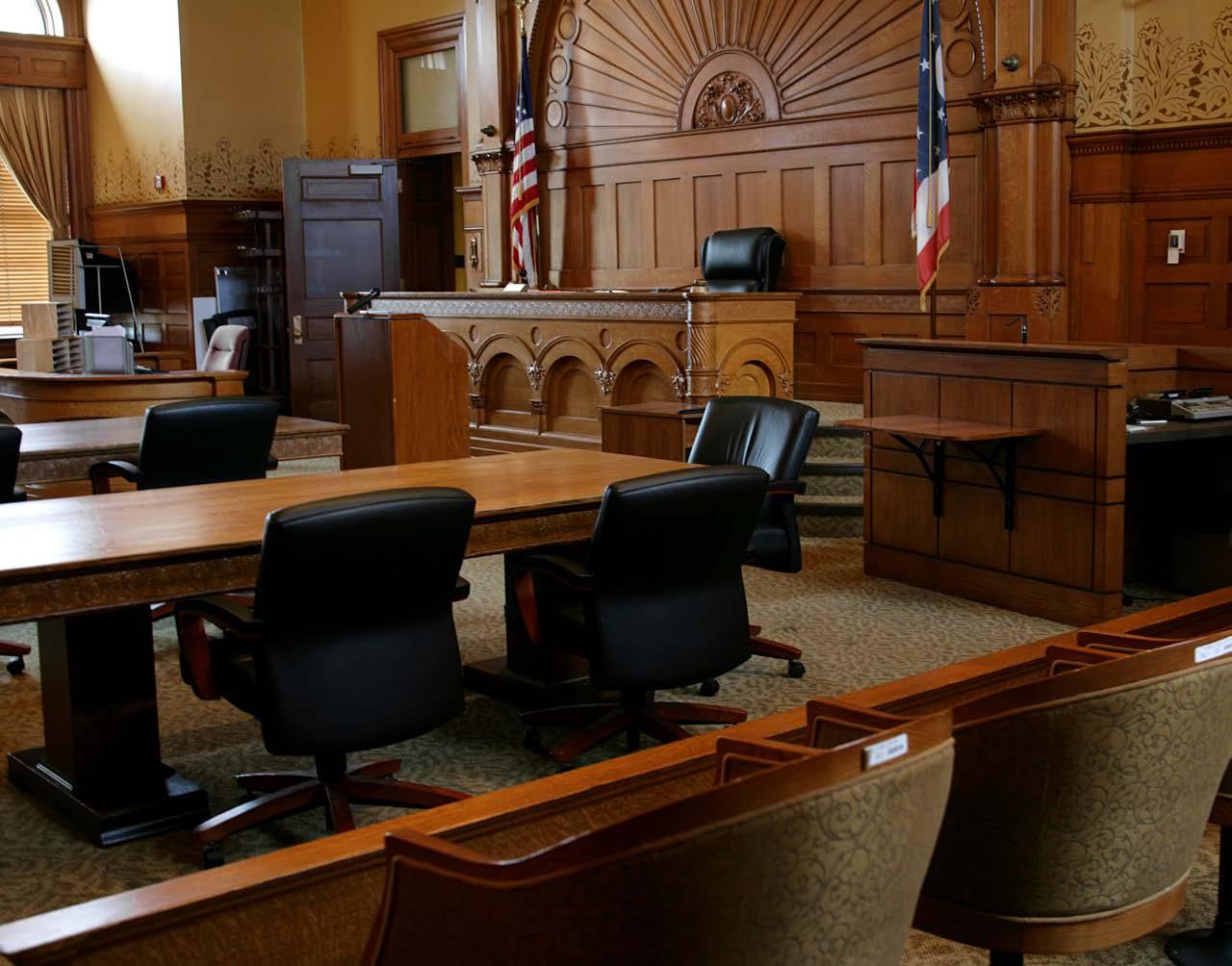
WHY ARE THEMES USEFUL?
Social science research on cognition and memory has identified a number of factors that improve subjects’ recall abilities. As you might expect, shorter words and phrases are significantly easier to remember than longer words and complete sentences. That’s why advertising companies generate simple slogans like “Just Do It” and “Don’t Leave Home Without It.” Words and phrases that are repeated are more memorable as well. But less apparent are other research findings, such as improved recall when words share sounds or have overlapping meanings, connotations, or associations. Song, rhythm, and rhyming can also improve memory—it’s how we learned our ABCs, after all. Even the emotionality of a word can improve recollection. For instance, the words “fear,” “pride,” and “joy” are more likely to be remembered than inanimate objects. Several studies have also
looked at the impact of organization on memory. Time and time again, they show that people can recall more information when the information is organized into topical lists.
Good trial themes leverage social science findings like these in a legal context. They create memorable “buckets” to help jurors absorb and organize the mountains of evidence thrown their way. When attorneys place each case fact, document, and witness into one or more of these buckets, jurors no longer have to try to remember every piece of evidence—which they never will—but rather can refer to the thematic buckets and the key evidence housed within them.
CRAFTING A SUCCESSFUL TRIAL THEME
As you contemplate your own trial themes, the single most important question to ask yourself is, “Will jurors write this
36 SUMMER 2023 USLAW MAGAZINE US LAW
Christina Marinakis, J.D., Psy.D. and David Metz IMS Consulting & Expert Services
down and repeat it?
Jurors should be echoing your arguments in the deliberation room. If you cannot envision jurors in the venue writing a theme down and repeating it, rethink it. If it is longer than a newspaper headline or advertising slogan, rework it. Trial themes should be pithy, simple, and memorable. Done right, you will hear them (as we often do) repeated by mock jurors in deliberations and from actual jurors in post-trial interviews.
Numerous literary devices can make your themes more memorable:
Alliterative, Consonant, and Assonant Phrases
Phrases with multiple words sharing similar sounds are pleasing to the ear, fun to say, and easier to recall. Consider the following two themes: “The Dose Makes the Poison” and “The Dose Makes the Difference.” Both are pithy, but the latter, with its repeated “D” sounds, is more likely to be remembered. There is no need to abandon the “Poison” variant altogether; you might use it instead to supplement the other. Additional successful, real-life examples have included “Everyone Can’t Be Responsible for Everything,” “It’s Exactly as You’d Expect,” and “Projections Aren’t Promises.”
Rhyming and Rhythm
These verbal patterns also contribute to memorable themes. Almost anyone alive during the OJ Simpson trial knows well the phrase, “If the Glove Don’t Fit, You Must Acquit.” And while rhymes can veer into cheesy territory and are best used sparingly, the power of rhythmic phrases cannot be overstated. Try saying themes like “Any Driver, Same Result” or “Totally Different Cranes That Operate Totally Differently.” Their singsong quality captures jurors’ attention and wraps up your argument with a punch.
The “Rule of Threes” is a notable subset of rhythmic phrasing. For whatever reason, humans like to hear things in groups of three. “Experienced, Qualified, and Competent” might describe a driver you are defending in an accident case. “Context, Completeness, and Consistency” are important things the jurors should look for when evaluating the documents presented by opposing counsel. Presenting a trial theme in three words is a great way to encourage jurors to write it down and remember it.
Colloquial Phrases and Idioms
Jurors are already familiar with and use them on a regular basis, so they supply jurors’ strained memories with a natural shortcut. “An 18-Wheeler Can’t Stop on a
Dime,” “With Great Power Comes Great Responsibility,” “A Plan Isn’t Set in Stone,” and “Practice What You Preach” are all phrases you have probably heard before, and each of those phrases has been used in trial to hammer home an important point. One of the greatest things about conducting jury research is that you will frequently hear mock jurors use idioms and colloquialisms when talking about your case. What better way to connect with jurors in the trial venue than by adopting their own words?
PRESENTING THEMES TO A JURY
If you want jurors to repeat your trial themes, you had better repeat them, too. No matter how memorable they are, your themes are competing with thousands of other words in the courtroom. Give them a signal boost: introduce themes frequently in the opening, incorporate them into visuals and witness Q&A, and circle back in closing.
Opening and Closing
Opening and closing offer the most obvious means to present themes to a jury. We suggest introducing an argument with its corresponding theme, either as the first words out of your mouth or somewhere within your first sentence. But you should also revisit the theme when you are wrapping up the topic—a thematic “mic drop,” if you will.
Just as opening and closing bookend your case, themes should bookend your argument on a given subject. You can say the exact same phrase, or you can use variations to mix it up. For example, you might start with, “Not Every Medical Issue Is a Medical Emergency,” and at the end of the argument, re-emphasize that “Medical Issues Don’t Make an Emergency.”
Visuals
When it comes to learning, of course, many of your jurors will favor their eyes over their ears. As we know from seeing mock jurors’ handwritten notes, they are much more likely to write down your trial themes when you have done so yourself and put them on display.
Consider writing out your themes under a document camera or on an easel and include them as headings on your slide deck throughout the trial. Remember the bit about “buckets”? By making your theme the heading of a slide or series of slides—with the related facts, demonstratives, document callouts, and testimony outlined below—jurors can watch along as you put the evidence in that bucket. You can even color-code your evidentiary slides with their associated themes for an added mnemonic touch.
Witnesses
Lastly, trial themes are most effective when they come from both counsel and witnesses, so try to elicit testimony that reaffirms those themes. You can even do this with opposing witnesses: “Is it fair to say, doctor, that the dose makes the difference in determining whether an exposure is hazardous?” However, be careful that your own witnesses are not using the exact same phrases as one another, as this gives jurors the impression that the testimonies are rehearsed. Invite witnesses to come up with their own theme variations during your prep sessions, or suggest variations for them to use (e.g., “It’s All About Dose.”) Work with your witnesses ahead of time so they can practice weaving the case themes into their testimony naturally and in their own words.
IN CONCLUSION
A good trial theme is anything a juror is going to write down in their notebook and bring up in deliberations. In a long battle for the jury’s attention and memory, certain methods make that outcome more likely. And once you’ve crafted your catchy phrases? Repeat, repeat, repeat. A good theme said only once is a good theme gone to waste.
It is tough to pinpoint the ideal themes for any given trial venue and set of case facts, and the only way to know with confidence is to test them through jury research. But the next time you see your theme repeated in mock trial deliberations or a post-trial interview—or maybe even in the headlines—thank a psychologist.
Dr. Christina Marinakis has more than 20 years of experience in jury research, jury study, and applied practice in law and psychology. She regularly assists counsel in developing and implementing trial themes.

David Metz brings a storytelling perspective to his role as IMS associate jury consultant, helping clients better understand the juror audience and the messaging required to reach them. David has a strong sense of the nuances of specific case genres and crafts thematic narratives that speak to jurors across venues.

US LAW SUMMER 2023 USLAW MAGAZINE 37
When Energy Ignites Exploring Thermal Runaway Failure Modes in Lithium-ion Batteries

Stop. Look around. You might notice a laptop, mobile phone, tablet, wristwatch, power tool, digital camera, landscape lighting, electric bike, lawn mower, vehicle, or any number of battery-operated products. Some of these products, like flashlights, wristwatches or remote controls, house primary batteries such as alkaline AA/AAA or lithium-metal coin cells that cannot be recharged. Some of these products contain secondary batteries such as lithium-ion, nickel-cadmium, nickel-metal hydride, or lead-acid that can be recharged and reused, making them (more specifically, lithium-ion batteries) the more desirable option for powering our everyday products. The increased use of these lithium-ion batteries in wide-ranging applications brings an increased focus on battery safety. More specifically, the focus turns to battery or battery-operated products that can lead to potentially catastrophic results if failure occurs, such as explosion or fire, that can result in significant property loss or even loss of life. By understanding how a battery works, along with common failure modes and mitigation systems, the industry can be better prepared to act if these incidents do occur.
HOW DO LITHIUM-ION BATTERIES WORK?
A quick look at Fig. 1 below will illustrate the ins and outs of how a battery works. A typical commercial lithium-ion battery (LIB) is composed of a negative electrode (anode) made from carbon/ graphite coated onto a copper current collector, a transition metal oxide positive electrode (cathode) coated onto an aluminum current collector, a separator, and an electrolyte composed of lithium salt in an organic solvent. When the battery is in use, lithium ions (Li+) move through the electrolyte from the anode to the cathode, as illustrated below. Chemical reactions occur that generate electrons and convert stored chemical energy in the battery to electrical energy. When the battery is charging, the chemical reactions go in reverse.
LIB cells are available in different form factors such as cylindrical, coin, pouch, or prismatic. At the high level, Fig. 2 explains a typical LIB cell-to-module-to-pack assembly in a bottom-up approach.
LIB FAILURE
Lithium-ion batteries can experience a non-energetic failure, such as battery capacity
loss or swelling, or an energetic failure, such as thermal runaway, which is what will be focused on here. Thermal runaway (Fig. 3) events and ensuing fires and explosions are the primary cause of catastrophic LIB failure. There are a number of ways in which LIB thermal runaway can be triggered, which include thermal abuse, mechanical abuse, electrical abuse, latent defect, or an internal short circuit. Misuse of the LIB product/battery can lead to one or more of these conditions. The exact effects that occur during thermal runaway are dependent on several key factors, including, but not limited to, the specific makeup of the battery itself, battery state of charge (amount of charge relative to the battery capacity), health, etc. When the LIB cell experiences one of the abuse conditions, a chain reaction is initiated at a critical onset temperature leading to increased heat and temperatures. Cell thermal runaway can spread to neighboring cells, additional components within the battery module, pack, or system, resulting in smoke, flame, fire, and/or an explosion.
An electric vehicle collides with a secondary vehicle. In this scenario, a mechanical abuse condition can occur when
38 SUMMER 2023 USLAW MAGAZINE US LAW
Sanket Kadam S-E-A
an external object crushes or punctures/ penetrates the battery. If this should happen and a cell separator is torn in the process, it can lead to an internal short-circuit and, in turn, rapid heating of the cell and can trigger thermal runaway. This is why it’s very important for electric vehicle crashes to be handled with additional precautions, as there are many first responders who arrive on the scene when an accident takes place. Mechanical abuse can also happen when shipping and handling packages of cells, battery packs, or equipment containing packs. These items can be dropped, crushed, and punctured, causing mechanical damage to the cells.

When was the last time you borrowed someone’s charger to charge your phone or another portable lithium-ion battery-powered device? Using an incorrect or non-manufacturer recommended charger can lead to overcharge, an example of an electrical abuse condition. Electrical abuse and mechanical abuse can lead to internal short-circuit resulting in heat generation, a thermal abuse condition. Electrical abuse conditions like fast charging, over-discharging, and external short-circuit can lead to a thermal runaway event. At the cell level, charging at high rates, high state of charge, or at low temperatures can lead to lithium plating, the deposition of metallic lithium on the anode graphite surface. In severe cases, lithium plating forms needle-like deposits that penetrate the separator, causes internal short, and inevitably, can lead to thermal runaway. Over-charge can also significantly degrade the cathode owing to excess removal of lithium that can add to an unstable structure and thermal runaway result. Faulty packaging or careless handling of the cells can lead to an external short-circuit, which can produce large amounts of current, rapidly generate heat, and can lead to thermal runaway.
Aside from mechanical, thermal, or electrical abuse, a latent defect, like a contaminant introduced during the battery cell manufacturing process, is another factor that can trigger a thermal runaway event with explosion, fire and/or smoke. These defects can take place at any step of the manufacturing process, including but not limited to, in cell raw materials, electrode coatings, contaminants introduced during assembly processes, misplaced, misaligned, or damaged components, manufactur-
ing-induced electrode damage (scratches, punctures, tears, active material displacement), electrode tab burrs, weld spatter, etc.
LIB RISK MITIGATION
While several causes (as described in the above section) can potentially lead to lith-
example, in electric vehicles, keeps the battery within the safe temperature, voltage, and current operational limits, in addition to providing information related to the battery. The BMS can protect the battery by alerting the user in case the battery experiences undesirable conditions such as over or under charge, discharge, temperature, etc., and subsequently performing appropriate trip or protective actions.
Test and validation that meets applicable safety standards and regulations at the cell, module, pack, or system level can help reduce the risk of potential field incidents. Product safety, certification, standards, or regulatory organization examples include United Nations, International Electrotechnical Commission, Society of Automotive Engineers, Underwriters Laboratories, and the International Organization for Standardization, to name a few.
CONCLUSION
ium-ion battery (LIB) thermal runaway failure, certain mitigation strategies can be implemented prior to, during, or after a thermal event to help reduce the risk of a potential fire or explosion.
At the cell level, lithium-ion batter y cell enclosures can be designed to have safe venting. In case the cell’s internal pressure rapidly increases, this can help prevent pressure build-up, which, if left unchecked, can potentially lead to violent venting, ignition of vent gases, and/or ejection of cell contents. Similarly, an optimal venting strategy is important at the LIB pack level. At the LIB pack or system level, a battery management system (BMS) is one of the most critical safeguards. A robust BMS continuously monitors cell, module, and pack characteristics and works alongside the battery thermal management system to maintain optimal temperatures throughout the pack. A BMS’s active control strategy, for


The use of rechargeable lithium-ion batteries in our everyday products is here to stay for the foreseeable future, and in turn, so is the potential risk of fire or explosion from a thermal runaway event initiated by LIB abuse, latent defect or other contributing factors. As we charge into the future, a better understanding of how these batteries operate and fail can meaningfully help mitigate the risk of a (thermal) event occurring. This knowledge will also enable us to maintain the investigative strategies and knowledge to identify the cause when it does.
Sanket Kadam is a battery consultant and the Energy Storage Practice Group Lead at S-E-A. He earned his bachelor’s in chemical engineering from the Institute of Chemical Technology, along with his master’s in chemical engineering from Michigan State University. His experience consists of roles in battery research, agile battery technology, and automotive electric vehicle startups. His experience includes engineering, materials, and test-driven battery cell-to-module-to-pack safety profile improvement, product development process, electric vehicle builds, commissioning, and launch activities, cell, module, and pack level testing, design of experiments, design verification plan and report activities.
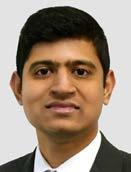
US LAW SUMMER 2023 USLAW MAGAZINE 39
FIG. 1 Lithiumion battery (LIB) operating principle with focus on solid electrolyte interphase (SEI) at the negative electrode (anode) surface and cathode electrolyte interphase (CEI) at the positive electrode (cathode) surface.
FIG. 3 Lithiumion battery (LIB) thermal runaway overview.
FIG. 2 This figure shows a cylindrical lithium-ion battery (LIB) cell, a LIB battery module assembled using several cylindrical cells, and a LIB battery pack assembled using several battery modules.
Why Should Workers’ Compensation Carriers, Self-Insured and Injured Workers Care about the Medicare Secondary Payer Act?
Let’s take a moment to look at an example of a workers’ compensation claim. You have an injured worker who has failed back surgery, they applied and were awarded SSDI benefits over two years ago, and they are now receiving Medicare benefits. The vocational rehabilitation counselor was unable to find alternative work. The injured worker has expressed interest in resolving their case, including future medical. How do the settling parties reasonably consider Medicare’s interest in resolving this case? We will walk you through the steps in this article.
First, it’s important to understand when Medicare is a Secondary Payer. In the case of workers’ compensation when a claim is accepted as compensable, workers’ compensation becomes the primary payer. These provisions protect the Medicare Trust Fund by ensuring Medicare doesn’t pay for services when there is a primary payer, such as workers’ compensation.
Medicare has increased its enforcement and recovery efforts over the years to preserve the Medicare trust fund. Part A, Hospitalization coverage, is currently projected to go insolvent by 2028. As good corporate stewards, we can do our part in preserving the Medicare trust fund by adhering to the Medicare Secondary Payer Act (MSP Act).
There are three main areas of Medicare compliance: Section 111 Reporting re-
sponsibilities, Conditional Payments, and Medicare Set Asides (MSAs).
We will begin with Sectional 111 Reporting. In the case above, the primary payer has a duty to file Ongoing Responsibility of Medical (ORM) reporting when the injured worker becomes a Medicare beneficiary, and the claim is accepted and meets the $750 threshold. The payor also has a duty to file a Total Payment Obligation to the Claimant (TPOC) when the claim is settled, which includes the release of future medical. Think of Section 111 Reporting as Medicare’s radar to identify potential conditional payments and coordinate benefits. The Benefits Coordination and Recovery Center posts Section 111 data to the Common Working File used by medical providers to determine primary coverage.
KEY TAKEAWAY: The Centers for Medicare and Medicaid Services (CMS) expects primary payers to report timely and accurately. It’s anticipated that CMS will issue a Final Rule imposing Civil Money Penalty up to $1,000 per day of noncompliance for each individual for Section 111 reporting noncompliance. This is expected to be released in February 2024. CMS encourages payors to review their Section 111 programs to ensure timely and accurate reporting.
Next, we will address traditional condi-
tional payments (Part A – Hospitalization & Part B – Physician services). Medicare is prohibited from making payment “to the extent that payment has been made or can reasonably be expected to be made” by a workers’ compensation law or plan. Medicare uses contractors to facilitate conditional payment recovery and benefit coordination.
Medicare Part C and Part D plans also have a right of recovery through the private cause of action (see 42 U.S.C. 1395y(b)(3) (A)).
There are two Medicare contractors that pursue conditional payments: The Benefits Coordination and Recovery Center (BCRC) and the Commercial Recovery Center (CRC). The BCRC collects and compiles information about beneficiaries’ other health coverage and recovers conditional payments where beneficiaries have received payments from primary payers (e.g., settlements, judgments, awards). BCRC recoveries are associated with Sec. 111 TPOC filings and what is released in the settlement. If the settlement releases denied body parts, BCRC may pursue recovery.
The CRC recovers conditional payments from workers’ compensation carriers associated with Ongoing Responsibility of Medical (ORM) on injuries and conditions that are accepted. Important to note that this can be a continuous recovery through the life of the claim, and you may receive multiple
40 SUMMER 2023 USLAW MAGAZINE US LAW
John Kane, AIC, MSCC, CMSP-F Ametros
demands. The filing of ORM will generate a Conditional Payment Notice (CPN). The CPN provides conditional payment information. It advises the applicable plan that certain actions must be taken within 30 days of the date on the CPN, or the CRC will automatically issue a demand letter.
In the example of the back injur y, the workers’ compensation carrier would report ORM that triggers a review of conditional payments once the injured worker becomes eligible for Medicare. Let’s say conditional payments exist in the claim, the adjuster reviewed and determined the treatment was work related and reimbursed CRC. Now a month later, the claim settles, and the carrier files the TPOC. BCRC will do a final sweep to see if there are any additional conditional payments. It’s important to note that the workers’ compensation carrier is considered the debtor when the claim is accepted and ORM is filed. When the case settles, the injured worker becomes the debtor, and the carrier will no longer receive conditional payment letters without signed authorization from the injured worker. When a carrier takes responsibility for conditional payments post-settlement, they will need signed authorization (Proof of Representation) from the injured worker to have two-way communication with BCRC and negotiate the debt. The carrier should also include injured worker cooperation language to dispute any unrelated debt.
KEY TAKEAWAYS: Primary payors, or Responsible Reporting Entities, must ensure accurate Section 111 Reporting of injuries that can lead to conditional payment letters. If the carrier agrees to pay related conditional payments after settlement, they will need a signed authorization from the injured worker. Without the authorization, the primary payer may never be aware of the debt’s existence because the correspondence will only be sent to the injured worker, which can lead to interest and potential Department of Treasury Offset against the primary payer.
F inally, we have Medicare Set Asides (MSAs). 42 U.S.C. 1395y(b)(2), prohibits Medicare from paying claims that should be paid by another responsible party. Medicare’s interests must be considered and adequately protected in any settlement which forecloses future medical expenses.
In the example of the back injur y, the carrier obtains an MSA in the amount of $177K for the projection of work-related injuries that would otherwise be covered by Medicare. The settling parties agreed to voluntarily submit to CMS that was later approved. In this case, the injured worker wanted peace of mind knowing the MSA
was approved by CMS and if funds exhaust properly, Medicare will step in and cover.
Important reminder: CMS’ determination regarding the WCMSA is not finalized until Benefits Coordination and Recovery Center (BCRC) receives the approved settlement documents. The WCMSA Reference Guide addresses this requirement in Section 15.3.
In January 2022, CMS released an updated WCMSA Reference Guide. The guide introduced Section 4.3, Non-CMS approved or Evidenced Based Medicine MSAs. This release was followed by a CMS town hall call to review the guidance and questions raised by the industry.
CMS initially took a strong stance, indicating they will deny if funds exhaust. This was later changed to:
“As a matter of policy and practice, CMS may at its sole discretion deny payment for medical services related to the WC injuries.”
If Non-Submit funds exhaust, CMS will require attestation of appropriate exhaustion equal to the “total settlement.” This will result in the injured worker needing to demonstrate complete exhaustion of the net settlement amount rather than a CMSapproved Workers’ Compensation Medicare Set Aside (WCMSA) amount. This requirement can be avoided if it can be demonstrated, at the time of MSA funds exhaustion, that both the funding of the MSA was adequate and the utilization of MSA funds was appropriate.
KEY TAKEAWAYS: CMS would prefer settling parties use the voluntary CMS review process when thresholds are met. That said, CMS understands this is voluntary, and if the settling parties decide not to submit, that is a choice of the parties.
We had some great news recently from CMS updating their guidance on the amended review process where a CMS determination was made; however, the medicals didn’t settle. The change eliminated the 6-year window from the CMS approval date; that opens opportunities for carriers and plaintiff attorneys to re-evaluate medical settlements if the criteria is met in Sec. 16.3.
The resolution of medical in a settlement doesn’t end the injured worker’s responsibilities for considering Medicare’s interest and preserving their rights to Medicare coverage. Ametros produced a whitepaper on the reality of Medicare denials post-settlement, demonstrating that Medicare is aware of an approved MSA through the Common Working File (CWF) and how they use a special code W to identify an MSA. If the physician bills Medicare for work-related care post-settlement, Medicare will deny payment as the MSA
funds should pay first. If the injured worker inappropriately spends (intentionally or unintentionally) MSA funds, they may lose their rights to Medicare coverage related to the work injury.
MSA administrative responsibilities:
• Placing the MSA funds in a separate interest-bearing account
• Reviewing the medical bills and only paying for items or services related to the workers’ compensation injury and covered by Medicare
• Maintaining accurate accounting of funds
• Providing Medicare with annual attestation on the appropriate spend
• Understanding that CMS holds the injured worker accountable for the same standards as if the MSA funds were professionally administered
Although injured workers may act as their own administrators by referencing the 31-page WCMSA Self-Administration Toolkit, CMS highly recommends the use of a professional administrator to manage MSA funds, especially in the cases of controlled substances outlined in Sec. 17.1 of the guide. Professional administration simplifies the complexities of CMS guidance for all settlement stakeholders, provides security knowing the MSA funds are spent appropriately, and ensures the injured individual will have dedicated expert support to answer questions post-settlement.
There is clear support for professional administration, and claims and defense counsel should consider offering it as part of the settlement offer to simplify the healthcare experience and preserve injured workers’ rights to Medicare benefits.
John Kane , AIC, MSCC, CMSP-F is Vice President, Strategy of Ametros . With over 30 years of experience in a variety of workers’ compensation and liability claims positions, John leads the strategic direction for Ametros’ workers’ compensation and liability programs, including the implementation of professional administration. His extensive background in Medicare Secondary Payer (MSP) compliance makes him an expert in leading the adoption of high-performing programs that protect both clients and the injured individual with professional administration. He is the President of The Medicare Secondary Payer Network (MSPN) and an active member of the Medicare Advocacy Recovery Coalition (MARC), instructing the Certified Medicare Set Aside program.

US LAW SUMMER 2023 USLAW MAGAZINE 41
PLAYING OFFENSE
A New Perspective on Defense Strategies and Countering the “Attorney-Driven Medical” Cases
We’ve all been dealing with “reptilian theory,” and overinflated medicals in otherwise simple cases. Plaintiff’s attorneys are winning big verdicts by submitting bills from health care providers for MRIs and surgeries and by playing upon a juror’s fears regarding safety and protection, facts and evidence be damned. It’s a problem because it works.
Not unlike the Playboy expose done by the notorious feminist, Gloria Steinem, this die-hard defense attorney is going to take you behind the scenes of one the biggest, most aggressive plaintiff’s practices in the U.S. I am going to share with you how they are playing the game and then offer some offensive strategies to counter these cases. As a former plaintiff’s attorney, I am probably more aggressive than most defense attorneys, and after reading this article, I urge you to be more so, too.
THE CURRENT DEFENSE MINDSET
Many defense lawyers are just that- defense lawyers. They play defense and always have. What does this mean? It means responding to pleadings and discovery and occasionally reporting what’s happening to a client. It means assessing the likelihood of prevailing at trial. It means taking depositions, hiring experts, and trying to settle cases with or without a mediator’s help within the reserves as set by your client, which is often an insurance company.
But you can’t win a football game just by playing defense. At best, you won’t LOSE a football game, at least in regulation. At some point, somebody must play offense. Most defense verdicts can be characterized as the result of the plaintiff’s failure to make his case. This is not to say that the defense attorney was not brilliant and eloquent and prepared- and that these skills were what caused the plaintiff to fail to make his case.

It is simply meant to convey that the brilliance was used defensively. The defense attorney performed an amazing cross examination and got the plaintiff to admit his own culpability for the collision. The defense expert was the best at his game and caused the jury to question the methodology of the plaintiff’s expert. The damages were attacked by a skillful investigation into the plaintiff’s social media, which revealed him mountain climbing despite his claims of back injury. Defense.
Playing not to lose has been for the most part, what the defense bar has settled for and called a victory. But meanwhile, defense costs were incurred and often more money was paid out with the mindset that it was less than the cost of defense, or at least it was an amount certain which beat the unknown jury verdict. But it wasn’t what the adjuster or his attorney really felt was a reasonable amount to pay out on the claim.
42 SUMMER 2023 USLAW MAGAZINE US LAW
Melissa Casey MehaffyWeber
So, what, exactly, is meant by “an aggressive defense strategy?” The aggressive defense strategy is a way to turn cases on their head and push back on unscrupulous plaintiff’s attorneys. It is hoped that if utilized effectively by the defense bar, it will serve to curtail lawsuits with questionable liability, but more importantly, stem the hemorrhaging of paying excessive settlements and judgments.
Playing offense means bringing dispositive motions. It means attacking the medicals more aggressively. It even means finding all the ways your client can recover from the plaintiff. That’s right, it means turning the tables on the plaintiff and bringing counterclaims and settlement offers using Texas Rule of Civil Procedure 167 early on. Creating litigation where the plaintiff and his attorney stand to lose something, not just one in which they win or not. This puts more pressure on the plaintiff and serves as a balance of power. Litigate in a way that the plaintiff may have to pay your client. Fight back against the pleadings which were not based on facts and seek sanctions where appropriate. Use discovery to uncover the unethical and impeachable relationships that exist between the plaintiff’s medical providers and the plaintiff’s attorney. If nothing else, you will cause the plaintiff’s attorneys to spend time defending themselves, which is time you’ve kept them from coming after you.
SOME UNSCRUPULOUS PLAINTIFF TACTICS
Many of you have also worked on the other side of the aisle. Most plaintiff practices are made up of friends and colleagues and law school chums. They are good people, who, let’s face it, keep us employed as if no lawsuits were filed, there would be no one to defend. Many cases deserve to be filed and settled or tried, as someone really was negligent, and someone else was really hurt by it. This article is not about THOSE cases.
Unfortunately, there are a whole slew of other cases, cases which are either based on zero liability or involve a minimal injury but are being “worked up” so that an entire commercial policy is being demanded by a plaintiff’s attorney with a large ego and an even larger jet fuel bill to pay. This article is about those cases, which I am going to coin as “attorney driven medicals,” or “ADM,” and the associated practices which hurt the bar in general. None of us look good when these practices are allowed to continue unchecked. The consumer of these practices is hurt by receiving medical treatment, even surgeries, they did not want or even need. The consumer is further hurt when the eventual large payout for their claim is
reduced to pennies on the dollar by their attorney, who has gauged them with high fees, medical bills, and usurious loans. On a less direct, but no less impactful, way, we are all impacted by the rising costs of insurance.
Let’s take a deeper look at what is going on in these ADM cases.
• The Pleadings Always Claim Exemplar y Damages and Negligence Per Se
One of the first clues that you are dealing with an ADM case (other than the signature line of the firm representing the plaintiff), is that the pleadings claim the conduct of your client was so bad, so egregious, that they should be punished, and the plaintiff is entitled to exemplary damages. Only, it is a simple rear-ender with minimal property damage. Horrific, I tell you! The defendant (and more likely the company who hired said driver) should be vilified and run out of town! Or better yet, argues plaintiff’s attorney, ordered to pay out the entire multi-million-dollar insurance policy to “set an example” for everyone else who rolls forward at red light.
So, how to attack? Bring as many motions as you can to dismiss the pleadings. File Special Exceptions when the claim is vague. Bring a motion to dismiss for failing to state a cause of action in federal court where applicable. Seek Summary Judgement as soon as practicable, even if it is on less than all causes of actions. Look to get exemplary damages tossed out way before trial. Bring a Motion to Bifurcate. Plaintiff’s attorneys do not get paid by the hour. They put a lot of money and time into every case, and if there is no recovery, they lose that money and time. If we make it harder for them, they may reign it in some, if for no other reason than to save themselves the effort.
“Offensive defense” level two: bring a motion for sanctions. The rules allow for the imposition of sanctions against a plaintiff and his attorney for the filing of frivolous claims. When the entire cause of action meets this standard, go on the offense and seek this. When certain claims meet this standard, ask the plaintiff in writing to amend their petition to remove the unsubstantiated causes of action, and when he does not, move for summary judgement on those claims along with sanctions and attach your request of plaintiff to voluntarily withdraw.
• The Damages Alleged Total the Net Worth of Some Small Countries
Ever wonder just how the plaintiff in said simple rear-ender wound up with
$463,782.94 in medical bills and another $352,765.22 in future surgical recommendations? It is not because the injuries were that extensive or even related to the accident. It is because there exists a most unholy trinity comprised of plaintiff, his doc and his lawyer. Plaintiff never even sought treatment for his “injuries” following the accident. But once he called the number everyone knows by heart, he was sent to treaters. These treaters provide medical treatment to the plaintiff without expecting any kind of payment whatsoever, even when the plaintiff has a great employer-sponsored health plan. Instead, they provide treatment after the plaintiff’s attorney provides them with a letter, known as either a “Notice of Responsible Insurance,” or “Letter of Protection.” This letter allows, or rather directs, the health care provider to rack up those bills for submission to the defense attorney and ultimately the jury, proving just how injured this plaintiff is. Proving just how much they are entitled to recover from the defendant. In Illinois, where I am from, the value of a case was generally three times specials. Here in Texas, the value of a case is how much insurance is on the other side. Thus, Plaintiff’s attorneys will work that case up until the specials can justify that insurance amount.
What is particularly egregious is that the providers don’t actually expect to recover the amount they billed from the plaintiff and/or his attorney. After submitting the fictitious and glorified amounts for medical treatment, most of which was entirely unnecessary, the providers actually collect much less. In fact, certain providers will submit two separate statements to the plaintiff’s attorney following the treatment of their client. One statement is entitled “on the record,” which, you guessed it, is the bill produced to the defendant and the amount that is put in the specials chart. The second statement is called “off the record,” and that is the amount the provider actually expects to be paid. These amounts are hugely disparate. One orthopedic surgeon would submit an “on the record” bill with amounts well over 150k, and then the “off the record” bill showing just 37k in charges. More than one client of the ADM scenario has felt pressure to treat and even to undergo invasive surgical procedures. Underling attorneys at the big plaintiff firms are graded on how often their clients go for treatment. If a plaintiff has not seen some health care provider within the past 30 days, their attorney will be dinged for that transgression. The attorneys are provided a script for explaining to a client just how much their case will be worth without
US LAW SUMMER 2023 USLAW MAGAZINE 43
a surgery, with a surgical recommendation, and then… (wow- the big bucks!), with surgery performed. If clients do not want surgery, they are asked to sign a form acknowledging that they recognize it will impact the value of their case.
The attorney is contacted by the medical providers for authorization prior to performing medical treatment. Allegedly it is to ensure that the anticipated value of the case merits the performance of the epidural steroid injection or the like, but last I checked our juris doctorate did not mean medical doctor, and certainly does not enable us lawyers to practice medicine. Furthering the ADM, these lawyers are schooled to “train their clients to complain.” Literally, lawyers are taught to pump up the plaintiff’s ability to whine and moan about the pain they are in and to, by all means, make sure to tell every health care provider about the pain.
Let’s say the attorney has done a bang-up job of getting a plaintiff to the health care providers. The plaintiff went for MRIs, chiropractic care, pain management and when none of that was terribly effective, they were referred to a surgeon, who not surprisingly provided a surgical recommendation. Remember, all this treatment has been provided au gratis, or seemingly so to the plaintiff, who has yet to pay a dime and is being promised the equivalent of a lottery winning for being so compliant. Now the time has come to have that back fusion. The lawyer counsels plaintiff through his reluctance and fears by sagely advising how beneficial this surgery will be (to lawyer’s pocketbook more than plaintiff’s back, but that’s beside the point). Even with the reduced rate for said surgery, it now becomes a little hefty to carry on the if-come of a settlement or verdict, and the surgeon wants to be paid upfront. Even the plaintiff with health insurance will be counseled to take out a loan for this surgery. This loan gets approved through the attorney, and low and behold, for a mere 42% interest, the plaintiff can have the surgery. Ostensibly, this financing company is independent of the lawyer, but one has doubts.
So how to attack? I feel a little like the Wizard of Oz when I say, “back where I come from,” but honestly, in Chicago where I spent most of my career, attorneys were not allowed to be involved with a client’s medical treaters. We took our clients as we found them, requested their records and bills, and then felt lucky when we could speak to them (albeit briefly) before their deposition to ensure that they would say the treatment was related to the injury at issue, or at least not unrelated and then we could
have our expert connect the dots. How is it that in Crook County, the land of Greylord and Al Capone, the practice was, shall we say, less corrupt? The reality is the plaintiff’s bar feared defense impeachment of those medical treaters should they interfere with the treatment.
Shor t of legislative or AMA changes, best practices to counter the ADM are as follows:
Ask multiple questions about the plaintiff’s treatment in Interrogatories, Requests to Admit, and at deposition. Ask the client about the payment of the medical bills and when objected to, bring to a judge that a paid/incurred evaluation is entirely relevant. Delve deeper into the plaintiff’s medical history. Often times, defense attorneys only ask for and receive the medical bills and records related to the treatment for the injury at issue; most DWQs specifically ask for records from the date of the accident. But it’s in the past medicals that gold can be found with evidence of pre-existing injury. Another source of gold is in the plaintiff’s current primary care provider’s medical records, where the complaints of pain made at the chiropractor’s office are denied at his checkup. Hire a billing expert to counter the inflated medical values, and where reasonable, hire defense medical experts to counter the necessity of the treatment and/ or the causation.
Interestingly enough, social media has been a great tool for defense counsel. Prior to Facebook, Instagram and the like, we used to have to hire private investigators to catch the plaintiff dancing away at a nightclub despite having testified that they need a cane to walk. Now, the plaintiffs often post these activities for the world to see. Always spend a few minutes researching your plaintiff’s social media. I once found the plaintiff’s vacation photos from a trip to Egypt where she was photographed crouching in pyramids, climbing hundreds of stairs, and canoeing down a river. Mind you, she had claimed permanent and debilitating back injuries. Another time, I learned the plaintiff had had plastic surgery the day following the fender bender, and thus, her lost wages were from the days she was told to stay home and recover from the tummy tuck. Look to find ways to counter the plaintiff’s claims of injuries and assume there is dirt to dig up somewhere.
“Offensive Defense” Level Two: Serve discovery on the providers themselves. Ask them about the “on the record” “off the record” billing. Ask them about their normal and customary rates. Ask them about the number of cases they take on referral from lawyers. Seek legislative oversight into this reprehensible practice. Complain about it
to the American Medical Association and the state board of medical examiners.
• Settlement Considerations
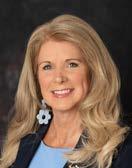
So, let’s say you’ve made a reasonable settlement offer, and the plaintiff’s attorney summarily rejects it. This is a violation of the Rules of Professional Conduct, and yet it happens all the time. The egotistical plaintiff’s attorneys want the multi-million-dollar verdict for their new billboards and are willing to take their chances at charming a jury, it really does not matter to them what the plaintiff wants.
So how to attack? When you have a strong defense, but a difficult and bullying plaintiff’s attorney, send them an Offer of Settlement pursuant to Tex. R. Civ.Pro. 167. If you have never utilized this little tool in our arsenal, I urge you to investigate it. Essentially, it provides that following a settlement offer (which can be sent to both the plaintiff’s attorney and the plaintiff, by the way, thus overcoming the situation where the attorney is not relaying offers to plaintiff) the plaintiff will be on the hook for defense costs, including attorney’s fees, which accrue from the time the offer is made, should a verdict be less than 80% of the offer.
What this does is put more skin in the game for plaintiff and his attorney. It is one thing to bully and bluster and demand millions of dollars. It is quite another to have to pay the fees and costs incurred by the other side. Consider the use of Rule 167 Offer of Settlement as some leverage when your case is strong, and your offer is fair.
In conclusion, I am advocating from a lofty place, idealistic even, that the defense bar “fight back” to re-establish a system where litigation is necessary but fair, and individuals are compensated for their injuries, thanks to the efforts of a skilled counselor. Let us put an end to certain practices which only serve to deceive a jury and pervert the goal of justice. And by all means, we need to curtail excessive verdicts and bullied settlements which only amount to giant paydays for plaintiff attorneys.
— Originally published in TADC
44 SUMMER 2023 USLAW MAGAZINE US LAW
Melissa Casey is a seasoned litigation attorney with an extensive background in personal injury and business litigation. She is a graduate of George Washington University, where she worked as an intern for Congressman John E. Porter, and DePaul University, College of Law.
Barclay Damon’s Gabrielle Figueroa, special counsel; Merrill Bergenfeld, office services coordinator; Sharon Brown, partner; and Carolyn Trespasz, associate, volunteered at a soup kitchen run by Coalition for the Homeless at St. Bartholomew’s Church in New York City. The team set up and served meals to members of the local community.
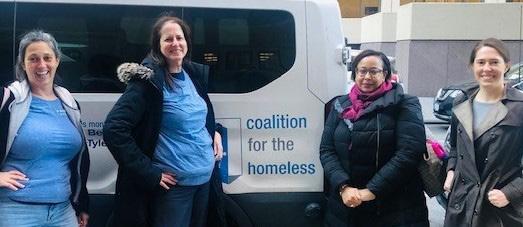
The Diversity Leadership Team in Barclay Damon’s Syracuse office organized a Community Day clean up to celebrate Earth Day in partnership with the Onondaga Parks Department. For the second consecutive year, attorneys and staff pitched in to beautify the Onondaga Creekwalk.
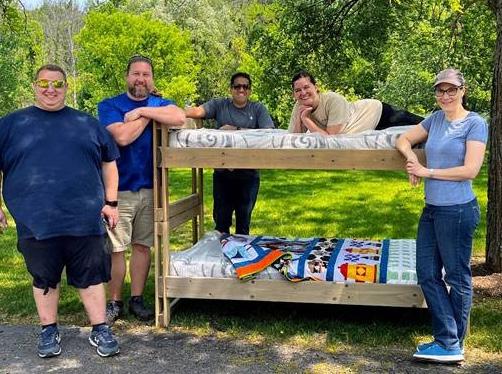
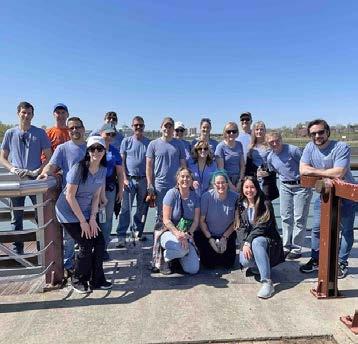
Baird Holm celebrates 150th anniversary

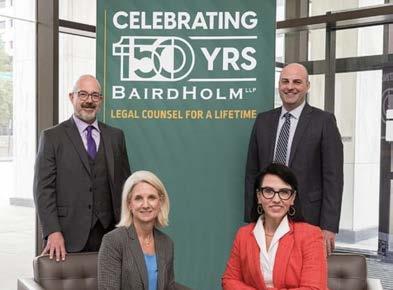
As the oldest law firm in Nebraska, Baird Holm LLP is celebrating its 150th anniversary this year. The theme for this milestone year is “Legal Counsel for a Lifetime,” which naturally complements the firm’s mission to provide its clients with superior advocacy and counseling solutions delivered by a highly reputable, specialized, innovative, and diverse legal team. At the time the firm was founded, Nebraska was just six years old and rapidly growing as the railroad brought more people to the Midwest. Over time, the firm went through a series of mergers, and while the firm’s name has changed through the years, what has been consistent is its commitment to Omaha and dedication to its clients.
“Our people have always been the defining factor that sets our firm apart from others. We are a partnership in the true sense of the word, not just a collection of attorneys practicing law independently,” said Baird Holm Managing Partner Chris Hedican. “This model differentiates us in that it is set up to promote attorney collaboration; we are a true team with a shared objective to achieve positive outcomes for our clients. This, coupled with the support of our excellent and committed staff, many of whom have made Baird Holm their career and retired from it, is the secret to our longevity and helps us provide value to the clients we serve,” said Hedican. Click here to learn more.

As part of Baird Holm’s 150th anniversary yearlong campaign, the firm has committed its time and talents to several nonprofits in the Omaha community. Baird Holm is grateful for the opportunity to support its client, the Heart Ministry Center, through weekly volunteer shifts (pictured left) during the month of June. Baird Holm attorneys and staff greatly value the experience of working with the center to provide support to those affected by poverty in Omaha.
Attorneys and staff from Barclay Damon’s Rochester office, including Sanjeev Devabhakthuni, partner; Alex Wever, litigation support specialist; Izzy Sanchez, technical support specialist; Patrick Burke, office manager; and Cassandra Rich, special counsel, took part in a bed-building event sponsored by Sleep in Heavenly Peace, a volunteer organization dedicated to building and delivering bunk beds to children and families in need.

Additional volunteer efforts positively impacting local communities include:
• Attorneys and staff from Barclay Damon’s Albany office took part in the local Law Day 5K, presented by the Albany County Bar Foundation to raise funds for its grant program, and other offices across Barclay Damon’s platform participated in additional local charitable runs and walks.
• Attorneys and staff from Barclay Damon’s Syracuse office took part in the annual Syracuse Heart Walk to support the American Heart Association. Participation in the event, which was held at the SRC Arena at Onondaga Community College, was organized by Brenda Colella , Barclay Damon’s Regulatory Practice Group leader, Regulatory Practice Area co-chair, and co-leader of the Renewable Energy and Energy Markets Teams.
US LAW SUMMER 2023 USLAW MAGAZINE 45
of USLAW
Franklin & Prokopik Principals John Handscomb and Bert Randall (pictured center with Maryland Governor Wes Moore) played integral roles in the development and passage of Maryland Senate Bill 71 and House Bill 800, sponsored by Senator Benjamin Brooks and Delegate Scott Phillips, respectively, regarding garnishment of child support arrearages in workers’ compensation cases. Given statutory ambiguity, there has been a longstanding debate regarding the proper amount that should be withheld from indemnity payments for workers’ compensation claimants that owe child support. These bills, signed into law by Governor Wes Moore on May 3, 2023, will go into effect on October 1, 2023, and will resolve this issue once and for all by permitting withholding amounts of up to 25% of the indemnity benefits due.
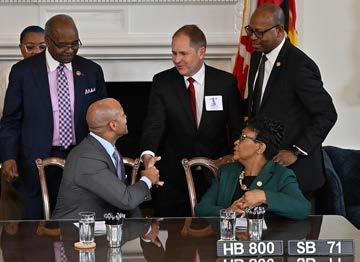
Franklin & Prokopik teammates enjoyed a day volunteering at the Baltimore Zoo.
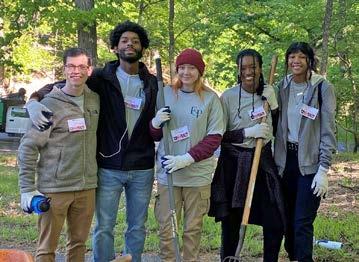
Hanson Bridgett LLP attorneys Jillian Ames, Natalie Kirkish, Jenny Dao, Mohammed Walizadeh, and Ellen Demson participated in a beach clean-up in Pacifica to celebrate Earth Day. The event was organized by the BASF Barristers Environment, Land Use and Real Estate Section, which Kirkish cochairs and Ames serves as a vice chair. Additional volunteer efforts include:
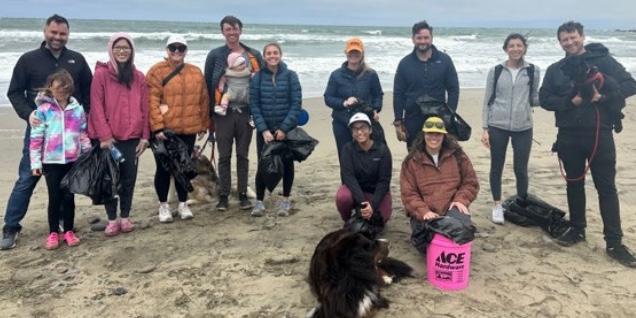
• Nicole Witt and Kristine Craig joined with Hanson Bridgett’s client West County Wastewater District for a community cleanup at Wildcat Canyon Park, where they cleared trash and participated in habitat restoration.
Noble Allen, partner at Hinckley Allen, was the commencement speaker at his former school, St. Johnsbury Academy, in St. Johnsbury, Vermont, on June 5, 2023.


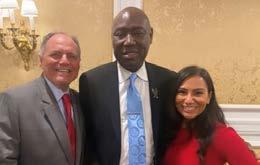

• The Walnut Creek office hosted a Day of Service with Jewish Family and Community Services. Volunteers prepared and packed hygiene kits for JFCS to distribute to newly arrived refugees and immigrants.
A team from Rivkin Radler, including Stu Gordon , Andrea Jones, Aurelia Sanchez, Catalina De La Hoz and Brian Ramdat, attended the ERASE Racism Gala, of which the firm was a sponsor. Civil rights attorney Benjamin Crump was the keynote speaker. The organization’s mission is “to expose forms of racial discrimination, advocate for laws and policies that eliminate racial disparities, increase understanding of how structural racism and segregation impact our communities and region, and engage the public in fostering equity and inclusion.”
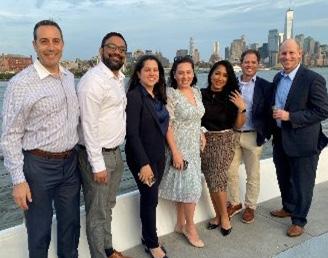
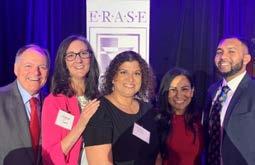
Rivkin Radler’s Sean Gorton (left) traveled to Scarsdale, New York, to volunteer for the Make-A-Wish Foundation’s Junior Board & Young Professional’s Golf Outing. The event was a smashing success and raised over $80,000 to support children struggling with critical illnesses.
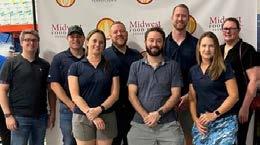
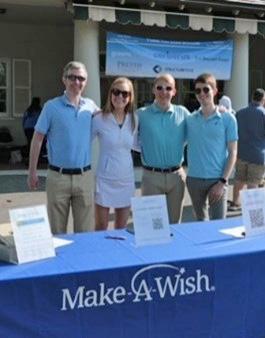
On May 16, Eric Santos of Rivkin Radler (left) served as a panelist on the Pipeline Diversity Initiative’s (PDI) program, “Career Opportunities in the Law,” on the “Private Practice/In House Counsel” panel. PDI is a program that the Hon. Kathie E. Davidson, Dean of the Judicial Institute, created for high school students in New York State to help them best position themselves for law school acceptance.

Several partners and associates attended Sail Into Spring on May 16 on behalf of Rivkin Radler LLP hosted by the Sky Rink at Chelsea Piers, the Benefit Committee and the Sky Rink Youth Scholarship Fund Board of Directors. The event honored recipients of the 2023 Good Skate Award and was a celebration of the Sky Rink’s Benefit Fund, which has awarded over $500,000 in scholarships for students. From left to right: Keith Grover, Sahil Sharma, Gloria Medina, Ana Parikh, Ivette Reyes, Eric Strober and Matthew Lampert.
As part of their 2023 associates outing, Pion Law associates volunteered their time at the Midwest Foodbank in Middletown, Pennsylvania, where they packaged various food items to be distributed to individuals in need. The group also was certified in CPR/AED through the American Red Cross. This continues a long tradition of giving back. Last year at their associates outing, the group handed out meal packages with the Greater Pittsburgh Food Bank. Pion Law is committed to both its clients and the community.

46 US LAW of USLAW
TO DELIVER®
DRIVEN
Moran Reeves & Conn partner Taylor Brewer served as the keynote speaker on the topic “Pro Bono Service and the Legal Community” at the University of Richmond School of Law Harry L. Carrico Center Pro Bono Certificate and Recognition Ceremony earlier this month. Moran Reeves & Conn is one of 12 firms that comprise Firms In Service, an association of the Greater Richmond Bar Foundation and representatives from the largest law offices in the Richmond area that focuses squarely on improving access to justice for their community.

2023 Women’s Connection in Vail, CO
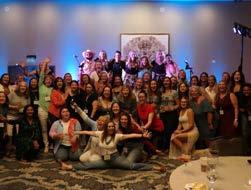

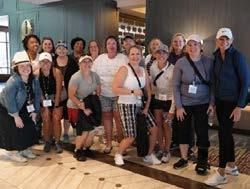


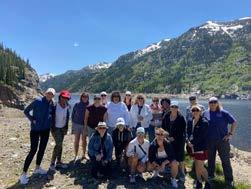
From the village to the water to the mountains, Vail offered a beautiful backdrop for afternoon excursions during the 2023 USLAW Women’s Connection. 2023 Women’s Connection in Vail was capped off with a closing concert by Dozzi, a dynamic trio of sisters on the country music scene.
Moran Reeves & Conn participated in The Virginia Bar Association Legal Food Frenzy and are proud to report they raised over $6,000 for FeedMore, feeding food-insecure neighbors in Central Virginia. The week of events was full of camaraderie and indeed some silliness, including the Pie in Your (Shareholder) Face competition, won (or lost?) by Eric Reeves

2023 Medical Law Forum

Moira Pietrowski of Roetzel & Andress in Ohio, immediate past chair of the Women’s Connection, with 2023 Women’s Connection keynote speaker Shailee Basnet, world-renowned mountaineer, motivational speaker and entrepreneur.
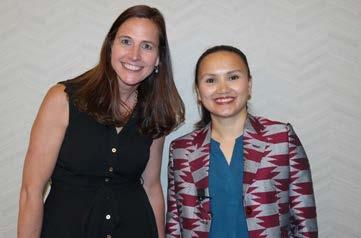
In July, Pierce Couch Hendrickson Baysinger & Green defended their title as the reigning champions of the Oklahoma County Bar Association Trivia Night. Team members (from left to right) were Robert Betts, Laura Hoehner, Addi Book , Matt McDevitt , and Jerrod Geiger
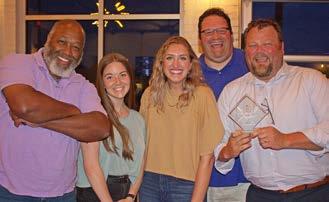
Medical Law Forum attendees enjoyed an evening at The Star, the 91-acre campus of the Dallas Cowboys World Headquarters and practice facility in Frisco, Texas, and the Sixth Floor Museum that chronicles the assassination and legacy of President John F. Kennedy.

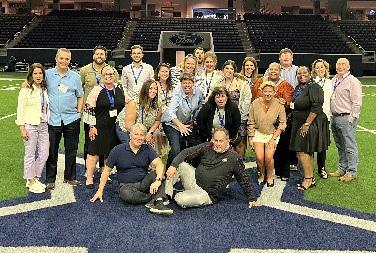
As part of its annual Food Frenzy two-week charitable drive, Williams Kastner employees, friends and family donated more than $17,000 to Food Lifeline, Washington state’s largest hunger relief organization, dedicated to ending hunger in Western Washington. Williams Kastner employees, including Managing Director Rod Umberger, Chief Operating Officer Amanda Teags, Director of HR Susan Williams, Seattle Office Manager Kari Bachle, IT Support Sandra Nokes, HR Coordinator Tiffany Jack, and Legal Assistant Rachel Nelson, also participated in their annual volunteer day at Food Lifeline warehouse. Each year, both attorneys and staff of the firm spend time at the warehouse to pack up food for local food banks and families. This year the team sorted and repacked over 10 tons of watermelon to help families in need.

US LAW 47 of USLAW
Faces from around the USLAW educational circuit...
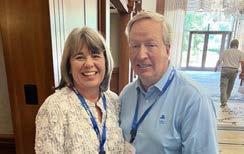

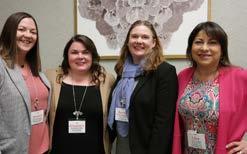
Throughout the year, USLAW members and clients lead facilitated discussions at USLAW events from coast to coast. Here are some of the recent leading voices.
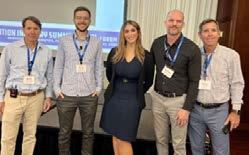

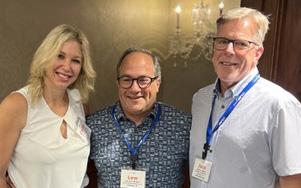
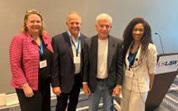

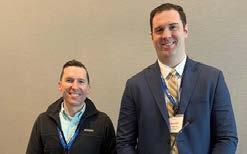
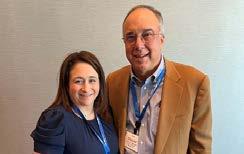
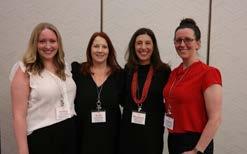
MERCH WITH A MISSION
48 US LAW of USLAW
Jessica Sanderson, Roetzel & Andress (Cleveland, OH); Alexandra C. Wells, Lashly & Baer, P.C. (St. Louis, MO); Sarah Thomas Pagels, Laffey, Leitner & Goode LLC (Milwaukee, WI); Lisa D. Angelo, Murchison & Cumming, LLP (Los Angeles, CA)
Hailey M. Hopper, Pierce Coach Hendrickson Baysinger & Green, L.L.P. (Oklahoma City, OK); Elizabeth Noonan, Adler Pollock & Sheehan, P.C. (Providence, RI); Meghan A. Litecky, Dysart Taylor (Kansas City, MO); Kelsey N.H. Mayo, Poyner Spruill LLP (Charlotte, NC)
Julie A. Brennan, Pion, Nerone, Girman, Winslow & Smith, P.C. (Pittsburgh, PA); Margot N. Wilensky, Connell Foley LLP (New York, NY); Alison H. Sausaman, Carr Allison (Jacksonville, FL)
Colleen E. Hastie, Traub Lieberman (Hawthorne, NY); Oscar J. Cabanas, Wicker Smith (Miami, FL)
Moses Suarez, Amundsen Davis LLC (Chicago, IL); Kevin McCarthy, Larson King, LLP (St. Paul, MN)
Jessica Sanderson, Roetzel & Andress (Cleveland, OH); Raymond E. Watts, Jr., Wicker Smith (Orlando, FL)
Left to right: Keely E. Duke, Duke Evett, PLLC (Boise, ID); Donn C. Alexander, Jones, Skelton & Hochuli. P.L. C. (Phoenix, AZ); invited speaker Jack E. McGehee; Shyrell A. Reed, Moran Reeves & Conn PC (Richmond, VA)
Pamela Bracher, Deputy General Counsel, American Trucking Associations; Thomas L. Oliver, II, Carr Allison (Birmingham, AL)
Clarice A. Spicker, Jones, Skelton & Hochuli, P.L.C. (Phoenix, AZ); Lew R.C. Bricker, Amundsen Davis LLC (Chicago, IL); Jack J. Laffey, Laffey, Leitner & Goode LLC (Milwaukee, WI)
Mark S. Barrow, Sweeny Wingate & Barrow, P.A. (Columbia, SC); Tamara B. Goorevitz, Franklin & Prokopik, P.C. (Baltimore, MD); John F. Wilcox, Jr., Dysart Taylor (Kansas City, MO)
Kurt M. Spengler, Wicker Smith (Orlando, FL); Nick Polavin, Ph.D., Senior Jury Consultant, IMS Consulting & Expert Services; Christina Marinakis, Ph.D.; Patrick E. Foppe, Lashly & Baer, P.C. (St. Louis, MO); Michael P. Sharp, Fee, Smith & Sharp, L.L.P. (Dallas, TX)
®
or gift item, 10% of your
purchase
students. You get exclusive USLAW merchandise while
an important cause. The USLAW NETWORK Foundation is a 501(c)(3) charitable organization
exclusively for charitable and educational purposes, including
scholarships to provide financial assistance to diverse law students
a legal education at an American Bar
U.S. law school. Shop
www.storeuslaw.org
WEAR IT WITH PRIDE!
Now when you purchase your favorite USLAW-logoed apparel, accessory, drinkware
total
supports scholarships for diverse law
also supporting
organized
funding
pursuing
Association-accredited
now at
®
American Legal Records offers many services to assist and simplify the discovery process. ALR is an industry leader in record procurement and duplication services with a personalized customer service staff for all your needs. Our management represents over 200 years of knowledge in our field assisting the legal and insurance communities.
Below are a few types of Records American Legal retrieves
Medical Insurance
Government (including SSA)
Employment
Scholastic
Military
Pharmacy
Our staff is fully HIPAA Compliant
We offer a full range of services for the record retrieval process including
Notices to all parties
Customized Billing including direct to Carrier/TPA or Client
Dedicated account reps
Expedited Service
Multi-Party Management
Online Secure Account access with live status updates of requests
Payment of Fee Advances/ Custodial Fees
Many other services customized to your needs
NATIONWIDE LEADERS IN DOCUMENT RETRIEVAL CLIENT SERVICES SECOND TO NONE P# (888)519-8565 F# (877)861-9459 info@americanlegalrecords.com www.americanlegalrecords.com
firms on the move
Kristin Matsko of Adler Pollock & Sheehan, P.C. has been appointed co-chair of the Rhode Island Bar Association’s (RIBA) Probate & Trust Committee for 2023-2024. The duty of this committee is to study and make recommendations on legislation, practices and procedure relating to Probate and Trust and to work toward the improvement of this area of law.
Daniel Procaccini of Adler Pollock & Sheehan, P.C. has been appointed to the board of directors of Inspiring Minds. This nonprofit organization empowers students to succeed and thrive in school and life by developing trusted relationships with community members who are knowledgeable of the culturally responsive, academic, and socio-emotional needs necessary for student success.

Barclay Damon was recognized as Corporate Member of the Month for April by the National Association of Specialty Pharmacy (NASP) in its Spotlight newsletter. Linda Clark, Barclay Damon’s Health Care Controversies Team leader, and Brad Gallagher, partner, are the lead attorneys for the firm’s relationship with NASP.
David Burch , a partner at Barclay Damon , was named to Law360’s 2023 Native American Editorial Advisory Board.
Chris Harrigan, a partner at Barclay Damon, has been named to consulting firm BTI’s Client Service All-Stars 2023 list, which is based on more than 350 in-depth, independent interviews with legal decision-makers.
Cassandra Rich, special counsel at Barclay Damon, has been elected president of the Monroe County Bar Association.
Melissa Zambri, co-team leader of Barclay Damon’s Health
Care and Health & Human Services Providers Teams, has been appointed to Albany Law School’s National Alumni Association Board.
Carr Allison (southern Mississippi) attorney Jenny T. Baker was sworn in as Mississippi State Bar president. Baker is based in Gulfport, Mississippi.
Coleman, Chavez & Associates, LLP receives MBE certification. The Supplier Clearinghouse for the Utility Supplier Diversity Program of the California Public Utilities Commission has certified Coleman, Chavez & Associates, LLP as a Minority Business Enterprise (MBE). Coleman, Chavez & Associates, LLP is a USLAW member firm exclusively for workers’ compensation work in California.
Flaherty Sensabaugh Bonasso PLLC attorney Thomas V. Flaherty has been named to the Lawyers & Leaders Class of 2023. Since 2017, West Virginia Executive magazine, in partnership with the West Virginia University College of Law, has been working to shine a light on lawyers who strive to do the best for their clients, communities, and fellow people. Flaherty has represented multiple Fortune 100 companies, three West Virginia governors, and four justices of the West Virginia Supreme Court, all in separate matters. In addition, he has cochaired the Campaign for Legal Aid in West Virginia and the Capital Campaign for the Ronald McDonald House.

50 SUMMER 2023 USLAW MAGAZINE US LAW
firms on the move
Hanson Bridgett LLP Managing Partner

Kristina Lawson has become Chair of the Board and Executive Committee of the Bay Area Council.
Maggie Ziemianek of Hanson Bridgett LLP was appointed to the California Lawyer Association’s Litigation Section Executive Committee. Her term will commence at the annual meeting in September.
John Cu of Hanson Bridgett LLP has been appointed as the cochair for the At-Large Alumni Initiatives Committee as part of the Executive Council for the Leadership Council on Legal Diversity (LCLD).
Lisa Staron, partner in the Trusts & Estates Group at Hinckley Allen, was recently elected president of the Estate and Business Planning Council of Hartford, Inc., for the 2023-2024 fiscal year.
Lawrence Han of Rivkin Radler was elected president of the Korean American Lawyers Association of Greater New York (KALAGNY) for a two-year term. KALAGNY is a professional membership organization of attorneys and law students engaged with the issues affecting New York’s Korean American community.
Rivkin Radler’s Gloria Medina has been accepted into the 11th class of the American Arbitration Association’s A. Leon Higginbotham, Jr. Fellows Program. This class of Higginbotham Fellows – which includes 20 up-and-coming legal professionals from groups traditionally underrepresented in the alternative dispute resolution (ADR) field – will receive intensive training on all aspects of ADR as well as resources, networking, and mentorship opportunities throughout the year.
John E. Tull III of Quattlebaum, Grooms & Tull PLLC in Arkansas was appointed to the Arkansas Freedom of Information Act (FOIA) Review Working Group by Arkansas Attorney General Tim Griffin. The bipartisan group includes members of the legal and press communities who will review FOIA and provide the attorney general’s office with recommendations on how to improve the law. Other members of the group include State Senator Breanne Davis; Ryan Owsley, Deputy Attorney General, Opinions Division; John Payne, Deputy Attorney General, Civil Litigation Division; State Representative David Ray; State Senator Clarke Tucker; and Ashley Kemp Wimberly, Executive Director of the Arkansas Press Association.
Poyner Spruill LLP Managing Partner Dan Cahill is now a Certified Mediator through the North Carolina Dispute Resolution Commission. Cahill devotes a portion of his practice to mediating cases. His legal practice is centered on complex commercial disputes. In addition to Cahill, Poyner Spruill partners Randy Adams, Tom Davis, and Kate Dewberry are also Superior Court Certified Mediators.
US LAW SUMMER 2023 USLAW MAGAZINE 51
(Continued)
successful RECENT USLAW LAW FIRM VERDICTS & transactions verdicts
Amundsen Davis LLC (Chicago, IL)
Risch, Hayes obtain dismissal of a class action
Jeff Risch and John Hayes of Amundsen Davis obtained dismissal of a class action Illinois Biometric Information Act (BIPA) complaint filed against a manufacturer for its alleged use of a biometric timekeeping system without following the requirements of BIPA. By moving for dismissal of the class’s claims, they were able to successfully convince the plaintiff’s counsel to dismiss the action without further litigation.
Connell Foley LLP (Roseland, NJ)
Connell Foley secures hard-won leaseback and Planning Board approval for ferry facility
NY Waterway (NYWW) has secured the City of Hoboken Planning Board’s unanimous approval to temporarily conduct ferry maintenance operations on the Hoboken waterfront, allowing for a lease between the city and NYWW to settle a condemnation action.
The ferry company, which carries thousands of passengers across the Hudson River each day, had sought approval to repurpose the former Union Dry Dock property on the Hoboken waterfront to add barges and other improvements to temporarily operate a ferry maintenance facility.
After evaluating alternative sites for the maintenance facility, NYWW attempted to relocate to the former Union Dry Dock property on Sinatra Drive in Hoboken, but the City of Hoboken has long planned a park along Hoboken’s waterfront and, as a result, the property was the subject of an eminent domain action filed by Hoboken. NYWW opposed the city’s lawsuit, and Connell Foley played a pivotal role in negotiating a settlement, which the Court approved, that allows NYWW to enter into a lease with Hoboken and to install minimal improvements to temporarily occupy a portion of the Sinatra Drive property for three years with the right to extend under certain circumstances for two additional years. As part of the settlement agreement, once NYWW obtains all approvals to temporarily relocate its maintenance facility to Hoboken, then the lease period commences for the temporary facility. NYWW will lease the Hoboken site while it obtains approvals to construct the new maintenance facility in Weehawken.
Connell Foley attorneys Kevin Coakley and Nicole Dory, with assistance from Herschel Rose, helped NYWW to secure a hard-won agreement with Mayor Ravi Bhalla’s office, allowing the ferry company to lease back - for as many as five years - the Sinatra Drive property so that NYWW can temporarily locate its maintenance and refueling operations for the cross-Hudson public ferry transportation system. The agreement allows NYWW to temporarily relocate these facilities while the city advances its own plans to construct a future maritime park.
Flaherty Sensabaugh Bonasso PLLC (Charleston, WV)
Flaherty Sensabaugh Bonasso attorneys obtain defense verdict in a medical negligence case
Flaherty Sensabaugh Bonasso PLLC attorneys Ted Martin and Amy Rothman Malone obtained a defense verdict in a medical negligence case following a three-day trial in the Circuit Court of Kanawha County, West Virginia. The plaintiff alleged that the defendant did not properly treat her post-operative hematoma, which developed following a Mohs surgery procedure, resulting in permanent discoloration of her face. The defense maintained that the patient was properly treated and counseled regarding the postoperative complication. After deliberating for two hours, the jury found in favor of the defendant.
Franklin & Prokopik, P.C. (Baltimore, MD)
F&P attorneys Arnsdorf and Rice obtain a favorable ruling from Maryland’s Appellate Court
In Winter 2023, Franklin & Prokopik principals Ralph Arnsdorf and Heather Rice obtained a favorable ruling from Maryland’s Appellate Court in a case resulting from a mass shooting that occurred at a warehouse in Aberdeen, Maryland. Maryland’s Appellate Court found no liability for the employer (a temp agency) or the landowner when an employee shot and killed several people at the workplace and then turned the gun on herself. The court found that the shooting was unforeseeable, and neither the employer nor the landowner could have avoided the danger the employee posed to the workplace. To read the entire article, click here.
On June 20, 2023, the Supreme Court of Mar yland denied the plaintiffs’ Petition for Grant of Cert to have the appeal heard in the highest appellate Court in Maryland and will not hear any further appeals regarding this case. The judgment obtained by Arnsdorf and Rice for their client will stand. To read the order, click here
Hanson Bridgett LLP (San Francisco, CA)
Hanson Bridgett secures victory in Anti-SLAPP motion against Marilyn Manson
After a year-long battle against Brian Warner (f/k/a Marilyn Manson), Hanson Bridgett LLP partner Maggie Ziemianek and associate Tom Rivera secured victory on the anti-SLAPP motion filed on behalf of their client Ashley Gore.
In her May 9, 2023, order, Judge Teresa Beaudet of the Los Angeles Superior Court granted Gore’s anti-SLAPP motion, as well as the anti-SLAPP motion filed by co-defendant Evan Rachel Wood (represented by separate counsel). The order strikes Warner’s defamation claim against the defendants in its entirety and portions of the intentional infliction of emotional distress claim. The Court agreed with the defendants that the challenged claims arose from protected conduct and that Warner failed to demonstrate that either defendant coerced or pressured anyone to make false accusations against him,
52 SUMMER 2023 USLAW MAGAZINE US LAW
A TRADITION OF LEGAL EXCELLENCE SINCE 1938
successful RECENT USLAW LAW FIRM VERDICTS & transactions
or that Gore made knowingly false statements about Warner. The order authorizes the defendants to seek attorneys’ fees from Warner.
“Needless to say, we are very happy with the Court’s thorough and thoughtful decision,” said Hanson Bridgett partner Maggie Ziemianek. “This is an example of the anti-SLAPP statute operating as intended: protecting litigants from meritless claims arising from their exercise of First Amendment rights.” Click here for additional details on this case.
Rivkin Radler LLP (Uniondale, NY)



Rivkin Team Secures Appellate Victory for Retailer Century 21
Rivkin Radler, led by David Grill, Evan Krinick and Evan Schieber, secured a significant appellate win on behalf of famed retail fashion chain Century 21, Inc.
Emerging from the pandemic, Centur y 21 publicly announced its comeback and plan to relaunch its famous flagship store in lower Manhattan. However, the building’s owner had a different agenda and sued Century 21, claiming that Century 21 had no further right to remain in the building citing the fact that the retail lease had expired. The landlord’s challenge focused on the interpretation and interplay of a series of agreements that governed Century 21’s occupancy rights at the building. Among the agreements was a document known as the “springing lease,” which, Century 21 contended, governed the retailer’s occupancy and “sprang to life” immediately upon the expiration of the lease. The landlord alleged that the “springing lease” never came into being and was extinguished by other subsequent agreements.
Five months after a spirited oral argument, the Appellate Division, First Department unanimously ruled, as argued by our team, that Century 21 was correct and that when the prior lease expired, the springing lease immediately came into effect.
The decision marks Rivkin Radler’s second victory in a long-standing battle over Century 21’s right to remain in its iconic flagship store. The victory also represents a major step in the post-pandemic revitalization of Lower Manhattan.
Wicker Smith (Central Florida)
Michael D’Lugo obtained Per Curiam Affirmance from the Florida Fourth District Court of Appeal in medical malpractice case Wicker Smith Orlando partner Michael D’Lugo recently obtained a Per Curiam Affirmance from the Florida Fourth District Court of Appeal.
The underlying case was a medical malpractice matter where the client hospital had admitted liability for a medication error during the resuscitation of an infant allegedly causing brain damage. Prior to trial, plaintiffs brought in out-of-state counsel, who tried to substitute experts in multiple fields at the last minute in place of those originally disclosed. The trial judge denied multiple motions by the plaintiffs on this issue, and the case was tried with the original experts.
Plaintiffs asked the jury for $72.5 million, and the jury ended up awarding $158,000. The verdict triggered an award for attorneys’ fees pursuant to a previously rejected proposal for settlement.
Plaintiffs filed the appeal based largely on the inability to bring in the new experts. Because the case had been referred to non-binding arbitration, the trial court would not allow the plaintiff to alter the playing field once the defendant hospital requested a trial de
novo. After hearing oral arguments, the appellate court accepted the trial court’s refusal to allow the substitution of experts and issued a Per Curiam Affirmance on July 27, 2023.
Wicker Smith (South Florida)
Complete defense verdicts in recent slip-and-fall, auto negligence cases
Wicker Smith Miami partners Jamie Baca and Vanessa Romero-Molina recently obtained a major defense verdict on behalf of a retail grocery chain in a slip-and-fall case in Miami-Dade County.
Plaintiff was a 56-year-old man with a prosthetic leg who allegedly slipped and fell in the store’s restroom due to water and paper on the ground at the entrance of the stall. Plaintiff further alleged that he saw a store employee come out of the stall, and the store, therefore, had notice of the dangerous condition. Plaintiff underwent a 3 level cervical disk replacement and a 2 level lumbar fusion, with medical bills in excess of $800,000. His attorney asked the jury for $22.3 million in closing argument. The defense argued that Plaintiff’s version of events was false and that he simply fell on his own. The jury, led by a 23-year-old foreperson, agreed and returned a verdict of no liability.
In a separate matter, Wicker Smith Fort Lauderdale partner Rob O’Malley and associate Amaia Sanz De Acedo recently obtained a defense verdict in an auto negligence case in Palm Beach County, Florida.
This was an admitted liability case involving a front-end collision. The plaintiff was a 50-year-old housekeeper who underwent an arthroscopy for her left knee and radiofrequency ablations to the cervical spine. She had recommendations for a total knee replacement and an ACDF. The medical bills were $80,000, with a life care plan of $350,000. Plaintiff asked the jury for just under one million dollars. The jury found no legal cause and came back with a complete defense verdict.
Williams Kastner (Seattle, WA)
Attorneys obtain defense verdicts for insurance, national retail clients
Williams Kastner attorneys Eliot Harris and Miles Stewart obtained a successful defense verdict in a seven-figure insurance coverage lawsuit saving the client $2 million. The trial team consisting of Eddy Silverman, Ashley Langley and Xavier Gardner obtained a defense verdict in Federal Court in a wrongful detention and discrimination lawsuit filed against a national retailer.
In another matter, attorneys Eddy Silverman and Xavier Gardner obtained summary judgment in favor of a national retailer in a premises liability lawsuit. And the Williams Kastner trial team consisting of Jeff Wells, Dan Brown and Allison Booker, obtained a defense jury verdict on behalf of their firm client in a claim brought under the Fair Credit Reporting Act alleging the client did not follow reasonable procedures to assure maximum possible accuracy of the consumer information furnished about the plaintiff.
US LAW SUMMER 2023 USLAW MAGAZINE 53
(Continued)
successful RECENT USLAW LAW FIRM VERDICTS & transactions
transactions
Barclay Damon LLP (Buffalo, NY)
Teams of attorneys help deliver landmark, megawatt deals
A team from Barclay Damon led by Sharon Brown and Melissa Bennett, co-chairs of the firm’s Public Finance Practice Area, closed the New York State Housing Finance Agency’s largest deal in its history with the issuance of $502,715,000 of tax-exempt bonds. The bonds will help develop approximately 2,230 affordable housing units for low- and moderate-income individuals and families throughout New York State. Sharon and Melissa received support from Carolyn Trespasz, associate; Leila Dwyer, associate; Jo-Ann Kilmer, municipal finance administrator; and Erin Kayser, senior legal assistant.
Ekin Senlet, Regulatory Practice Area co-chair; Brenda Colella, Regulatory Practice Group leader, Regulatory Practice Area co-chair, and co-leader of the Renewable Energy and Energy Markets Teams; and Emma Marshall, associate, led a Barclay Damon team that was instrumental in the completion of the 103.9-megawatt Number Three Wind Energy Center, owned by firm client Invenergy, in Lewis County, New York. Number Three Wind will deliver 7.5 million megawatt-hours of clean electricity to New Yorkers every year, helping the state meet its ambitious climate goals.
Hanson Bridgett LLP
(San
Francisco, CA)
Hanson Bridgett secures water rights for Ventura County and Ventura County Waterworks Districts 1 and 19
A team from Hanson Bridgett LLP successfully finalized a five-year effort to secure water rights for clients Ventura County and Ventura County Waterworks Districts 1 and 19. The team received a Final Decree for those water rights from the Santa Barbara Superior Court. All trials were held by Zoom with many witnesses and many documents supporting the water rights and the physical solution that the Court imposed to help achieve a sustainable yield for the Las Posas Basin.
“This was the first trial under the new Sustainable Groundwater Management Act and the expedited process for adjudication passed by the California Legislature in 2014,” said lead partner Michael Van Zandt. “There were more than 50 sets of attorneys involved in the case and thousands of claimants for the water rights. The trials lasted more than 30 days, with many hearings and motions. Both our team and our clients are very happy with the outcome of this very long and complex case.”
The Hanson Bridgett Team also helped draft the Watermaster regulations, which will be used to manage the water basin. All objections were overruled, and the team now waits to see whether the Non-Settling Parties will appeal.
The Hanson Bridgett team, led by partner Michael Van Zandt, included partner Nathan Metcalf, counsel Neil Bardack and senior counsel Sean Herman Click here for additional background on the case.
Lexia Attorneys, Ltd. (Helsinki, Finland)
Lexia attorneys help Pfeifer, the leading European wood industry company, acquire Pölkky
Attorneys from Lexia in Finland managed several recent successful transactions for their clients, including Pfeifer’s acquisition of Pölkky. Pfeifer is the leading European wood industry company. The Austrian Pfeifer Holding GmbH acquired the Finnish wood processing company Pölkky Oy. In the arrangements for the international acquisition, the Finnish Lexia Attorneys acted as Pfeifer’s partner. Large acquisitions always involve numerous complex areas that demand specialized expertise, necessitating legal services and financial and tax advice to ensure a successful and smooth transaction. Lexia served as Pfeifer’s comprehensive partner and successfully supported the execution of the acquisition, managing all necessary support through a single point of contact. Behind the scenes, Lexia worked with trusted partners acting as subcontractors, with Hill Audit Oy providing financial advice and Alder & Sound Oy handling tax matters. From the client’s perspective, however, the entire process was seamlessly managed through a single partner, Lexia. The transaction involved family-owned companies with a significant impact on decision-making culture and processes. Understanding their history and deeper motives was crucial to finding favorable solutions for all parties. Additionally, dealing with two different cultures in international trade required Lexia to act as an interpreter to ensure a successful acquisition. As a local operator in Northern Finland, Lexia’s strong knowledge of the region’s market and wood processing industry provided a solid foundation for the deal.
Pfeifer is a market leader in pallet blocks and shuttering panels, and it is also one of Europe’s largest producers of sawn timber, pellets, formwork beams, and glued laminated timber. The company has approximately 2,600 employees across its 13 locations in Austria, Germany, Czech Republic, and now in Finland. With the acquisition of Pölkky Oy, its former biggest competitor in Finland, the projected turnover is expected to increase to 1.4 billion Euros in 2023, ensuring profitable growth and development. This acquisition further strengthens Pfeifer’s position as one of Europe’s leading wood processing companies, enabling it to respond even more effectively to international competition.
Rivkin Radler LLP (Uniondale, NY) Kornblum and Camarda close $41.5 million purchase
On May 9, Rivkin Radler’s Yaron Kornblum, assisted by Ilana Camarda, closed a $41.5 million purchase of a luxury resort-style multi-unit residential apartment/townhouse complex in Grove City, Ohio. The firm’s client, the purchaser, consisted of a multi-TIC structure utilizing financing from Fannie Mae in the amount of $28.97 million, as well as 1031 funds and intricate investor funding.

54 SUMMER 2023 USLAW MAGAZINE US LAW
(Continued)

Diversity, Equity and Inclusion
USLAW hosts job fair for diverse law school students
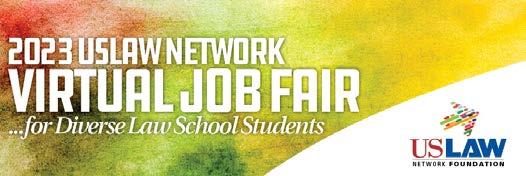
USLAW hosted its second annual virtual job fair for diverse law school students on Wednesday, August 2, 2023. The job fair connected 30 USLAW member firms with 690 registered candidates representing 102 ABA-accredited law schools in 35 states. Over 420 chats were conducted during the six-hour online platform, with hopefully more to come as candidates advance in the summer associate interview process. The event was open to rising 2L or 3L diverse law students seeking summer associate and/or full-time positions.
Janice Grubin, Barclay Damon’s Restructuring, Bankruptcy & Creditors’ Rights Practice Area co-chair and first vice president of the LGBT Bar of New York, was recognized in June by the local chapter of the National Diversity Council at its annual LGBTQ+ Unity Summit. Grubin received the LGBTQ+ Leadership Award from the Tri-State Chapter of the National Diversity Council in part for her work with the LGBT Bar of New York, where she holds multiple leadership positions. Barclay Damon partner Sharon Brown, pictured left, joined Grubin, center, at the event. To learn more about Janice’s extensive leadership initiatives within the LGBT Bar of New York, click here

In June, the Amundsen Davis Women’s Attorney Group hosted an interactive business development workshop, “Playing to Win: Turning Challenges into Opportunities,” focusing on differences in business development approaches, framework & strategy, and the specific challenges women face in business development and practical tools to overcome them. The group welcomed presenter Tasneem K. Khokha and GrowthPlay, who helped facilitate an amazing and insightful workshop.
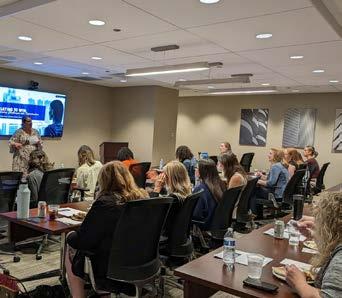
Baird Holm LLP has achieved Midsize Mansfield Certification. This certification was awarded to firms with 25 to 150 lawyers who completed a rigorous 18-month collaboration with Diversity Lab – from September 2021 to March 2023 – to track, measure, and achieve diversity in leadership. The certification measures whether midsize firms have considered at least 30% women lawyers, underrepresented racial and ethnic lawyers, LGBTQ+ lawyers, and lawyers with disabilities for leadership and governance roles, equity partner promotions, formal client pitches, lateral lawyer hiring, and more. The “Plus” status indicates that in addition to the consideration and transparency requirements, Baird Holm has successfully achieved 30% diverse representation in current leadership roles and pipeline activities.
Hinckley Allen Earns Mansfield Rule Certification
The Mansfield Certification, facilitated by Diversity Lab, is the result of a nearly twoyear certification process for Hinckley Allen that began in September 2021 and is part of the law firm’s ongoing commitment to promoting diversity, equity, and inclusion in the workplace. During the 18-month collaboration with Diversity Lab, Hinckley Allen tracked and measured diversity in leadership and hiring. This certification has become the gold standard by which law firms demonstrate their affirmative consideration of female attorneys, underrepresented racial and ethnic lawyers, LGBTQ+ lawyers, and attorneys with disabilities for hiring opportunities, leadership and governance roles, equity partner promotions, and formal client pitch opportunities.
“Everyone a Hinckley Allen is pleased to have earned Mansfield certification,” said Patrick A. Rogers, Managing Partner. “It is an important recognition that the firm is on the right track. We also recognize, however, that there is much more work to be done. Diversity, equity and inclusion continue to be a Firm priority and area for improvement. Accordingly, we are excited to be participating in the next iteration of the Mansfield program – and look forward to continuing our DEI progress.
56 SUMMER 2023 USLAW MAGAZINE US LAW
Diversity, Equity and Inclusion
Sharon Brown , Mitch Katz , and Zach Forward (pictured L-to-R), all partners at Barclay Damon, presented “A Conversation on Diversity in the Workplace With Barclay Damon” at Syracuse University College of Law. The Student Bar Association’s DEI Committee hosted the event, where Brown, Katz and Forward discussed Barclay Damon’s DEI initiatives with law school students as well as best practices for starting their legal careers and bridging the gap between law school and practice. Brown is Barclay Damon’s diversity partner and chair of the Diversity Partner Committee.
Hanson Bridgett recognized as one of the best law firms for women and diversity
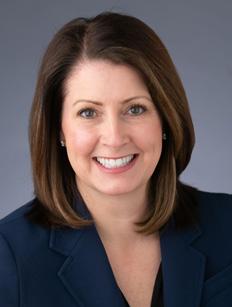
Hanson Bridgett LLP has once again been selected as one of the Best Law Firms for Women and Diversity by Seramount. This is the 14th consecutive year that the firm has been recognized on Seramount’s prestigious list.
“It is once again an honor to be in such phenomenal company,” said Hanson Bridgett Managing Partner Kristina Lawson. “All of the firms on this year’s Best Law Firms for Women and Diversity list are making a difference and leading the way by ensuring that the legal industry is welcoming, fair and inclusive for all.”
Seramount’s Best Law Firms for Women & Diversity recognizes firms that exemplify best practices in recruiting, retaining, promoting, and developing women lawyers and lawyers from underrepresented groups, including people of color.
Hanson Bridgett exceeded the overall firm numbers in many of the categories. For example, 47 percent of lawyers at Hanson Bridgett are women and 38 percent of lawyers are people of color. In terms of those hired in the last year, 74 percent of lawyers hired were people of color and 48 percent were women of color.
Hanson Bridgett also came in at #7 among all U.S. law firms on the AmLaw Diversity Scorecard, #5 on Law360’s best law firms for minority attorneys and #9 for minority equity partners.

Rivkin Radler’s Kang meets with NYC Commissioner of International Affairs
On July 18, Gene Kang of Rivkin Radler (third from left), along with other community leaders, met with the New York City Commissioner of International Affairs Edward Mermelstein, Deputy Commissioner Dilip Chauhan, and Winnie Greco, Special Advisor to the Mayor and Director of Asian Affairs, to discuss a variety of topics regarding New York City’s engagement with the Asian American community as well as opportunities for the city to partner with political leaders in Seoul, South Korea to bring more foreign investment and business into New York City. Plans were discussed for Mayor Eric Adams to host a ceremony in September to receive a delegation from Seoul and sign a resolution making Seoul and New York City “sister cities” for economic development purposes.
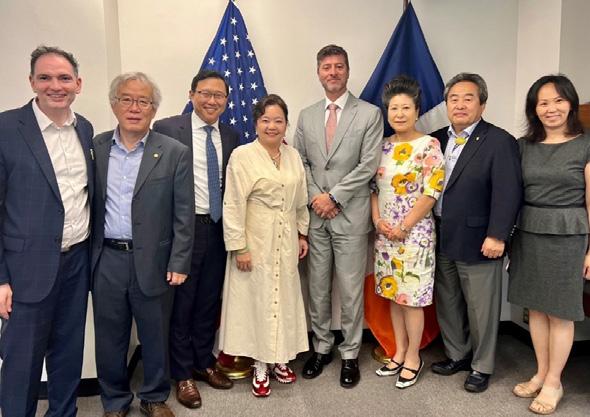
Santos serves on NY LEO Panel, HVHBA Board of Governors
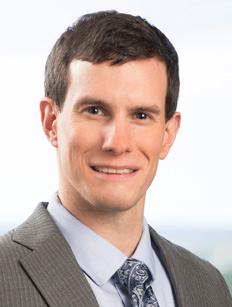
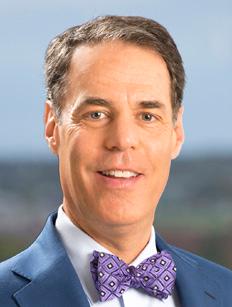
On June 28, Eric Santos (left) of Rivkin Radler served as a panelist for the NYS Judicial Institute’s NYS Legal Education Opportunity program (NY LEO), providing guidance to students seeking careers in the legal profession. NY LEO is designed to ensure a diverse legal community by promoting academic success in law school for individuals from groups historically underrepresented in the legal profession. The NY LEO Program is administered by the Honorable Kathie E. Davidson, Dean of the New York State Judicial Institute. Santos also serves on the 2023-2024 Board of Governors for the Hudson Valley Hispanic Bar Association.
Williams Kastner is a law firm sponsor of the Gregoire Fellows Program for the third year in a row. This program provides scholarships to diverse students at the University of Washington and Seattle University law schools. Williams Kastner hosted Gregoire Fellow Kalina Spasovska for five weeks as part of its Summer Associate program, where Spasovska was able to attend depositions and hearings, assist with research projects, and network with Williams Kastner attorneys and other summer associates within the legal community.
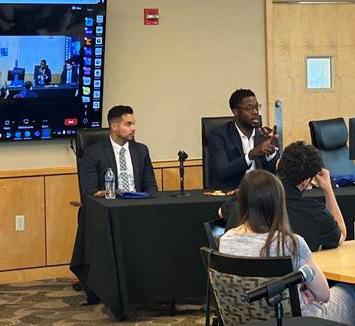
US LAW SUMMER 2023 USLAW MAGAZINE 57
Diversity, Equity and Inclusion
USLAW NETWORK announces the recipients of the 2023 USLAW NETWORK Law School Diversity Scholarship program. The scholarships are awarded to outstanding law school students from ABA-accredited law schools across the country. Each recipient receives $5,000 towards their law school tuition as well as an invitation to the Fall 2023 USLAW NETWORK Client Conference scheduled for October 5-7 in Dana Point, California.
The scholarship program was launched in 2022 as part of the USLAW NETWORK Foundation and its commitment to helping eligible, diverse law students who are in need of financial assistance to achieve their academic and professional dreams. Each recipient was selected, among 150 applicants, based on academic achievements and demonstrated commitment to issues of diversity, equity, inclusion, or social justice in their communities or within their academic career.
“We are honored to recognize the 10 incredible law students who are the recipients of the 2023 USLAW NETWORK Law School Diversity Scholarship,” said Noble F. Allen from Hinckley Allen in Connecticut and Chair of the USLAW Diversity Council. “The collective current achievements of this diverse group are truly outstanding. We are grateful to provide tuition assistance and look forward to providing professional connections with our USLAW member firms and community to expand and accelerate their careers now and in the future.”
The 2023 USLAW NETWORK Law School Diversity Scholarship recipients are:
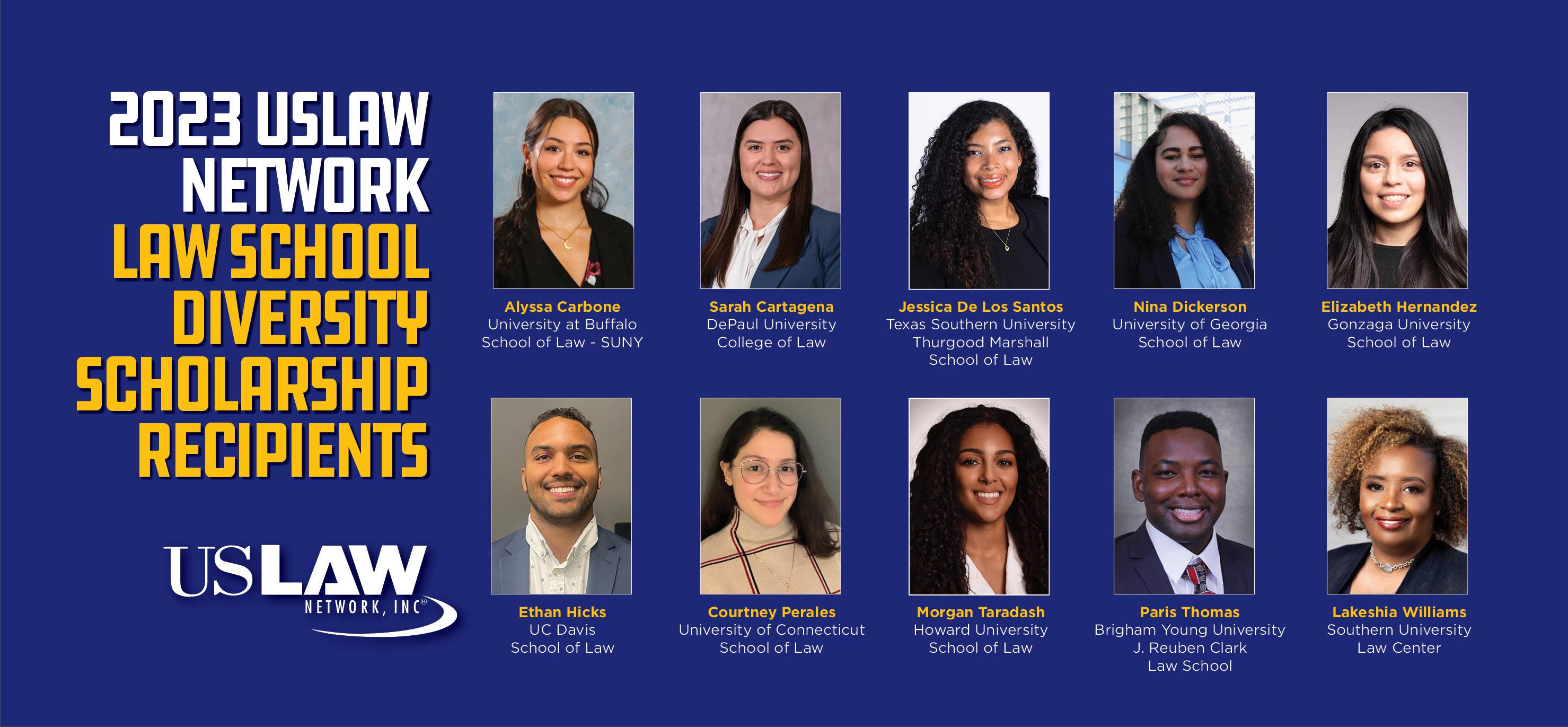
Alyssa Carbone – University at Buffalo School of Law – SUNY
Sarah Cartagena – DePaul University College of Law
Jessica De Los Santos – Texas Southern University
Thurgood Marshall School of Law
Nina Dickerson – University of Georgia School of Law
Elizabeth Hernandez – Gonzaga University School of Law
Ethan Hicks – UC Davis School of Law
Courtney Perales – University of Connecticut School of Law
Morgan Taradash – Howard University School of Law
Paris Thomas – Brigham Young University J. Reuben Clark Law School
Lakeshia Williams – Southern University Law Center
Click here to learn more about the Foundation or to donate to the Foundation and its important work.
58 SUMMER 2023 USLAW MAGAZINE US LAW
In his own words...
“Trey” B.G. Sandoval III Shareholder, MehaffyWeber
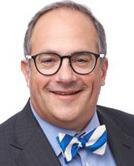

As national counsel for a Fortune 300 energy company, I have sent 30+ cases to USLAW NETWORK members, each with excellent results. Some are small matters that have been handled in short form, but some, like a recent case, are serious and produce significant work for our NETWORK members. Three years ago, I hired Jeff Choi from Synder Burnett Egerer in Santa Barbara, California, to be local counsel on a commercial case that was ultimately set for trial in July 2023. It was to be a 7-10 day trial, and the plaintiff was asking for seven figures. Fortunately, we settled this case, and it is a quintessential example of the benefit of USLAW NETWORK

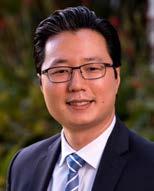
Jeff Choi and his team did a phenomenal job of collaborating with my team at MehaffyWeber. He ably handled motions and hearings, and he and I were to split the trial assignments. During this case’s tenure, several events required immediate attention and responses, and Jeff addressed them with sophistication. If I needed information, I had it and usually within an hour of my request. If I needed a call, he always made time. If I needed some type of work product for the client, he or his team prepared it, it was accurate, and I could rely on it. Jeff treated this case with as much attention as I did and often prioritized this case above some of his own to accommodate.
During the course of discovery, an important witness was identified who lived in Virginia. He was not under the control of the plaintiff and obtaining his testimony required a subpoena. We reached out to Dewayne Lonas of Moran Reeves & Conn in Richmond, Virginia, to assist us with preparing the pertinent motions and perfecting service on the witness. The time to accomplish this was very small, but Dewayne prioritized this request and went the extra mile for us to make sure the subpoena was prepared and served as soon as possible.

Finally, Jeff and I with my client prepared our corporate representative in Chicago. Lew Bricker of Amundsen Davis in Chicago accommodated our request to use a conference room for two days for this preparation during which Lew’s team onsite made sure we had everything we needed.
There was no point during this case that our NETWORK members did not prioritize and treat this case like their own. As a result, we were able to get this case properly worked up and ready for trial. The settlement was also attributable to this hard work, and, more importantly, our client was very happy with these efforts as well as the ultimate result.
US LAW SUMMER 2023 USLAW MAGAZINE 59
That is the essence of USLAW NETWORK.
pro bono spotlight
Barclay Damon’s McCabe receives pro bono award
Ray McCabe, a partner at Barclay Damon, received the Reverend A. Joseph Bissonette Pro Bono Award from the Bar Association of Erie County. McCabe was selected for this special recognition for his extraordinary commitment to providing pro bono legal services to those in need in the community. His nomination from the Erie County Bar Association Volunteer Lawyers Project, Inc. stated, “Ray is a committed, compassionate volunteer who believes pro bono is a natural part of practicing law. We are so fortunate to be associated with him and are thrilled that he plans to continue pro bono work for the remainder of his impactful career.”
Hanson Bridgett LLP in San Francisco participates in and receives honors for pro bono work




Hanson Bridgett LLP was honored with the Pro Bono Award from Legal Services for Children on June 1; Samir Abdelnour and Kristine Craig attended the Excellence in Pro Bono Awards Event in San Francisco to accept the award.
Hanson Bridgett was given a Volunteer Appreciation Award by The AIDS Legal Referral Panel, one of the firm’s pro bono partner organizations. The award recognized Hanson Bridgett for supporting the organization’s “Pro Bono Connections” Initiative, and Hanson Bridgett was the only law firm to receive this award at ALRP’s Volunteer Appreciation Party on April 19.
On May 9, Amanat Singh, Johanna Williams, Trevor Taniguchi, Trent Tanzi, Alexa Galloway, Jessilyn Ho, Lori Moody, Michelle Linney, Mina Turan, and Wilson Feng participated in a virtual pro bono clinic with The LGBT Asylum Project, working with clients to complete declarations in support of their asylum applications.
On June 1, the firm’s summer associates participated in a pro bono asylum clinic with Centro Legal de la Raza. Alan Bishop, Kristine Craig, Patrick Burns, Tammy Vu, Michael Turner, and Laurel O’Connor worked with the summer associates to help clients complete their asylum applications.
On July 24, Hanson Bridgett partnered with Opening Doors in Sacramento for a pro bono legal clinic to assist Afghan evacuees in the Sacramento region who are eligible for temporary protected status. This was the firm’s second pro bono clinic with Opening Doors in Sacramento this year, organized by Wiemond Wu
Lexia promotes innovation and supports start-ups through pro bono work in Finland


Lexia’s Growth practice, focusing on startups and growth companies, has helped several Finnish innovations and startups succeed by providing pro bono legal support. For instance, Lexia has assisted at least two of its startup clients in obtaining Business Finland’s Deep Tech Accelerator grant (€400,000) and one million euros in funding. These grants are awarded to a maximum of 10 companies throughout Finland. The companies will be announced in August 2023.
In another pro bono success, Ukrainian startup incubator Ukrainian Future organized an innovation competition for promising Ukrainian-origin startups. Lexia provided assistance and mentorship to multiple winning companies, receiving much appreciation from the promising Ukrainian startups. Lexia Growth practice leader Marko Moilanen helped Ukrainian companies pro bono.
60 SUMMER 2023 USLAW MAGAZINE US LAW
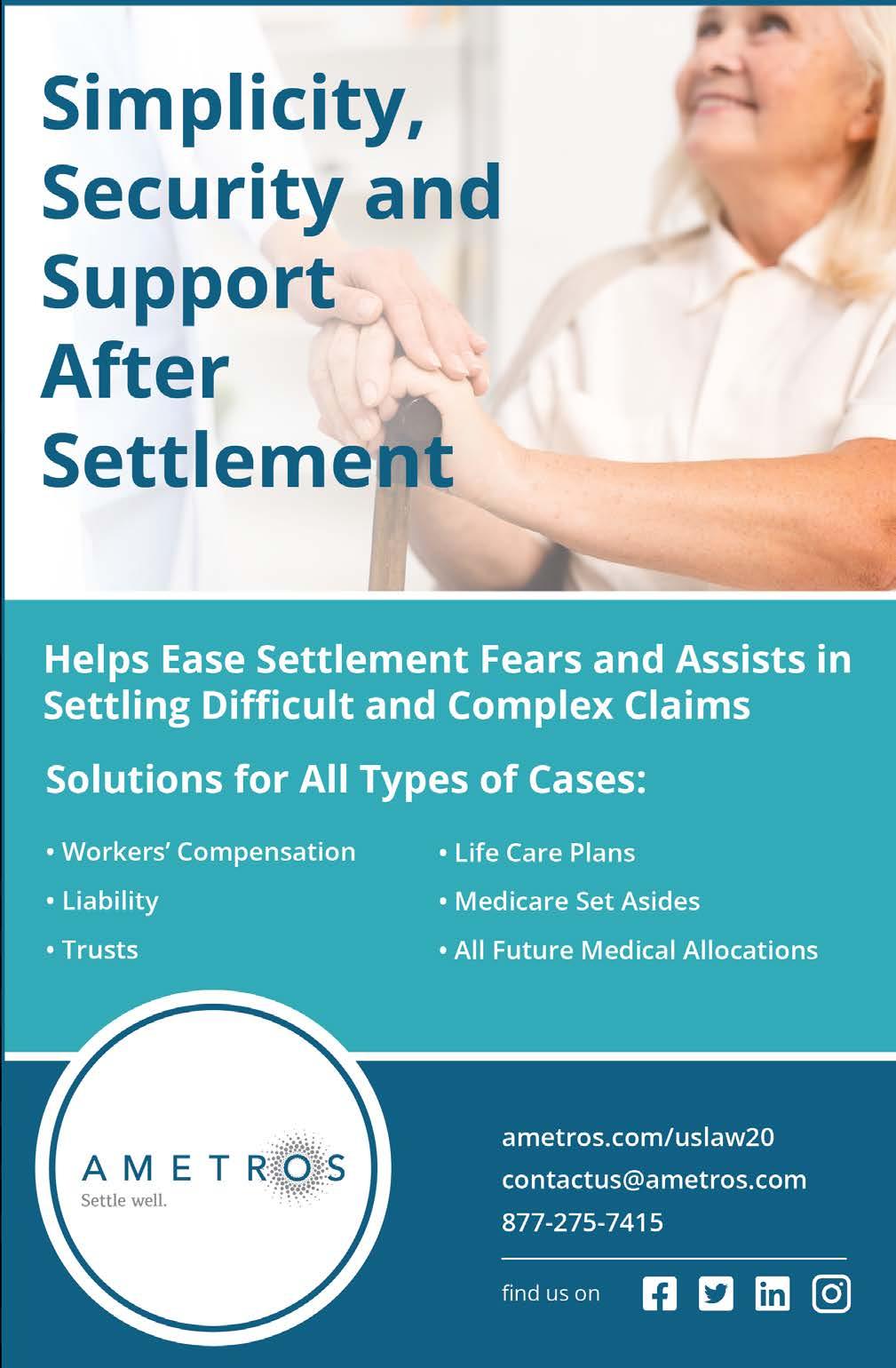
about uslaw network
2001. The Start of Something Better.
Mega-firms...big, impersonal bastions of legal tradition, encumbered by bureaucracy and often slow to react. The need for an alternative was obvious. A vision of a network of smaller, regionally based, independent firms with the capability to respond quickly, efficiently and economically to client needs from Atlantic City to Pacific Grove was born. In its infancy, it was little more than a possibility, discussed around a small table and dreamed about by a handful of visionaries. But the idea proved too good to leave on the drawing board. Instead, with the support of some of the country’s brightest legal minds, USLAW NETWORK became a reality.
Fast forward to today.
The commitment remains the same as originally envisioned. To provide the highest quality legal representation and seamless cross-jurisdictional service to major corporations, insurance carriers, and to both large and small businesses alike, through a network of professional, innovative law firms dedicated to their client’s legal success. Now as a diverse network with more than 6,000 attorneys from nearly 100 independent, full practice firms across the U.S., Canada, Latin America and Asia, and with affiliations with TELFA in Europe, USLAW NETWORK remains a responsive, agile legal alternative to the mega-firms.
Home Field Advantage.
USLAW NETWORK offers what it calls The Home Field Advantage which comes from knowing and understanding the venue in a way that allows a competitive advantage – a truism in both sports and business. Jurisdictional awareness is a key ingredient to successfully operating throughout the United States and abroad. Knowing the local rules, the judge, and the local business and legal environment provides our firms’ clients this advantage. The strength and power of an international presence combined with the understanding of a respected local firm makes for a winning line-up.
A Legal Network for Purchasers of Legal Services.
USLAW NETWORK firms go way beyond providing quality legal services to their clients. Unlike other legal networks, USLAW is organized around client expectations, not around the member law firms. Clients receive ongoing educational opportunities, online resources, including webinars, jurisdictional updates, and resource libraries. We also pro-
vide USLAW Magazine, compendia of law, as well as an annual membership directory. To ensure our goals are the same as the clients our member firms serve, our Client Leadership Council and Practice Group Client Advisors are directly involved in the development of our programs and services. This communication pipeline is vital to our success and allows us to better monitor and meet client needs and expectations.
USLAW IN EUROPE.
Just as legal issues seldom follow state borders, they often extend beyond U.S. boundaries as well. In 2007, USLAW established a relationship with the TransEuropean Law Firms Alliance (TELFA), a network of more than 20 independent law firms representing more than 1,000 lawyers through Europe to further our service and reach.
How USLAW NETWORK Membership is Determined.
Firms are admitted to the NETWORK by invitation only and only after they are fully vetted through a rigorous review process. Many firms have been reviewed over the years, but only a small percentage were eventually invited to join. The search for quality member firms is a continuous and ongoing effort. Firms admitted must possess broad commercial legal capabilities and have substantial litigation and trial experience. In addition, USLAW NETWORK members must subscribe to a high level of service standards and are continuously evaluated to ensure these standards of quality and expertise are met.
USLAW in Review.
• All vetted firms with demonstrated, robust practices and specialties
• Organized around client expectations
• Efficient use of legal budgets, providing maximum return on legal services investments
• Seamless, cross-jurisdictional service
• Responsive and flexible
• Multitude of educational opportunities and online resources
• Team approach to legal services
The USLAW Success Story.
The reality of our success is simple: we succeed because our member firms’ clients succeed. Our member firms provide high-quality legal results through the efficient use of legal budgets. We provide cross-jurisdictional services eliminating the time and expense of securing adequate representation in different regions. We provide trusted and experienced specialists quickly.
When a difficult legal matter emerges –whether it’s in a single jurisdiction, nationwide or internationally – USLAW is there.
For more information, please contact Roger M. Yaffe, USLAW CEO, at (800) 231-9110 or roger@uslaw.org ®
62 SUMMER 2023 USLAW MAGAZINE US LAW
2023 membership roster
ALABAMA | BIRMINGHAM
Carr Allison
Charles F. Carr (251) 626-9340 ccarr@carrallison.com
ARIZONA | PHOENIX
Jones, Skelton & Hochuli, P.L.C.
Phillip H. Stanfield (602) 263-1745 pstanfield@jshfirm.com
ARKANSAS | LITTLE ROCK
Quattlebaum, Grooms & Tull PLLC
John E. Tull, III (501) 379-1705 jtull@qgtlaw.com
CALIFORNIA | LOS ANGELES
Murchison & Cumming LLP
Dan L. Longo (714) 953-2244 dlongo@murchisonlaw.com
CALIFORNIA | SAN DIEGO
Klinedinst PC
John D. Klinedinst (619) 239-8131 jklinedinst@klinedinstlaw.com
CALIFORNIA | SAN FRANCISCO
Hanson Bridgett LLP
Merton A. Howard (415) 995-5033 mhoward@hansonbridgett.com
CALIFORNIA | SANTA BARBARA
Snyder Burnett Egerer, LLP
Barry Clifford Snyder (805) 683-7750 bsnyder@sbelaw.com
CALIFORNIA | ROSEVILLE
Coleman, Chavez & Associates, LLP
– For Workers’ Compensation Only
Richard Chavez (916) 787-2300 rchavez@cca-law.com
COLORADO | DENVER
Lewis Roca
Jessica L. Fuller (303) 628-9527 Jfuller@lewisroca.com
CONNECTICUT | HARTFORD
Hinckley Allen
Noble F. Allen (860) 725-6237 nallen@hinckleyallen.com
DELAWARE | WILMINGTON
Cooch and Taylor P.A.
C. Scott Reese (302) 984-3811 sreese@coochtaylor.com
FLORIDA | CENTRAL FLORIDA
Wicker Smith
Richards H. Ford (407) 843-3939 rford@wickersmith.com
FLORIDA | SOUTH FLORIDA
Wicker Smith Nicholas E. Christin (305) 448-3939 nchristin@wickersmith.com
FLORIDA | NORTHWEST FLORIDA
Carr Allison
Christopher Barkas (850) 222-2107 cbarkas@carrallison.com
HAWAII | HONOLULU
Goodsill Anderson Quinn & Stifel LLP
Edmund K. Saffery (808) 547-5736 esaffery@goodsill.com
IDAHO | BOISE
Duke Evett, PLLC
Keely E. Duke (208) 342-3310 ked@dukeevett.com
ILLINOIS | CHICAGO
Amundsen Davis LLC
Lew R.C. Bricker (312) 894-3224 lbricker@amundsendavislaw.com
IOWA | CEDAR RAPIDS
Simmons Perrine Moyer Bergman PLC
Kevin J. Visser (319) 366-7641 kvisser@spmblaw.com
KANSAS/WESTERN MISSOURI | KANSAS CITY
Dysart Taylor
Amanda P. Ketchum (816) 714-3066 aketchum@dysarttaylor.com
LOUISIANA | NEW ORLEANS
McCranie, Sistrunk, Anzelmo, Hardy McDaniel & Welch LLC
Keith W. McDaniel (504) 846-8330 kmcdaniel@mcsalaw.com
MAINE | PORTLAND
Richardson, Whitman, Large & Badger
Elizabeth G. Stouder (207) 774-7474 estouder@rwlb.com
MARYLAND | BALTIMORE
Franklin & Prokopik, PC
Albert B. Randall, Jr. (410) 230-3622 arandall@fandpnet.com
MASSACHUSETTS | BOSTON Rubin and Rudman LLP
John J. McGivney. (617) 330-7000 jmcgivney@rubinrudman.com
MINNESOTA | ST. PAUL
Larson • King, LLP
Mark A. Solheim (651) 312-6503 msolheim@larsonking.com
MISSISSIPPI | GULFPORT
Carr Allison Douglas Bagwell (228) 864-1060 dbagwell@carrallison.com
MISSISSIPPI | RIDGELAND
Copeland, Cook, Taylor & Bush, P.A. James R. Moore, Jr. (601) 427-1301 jmoore@cctb.com
MISSOURI | ST. LOUIS Lashly & Baer, P.C. Stephen L. Beimdiek (314) 436-8303 sbeim@lashlybaer.com
MONTANA | GREAT FALLS Davis, Hatley, Haffeman & Tighe, P.C.
Maxon R. Davis (406) 761-5243 max.davis@dhhtlaw.com
NEBRASKA | OMAHA
Baird Holm LLP
Jennifer D. Tricker (402) 636-8348 jtricker@bairdholm.com
NEVADA | LAS VEGAS
Thorndal Armstrong Delk
Balkenbush & Eisinger
Brian K. Terry (702) 366-0622 bkt@thorndal.com
NEW JERSEY | ROSELAND
Connell Foley LLP
Kevin R. Gardner (973) 840-2415 kgardner@connellfoley.com
NEW MEXICO | ALBUQUERQUE
Modrall Sperling
Jennifer G. Anderson (505) 848-1809 Jennifer.Anderson@modrall.com
NEW YORK | BUFFALO
Barclay Damon LLP
Peter S. Marlette (716) 858-3763 pmarlette@barclaydamon.com
NEW YORK | HAWTHORNE
Traub Lieberman
Stephen D. Straus (914) 586-7005 sstraus@tlsslaw.com
NEW YORK | UNIONDALE
Rivkin Radler LLP
David S. Wilck (516) 357-3347 David.Wilck@rivkin.com
NORTH CAROLINA | RALEIGH
Poyner Spruill LLP
Deborah E. Sperati (252) 972-7095 dsperati@poynerspruill.com
NORTH DAKOTA | DICKINSON
Ebeltoft . Sickler . Lawyers PLLC
Randall N. Sickler (701) 225-5297 rsickler@ndlaw.com
OHIO | CLEVELAND
Roetzel & Andress
Bradley A. Wright (330) 849-6629 bwright@ralaw.com
OKLAHOMA | OKLAHOMA CITY
Pierce Couch Hendrickson
Baysinger & Green, L.L.P.
Gerald P. Green (405) 552-5271 jgreen@piercecouch.com
OREGON | PORTLAND
Williams Kastner Thomas A. Ped (503) 944-6988 tped@williamskastner.com
PENNSYLVANIA | PHILADELPHIA
Sweeney & Sheehan, P.C.
J. Michael Kunsch (215) 963-2481 michael.kunsch@sweeneyfirm.com
PENNSYLVANIA | PITTSBURGH
Pion, Nerone, Girman, Winslow & Smith, P.C.
John T. Pion (412) 281-2288 jpion@pionlaw.com
RHODE ISLAND | PROVIDENCE
Adler Pollock & Sheehan P.C.
Richard R. Beretta, Jr. (401) 427-6228 rberetta@apslaw.com
SOUTH CAROLINA | COLUMBIA
Sweeny, Wingate & Barrow, P.A. Mark S. Barrow (803) 256-2233 msb@swblaw.com
SOUTH DAKOTA | PIERRE
Riter Rogers, LLP Robert C. Riter (605) 224-5825 r.riter@riterlaw.com
TENNESSEE | MEMPHIS
Martin, Tate, Morrow & Marston, P.C. Lee L. Piovarcy (901) 522-9000 lpiovarcy@martintate.com
TEXAS | DALLAS
Fee, Smith & Sharp, L.L.P.
Michael P. Sharp (972) 980-3255 msharp@feesmith.com
TEXAS | HOUSTON
MehaffyWeber
Barbara J. Barron (713) 655-1200 BarbaraBarron@mehaffyweber.com
UTAH | SALT LAKE CITY
Strong & Hanni, PC
Stephen J. Trayner (801) 323-2011 strayner@strongandhanni.com
VIRGINIA | RICHMOND
Moran Reeves & Conn PC
C. Dewayne Lonas (804) 864-4820 dlonas@moranreevesconn.com
WASHINGTON | SEATTLE
Williams Kastner
Rodney L. Umberger (206) 628-2421 rumberger@williamskastner.com
WEST VIRGINIA | CHARLESTON
Flaherty Sensabaugh Bonasso PLLC
Michael Bonasso (304) 347-4259 mbonasso@flahertylegal.com
WISCONSIN | MILWAUKEE
Laffey, Leitner & Goode LLC
Jack Laffey (414) 312-7105 jlaffey@llgmke.com
WYOMING | CASPER
Williams, Porter, Day and Neville PC
Scott E. Ortiz (307) 265-0700 sortiz@wpdn.net
USLAW INTERNATIONAL
ARGENTINA | BUENOS AIRES
Barreiro, Olivas, De Luca, Jaca & Nicastro
Nicolás Jaca Otaño (54 11) 4814-1746 njaca@bodlegal.com
BRAZIL | SÃO PAULO
Mundie e Advogados
Rodolpho Protasio (55 11) 3040-2923 rofp@mundie.com
CANADA | ONTARIO | OTTAWA
Kelly Santini
Lisa Langevin (613) 238-6321 ext 276 llangevin@kellysantini.com
CANADA | QUEBEC | MONTREAL
Therrien Couture Joli-Coeur
Douglas W. Clarke (450) 462-8555 douglas.clarke@groupetcj.ca
CHINA | SHANGHAI
Duan&Duan
George Wang 8621 6219 1103 george@duanduan.com
MEXICO | MEXICO CITY
EC Rubio
René Mauricio Alva +52 55 5251 5023 ralva@ecrubio.com
TELFA
BELGIUM
CEW & Partners
Charles Price (+32 2) 534 20 20 Charles.price@cew-law.be
CYPRUS
Demetrios A. Demetriades LLC
Demetrios A. Demetriades +357 22 769 000 dadlaw@dadlaw.com.cy
CZECH REPUBLIC
Vyskocil, Kroslak & spol., Advocates and Patent Attorneys
Jiri Spousta (00 420) 224 819 133 spousta@akvk.cz
US LAW SUMMER 2023 USLAW MAGAZINE 63
DENMARK Lund Elmer Sandager Jacob Roesen (+45 33 300 268) jro@les.dk ENGLAND Wedlake Bell LLP Martin Arnold +44(0)20 7395 3186 marnold@wedlakebell.com ESTONIA • LATVIA
LEXTAL Tallinn|Riga|Vilnius Lina SiksniuteVaitiekuniene (+370) 5 210 27 33 lina@lextal.lt FINLAND Lexia Attorneys Ltd. Markus Myhrberg +358 10 4244200 markus.myhrberg@lexia.fi FRANCE Delsol Avocats Emmanuel Kaeppelin +33(0)4 72 10 20 30 ekaeppelin@delsolavocats.com GERMANY Buse Jasper Hagenberg +49 30 327942 0 hagenberg@buse.de GREECE Corina Fassouli-Grafanaki & Associates Law Firm Korina FassouliGrafanaki (+30) 210-3628512 korina.grafanaki@lawofmf.gr HUNGARY Bihary Balassa & Partners Attorneys at Law Phone +36 1 391 44 91 IRELAND Kane Tuohy Solicitors Hugh Kane..................(+353) 1 6722233 hkane@kanetuohy.ie ITALY LEGALITAX Studio Legale e Tributario Alessandro Polettini +39 049 877 58 11 alessandro.polettini@legalitax.it LUXEMBOURG Tabery & Wauthier Véronique Wauthier (00352) 251 51 51 avocats@tabery.eu MALTA EMD Dr. Italo Ellul +356 2123 3005 iellul@emd.com.mt NETHERLANDS Dirkzwager Karen A. Verkerk +31 26 365 55 57 Verkerk@dirkzwager.nl NORWAY Advokatfirmaet Sverdrup DA Tom Eivind Haug +47 90653609 haug@sverdruplaw.no POLAND GWW Aldona Leszczyńska -Mikulska..... .. +48 22 212 00 00 warszawa@gww.pl PORTUGAL Carvalho, Matias & Associados Antonio Alfaia de Carvalho (351) 21 8855440 acarvalho@cmasa.pt SLOVAKIA Alianciaadvokátov Gerta Sámelová Flassiková +421 2 57101313 flassikova@aliancia.sk SPAIN Adarve Abogados SLP Juan José García +34 91 591 30 60 Juanjose.garcia@adarve.com
Wesslau Söderqvist Advokatbyrå Phone +46 8 407 88 00 SWITZERLAND Meyerlustenberger Lachenal Nadine von Büren-Maier +41 22 737 10 00 nadine.vonburen-maier@mll-legal.com
• LITHUANIA
SWEDEN
the complete uslaw sourcebook

USLAW NETWORK offers legal decision makers a variety of complimentary products and services to assist them with their day-to-day operation and management of legal issues. USLAW Client Resources provide information regarding each resource that is available. We encourage you to review these and take advantage of those that could benefit you and your company. For additional information, contact Roger M. Yaffe, USLAW CEO, at roger@uslaw.org or (800) 231-9110, ext. 1.
USLAW is continually seeking to ensure that your legal outcomes are successful and seamless. We hope that these resources can assist you. Please don’t hesitate to send us input on your experience with any of the USLAW client resources products or services listed as well as ideas for the future that would benefit you and your colleagues.

VIRTUAL OFFERINGS
USLAW has many ways to help members virtually connect with their clients. From USLAW Panel Counsel Virtual Meetings to exclusive social and networking opportunities to small virtual roundtable events, industry leaders and legal decision-makers have direct access to attorneys across the NETWORK to support their various legal needs.

EDUCATION

It’s no secret – USLAW can host a great event. We are very proud of the timely industry-leading interactive roundtable discussions at our semi-annual client conferences, forums and client exchanges. Reaching from national to more localized offerings, USLAW member attorneys and the clients they serve meet throughout the year at USLAW-hosted events and at many legal industry conferences. USLAW also offers industry and practice group-focused virtual programming. CLE accreditation is provided for most USLAW educational offerings.
USLAW NETWORK undoubtedly has some of the most knowledgeable attorneys in the world, but did you know that we also have the most valuable corporate partners in the legal profession? Don’t miss out on an opportunity to better your legal game plan by taking advantage of our corporate partners’ expertise. Areas of expertise include forensic engineering, legal visualization services, jury consultation, courtroom technology, forensic accounting, record retrieval, structured settlements, future medical fund management, and investigation.
A TEAM OF EXPERTS
64 SUMMER 2023 USLAW MAGAZINE US LAW
all 2021 USlaw networkClientConference SEPTEMBER23-25,2021 oTHE BROADMOOR COLORADOSPRINGS,COLORADO USLAW NETWORK • TWENTIETH ANNIVERSARY 2001 2021 • CLIENT ClientConference spring 2022 uslaw network March 17-19, 2022 Ritz-Carlton Amelia Island, florida ® CLIENT
LAWMOBILE

We are pleased to offer a completely customizable one-stop educational program that will deliver information on today’s trending topics that are applicable and focused solely on your business. We focus on specific markets where you do business and utilize a team of attorneys to share relevant jurisdictional knowledge important to your business’ success. Whether it is a one-hour lunch and learn, half-day intensive program or simply an informal meeting discussing a specific legal matter, USLAW will structure the opportunity to your requirements – all at no cost to your company.
COMPENDIA OF LAW
USLAW regularly produces new and updates existing Compendia providing multi-state resources that permit users to easily access state common and statutory law. Compendia are easily sourced on a state-by-state basis and are developed by the member firms of USLAW. Some of the current compendia include: Retail, Spoliation of Evidence, Transportation, Construction Law, Workers’ Compensation, Surveillance, Offer of Judgment, Employee Rights on Initial Medical Treatment, and a National Compendium addressing issues that arise prior to the commencement of litigation through trial and on to appeal. Visit the Client Toolkit section of uslaw.org for the complete USLAW compendium library.


STATE JUDICIAL PROFILES BY COUNTY
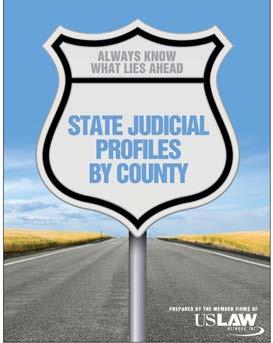
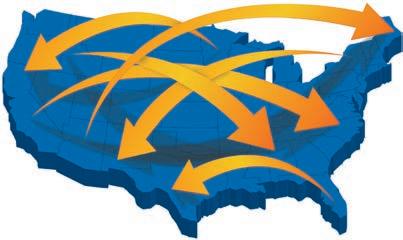
Jurisdictional awareness of the court and juries on a county-by-county basis is a key ingredient to successfully navigating legal challenges throughout the United States. Knowing the local rules, the judge, and the local business and legal environment provides a unique competitive advantage. In order to best serve clients, USLAW NETWORK offers a judicial profile that identifies counties as Conservative, Moderate or Liberal and thus provides you an important Home Field Advantage.
USLAW MAGAZINE
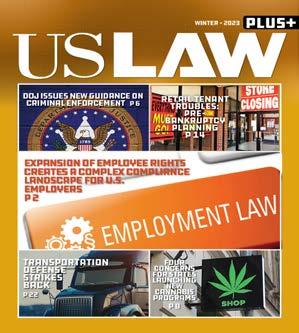



USLAW Magazine is an in-depth publication produced and designed to address legal and business issues facing today’s corporate leaders and legal decision-makers. Recent topics have covered cybersecurity & data privacy, artificial intelligence, medical marijuana & employer drug policies, management liability issues in the face of a cyberattack, defending motor carriers performing oversized load & heavy haul operations, nuclear verdicts, employee wellness programs, social media & the law, effects of electronic healthcare records, allocating risk by contract and much more.

US LAW SUMMER 2023 USLAW MAGAZINE 65
SPOLIATION OF EVIDENCE SUMMER 2021
Compendium of Law
FALL 2022 TransferTheValueofRiskConsultingin RealEstateTransactions andConstruction EvidenceUnderstandingSpoliation GutCheck: WhenaValidMedical CardIsn’tEnough p2 CorporateTransparency ActImposesRegulatory
USLAW CONNECTIVITY
In today’s digital world there are many ways to connect, share, communicate, engage, interact and collaborate. Through any one of our various communication channels, sign on, ask a question, offer insight, share comments, and collaborate with others connected to USLAW. Please connect with us via LinkedIn, , Instagram Facebook and X, formerly know as Twitter




TELFA CORPORATE PRACTICE GROUP COUNTRY-BY-COUNTRY GUIDE
The Trans European Law Firms Alliance (TELFA) Corporate Practice Group Country-by-Country Guide provides legal decision-makers with relevant info for creating corporate structures in jurisdictions across Europe. The corporate structure guide is intended to:
• Provide an overview of the different corporate structures and requirements in the EU.
• Inform about directors’ liabilities.
• Supplement company law aspects by always considering issues of tax.


To View and download the TELFA Country-by-Country Guide, visit the Client Toolkit section of uslaw.org.
PRACTICE GROUPS
USLAW prides itself on variety. Its 6,000+ attorneys excel in all areas of legal practice and participate in USLAW’s 25+ substantive active practice groups and communities, including Appellate Law, Banking and Financial Services, Business Litigation and Class Actions, Business Transactions/Mergers and Acquisitions, Cannabis Law, Complex Tort and Product Liability, Construction Law, Data Privacy and Security, eDiscovery, Energy/Environmental, Insurance Law, International Business and Trade, IP and Technology, Labor and Employment Law, Medical Law, Professional Liability, Real Estate, Retail and Hospitality Law, Tax Law, Transportation and Logistics, Trust and Estates, White Collar Defense, Women’s Connection, and Workers’ Compensation. Don’t see a specific practice area listed? Not a problem. USLAW firms cover the gamut of the legal profession and we will help you find a firm that has significant experience in your area of need.
CLIENT LEADERSHIP COUNCIL AND PRACTICE GROUP CLIENT ADVISORS
Take advantage of the knowledge of your peers. USLAW NETWORK’s Client Leadership Council (CLC) and Practice Group Client Advisors are hand-selected, groups of prestigious USLAW firm clients who provide expertise and advice to ensure the organization and its law firms meet the expectations of the client community. In addition to the valuable insights they provide, CLC members and Practice Group Client Advisors also serve as USLAW ambassadors, utilizing their stature within their various industries to promote the many benefits of USLAW NETWORK.

66 SUMMER 2023 USLAW MAGAZINE US LAW
COUNTRY COUNTRY GUIDE BY
AL CARR ALLISON
ADDRESS
100 Vestavia Parkway Birmingham, AL 35216
PH (205) 822-2006
FAX (205) 822-2057
WEB www.carrallison.com
PRIMARY Charles F. Carr (205) 949-2925 ccarr@carrallison.com
ALTERNATE Thomas L. Oliver, II (205) 949-2942 toliver@carrallison.com
ALTERNATE Thomas S. Thornton, III (205) 949-2936 tthornton@carrallison.com
MEMBER SINCE 2001 Carr Allison, one of the fastest growing firms in the Southeast, has offices strategically located throughout Alabama, Mississippi and Florida to provide our clients with sophisticated, effective and efficient legal representation.
We are the largest pure litigation firm in Alabama and have been recognized as a top five law firm by the Alabama Trial Court Review. From complex class actions to the defense of professionals, retailers, transportation companies, manufacturers, builders, employers and insurers, we represent clients of all sizes. Our attorneys include two former USLAW Chairs, the Executive Director of the Alabama Self-Insurers Association, adjunct faculty in Alabama’s law schools and several national speakers and writers on legal subjects ranging from punitive damages in Mississippi to quantifying death verdict values in Alabama and around the country.
Additional Offices:
Daphne, AL • PH (251) 626-9340 | Dothan, AL • PH (334) 712-6459 | Florence, AL • PH (256) 718-6040 Jacksonville, FL • PH (904) 328-6456 | Tallahassee, FL • PH (850) 222-2107 | Gulfport, MS • PH (228) 864-1060
AZ Jones, Skelton & Hochuli, PLC
ADDRESS
40 North Central Avenue Suite 2700 Phoenix, AZ 85004
PH (602) 263-1700
FAX (602) 651-7599
WEB www.jshfirm.com
PRIMARY Phillip H. Stanfield (602) 263-1745 pstanfield@jshfirm.com


ALTERNATE Michael A. Ludwig (602) 263-7342 mludwig@jshfirm.com

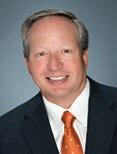
CA Murchison & Cumming, LLP
ADDRESS 801 South Grand Avenue Ninth Floor Los Angeles, CA 90017
PH (213) 623-7400
FAX (213) 623-6336
WEB www.murchisonlaw.com
PRIMARY Dan L. Longo (714) 501-2838 dlongo@murchisonlaw.com

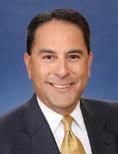
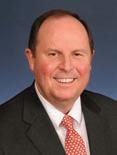
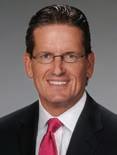
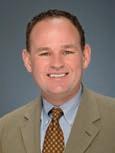
ALTERNATE
Richard C. Moreno (213) 630-1085 rmoreno@murchisonlaw.com
ALTERNATE Jean A. Dalmore (213) 630-1005 jdalmore@murchisonlaw.com
MEMBER SINCE 2001 Founded in 1930, Murchison & Cumming, LLP is an AV-rated AmLaw 500 “Go
To” law firm for litigation in California. One third of the firm’s shareholders are from diverse backgrounds. We have the resources of a large firm while ensuring the level of personalized service one would expect to receive from a small firm. We represent domestic and international businesses, insurers, professionals and individuals in litigated, non-litigated and transactional matters.
We value our reputation for excellence and approach our work with enthusiasm and passion. What truly sets us apart is our ability to provide our clients with an early evaluation of liability, damages, settlement value and strategy. Together with our clients we develop an appropriate strategy as we pursue the targeted result in a focused, efficient, and effective manner.
Additional Office: Irvine, CA • PH (714) 972-9977
CA Klinedinst PC
ADDRESS 501 West Broadway Suite 600 San Diego, CA 92101
PH (619) 400-8000
FAX (619) 238-8707
WEB www.Klinedinstlaw.com
ALTERNATE
ALTERNATE
Clarice A. Spicker (602) 263-1706 cspicker@jshfirm.com


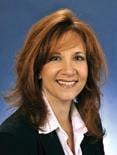

MEMBER SINCE 2001 Jones, Skelton & Hochuli, PLC is the largest and most experienced law firm of trial and appellate lawyers in Arizona practicing in the areas of insurance and insurance coverage defense. The firm’s 100+ attorneys defend insureds, self-insureds, government entities, corporations, and professional liability insureds throughout Arizona, New Mexico, and Utah.
Recognized as highly skilled, aggressive defenders of the legal and business communities, JSH lawyers have extensive trial and appellate experience in both state and federal courts. We present a vigorous defense in settlement negotiations and the deterrence of frivolous claims, as well as cost-effective arbitration and mediation services. With over 75 years of collective experience, our nationally-recognized in-house appellate team has handled over 800 appeals in state and federal courts.
AR Quattlebaum, Grooms & Tull PLLC
ADDRESS
111 Center St., Ste. 1900 Little Rock, AR 72201
PH (501) 379-1700
FAX (501) 379-1701
WEB www.QGTlaw.com
PRIMARY John E. Tull, III (501) 379-1705 jtull@qgtlaw.com
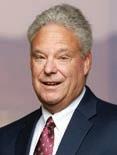
ALTERNATE Thomas G. Williams (501) 379-1722 twilliams@qgtlaw.com
ALTERNATE Michael N. Shannon (501) 379-1716 mshannon@qgtlaw.com
MEMBER SINCE 2004 With offices in Northwest and Central Arkansas, Quattlebaum, Grooms & Tull PLLC is a full-service law firm that can meet virtually any litigation, transactional, regulatory or dispute-resolution need. The firm’s clients include Fortune 500 companies, regional businesses, small entities, governmental bodies, and individuals. Our goal is to provide legal expertise with honesty, integrity, and respect to all clients, always keeping our client’s best interests in the forefront. Whether engaging in business formation, commercial transactions, or complex litigation, clients look to our over 40 attorneys for sound counsel, guidance and dependable advice, which has led to many long-term client relationships founded on mutual trust and respect.
Additional Office: Springdale, AR • (479) 444-5200
PRIMARY Frederick M. Heiser (949) 868-2606 fheiser@klinedinstlaw.com
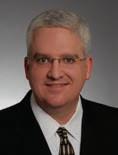
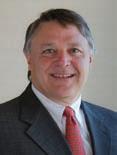
Heather L. Rosing (619) 488-8888 hrosing@klinedinstlaw.com
ALTERNATE Nadia P. Bermudez (619) 488-8811 nbermudez@klinedinstlaw.com

MEMBER SINCE 2002 Klinedinst PC serves domestic and international clients in a broad range of civil litigation, corporate defense, white collar, and transactional law matters. Klinedinst attorneys are highly skilled and experienced individuals who provide a range of sophisticated legal services to corporations, institutions, and individuals at both the trial and appellate levels in federal and state courts. Each matter is diligently and effectively managed, from simple transactions to complex document-intensive matters requiring attorneys from multiple disciplines across the West. Klinedinst is firmly committed to providing only the highest quality legal services, drawing upon the individual background and collective energies and efforts of each member of the firm. Klinedinst’s overriding goal is to efficiently and effectively achieve optimal results for each client’s legal and business interests.
Additional Office: Irvine, CA • PH (949) 868-2600
CA Hanson bridgett llp
ADDRESS 425 Market Street 26th Floor San Francisco, CA 94105
PH (415) 777-3200
FAX (415) 541-9366
WEB
www.hansonbridgett.com
ALTERNATE
PRIMARY Mert A. Howard (415) 995-5033
MHoward@hansonbridgett.com
Sandra Rappaport (415) 995-5053
SRappaport@ hansonbridgett.com
ALTERNATE Jonathan S. Storper (415) 995-5040 JStorper@hansonbridgett.com
MEMBER SINCE 2015 Hanson Bridgett LLP is a full service AmLaw 200 law firm with more than 200 attorneys across California. Creating a diverse workforce by fostering an atmosphere of belonging and intentional support has been a priority at Hanson Bridgett since its founding in 1958. We are dedicated to creating an environment that provides opportunities for people with varied backgrounds, both for attorneys and administrative professionals. We are also committed to the communities where our employees live and work and consider it part of our professional obligation to serve justice by encouraging and supporting pro bono and social impact work.

Additional Offices: Sacramento, CA • PH (916) 442-3333 | San Rafael, CA • PH (415) 925-8400 | Walnut Creek, CA • PH (925) 746-8460 67 | US LAW NETWORK MEMBER FIRMS
ADDRESS
5383 Hollister Avenue
Suite 240
Santa Barbara, CA 93111
PH (805) 692-2800
FAX (805) 692-2801
WEB
www.sbelaw.com
PRIMARY Sean R. Burnett (805) 683-7758 sburnett@sbelaw.com
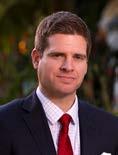
ALTERNATE
Ashley Dorris Egerer (805) 683-7746 aegerer@sbelaw.com
CT HINCKLEY ALLEN
ADDRESS 20 Church Street, 18th Floor Hartford, CT 06103
PH (860) 725-6200
FAX (860) 278-3802
WEB www.hinckleyallen.com
ALTERNATE
ALTERNATE
Christopher M. Cotter (805) 692-2800 ccotter@sbelaw.com

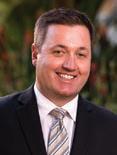

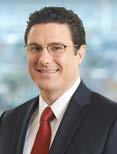


MEMBER SINCE 2001 Snyder Burnett Egerer, LLP is an AV rated firm which concentrates its practice on the defense and prosecution of civil litigation matters. The firm handles matters in state and federal courts throughout Central and Southern California, primarily for self-insured clients. Our very active trial practice includes actions in personal injury, premises liability, professional malpractice, business and complex litigation, employment law, products/drug liability, environmental, toxic tort, property, land use and development. Because the firm is staffed with trial lawyers, discovery does not involve “turning over every rock” and then billing the client for the effort. Rather, we direct discovery and investigation to the issues that will move the case toward resolution. If the case does not settle, we relish protecting our client’s rights at trial. The firm’s trial record is enviable – a winning percentage of over 85% for over 300 jury trials in the past decade.
ADDRESS
1731 E. Roseville Parkway Suite 200 Roseville CA 95661
PH (916) 787-2312
FAX (916) 787-2301
WEB www.cca-law.com
PRIMARY Richard Chavez (916) 607-3300 rchavez@cca-law.com
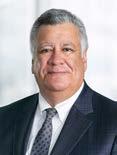

ALTERNATE Chad Coleman (916) 300-4323 ccoleman@cca-law.com

ALTERNATE Noelle Sage (714) 742-0782 nsage@cca-law.com
MEMBER SINCE 2023 Coleman Chavez & Associates, LLP is a 65+ attorney law firm focused on the defense of workers’ compensation claims and related litigation in California. Coleman Chavez & Associates was established in 2008, and we recently celebrated our 15th anniversary.
Coleman Chavez & Associates represents a variety of clients, including employers, insurance carriers and third-party administrators. We take pride in the quality of our work, and we are committed to providing thorough and effective representation to our clients. We believe that we can achieve the best results by staying well informed on the law, being thoroughly prepared, negotiating assertively and effectively, and keeping an open line of communication with our clients.
From our offices throughout the state, we service all Northern California and Southern California WCAB District Offices. The attorneys at Coleman Chavez & Associates look forward to working with you and your team members.
ADDRESS
1601 19th Street
Suite 1000 Denver, CO 80202
PH (303) 623-9000
FAX (303) 623-9222
WEB
www.lewisroca.com
PRIMARY Jessica L. Fuller (303) 628-9527 JFuller@lewisroca.com


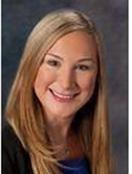
ALTERNATE Ben M. Ochoa (303) 628-9574
BOchoa@lewisroca.com
ALTERNATE Michael D. Plachy (303) 628-9532
MPlachy@lewisroca.com
MEMBER SINCE 2005 Established and emerging companies, across key Colorado industries, consistently look to Lewis Roca Rothgerber Christie for informed and experienced counsel on the issues that matter most to their businesses. Our attorneys serve a diverse base of local, regional, national and international clients, including some of the world’s largest corporations, with transactional and litigation guidance. And from a service perspective, we immerse ourselves in your industry, business, and matter to solve your problems and anticipate the ones that lie ahead. We believe that every client deserves an exceptional experience and we’ve made it our mission to continuously exceed expectations in order to help you meet the unique business challenges of a rapidly evolving global marketplace. What matters to you, matters to us.
Additional Office: Colorado Springs, CO • PH (719) 386-3000
PRIMARY Noble F. Allen (860) 331-2610 nallen@hinckleyallen.com


William S. Fish, Jr. (860) 331-2700 wfish@hinckleyallen.com
ALTERNATE
Peter J. Martin (860) 331-2726 pmartin@hinckleyallen.com
MEMBER SINCE 2009 Hinckley Allen is a client-driven, forward-thinking law firm with one common goal: to provide great value and deliver outstanding results for our clients. We collaborate across practices and continuously pursue operational excellence to deliver cost-effective, exceptional service. Structured to serve our clients based on their industries and how they do business, we offer a rare combination of agility, responsiveness, full-service capabilities, and depth of experience.
Recognized as an AmLaw 200 Firm, Hinckley Allen offers pragmatic legal counsel, strategic thinking, and tireless advocacy to a diverse clientele. Our clients include regional, national, and international privately held and public companies and emerging businesses in a wide range of industries. Leading utilities, financial institutions, manufacturing companies, educational institutions, academic medical centers, health care institutions, hospitals, real estate developers, and construction companies depend on us for counsel. We have been a vital force in businesses, government, and our communities since 1906.
Additional Office: Manchester, NH • PH (603) 225-4334
DE COOCH AND TAYLOR
ADDRESS 1000 N. West Street Suite 1500 Wilmington, DE 19899
PH (302) 984-3800
FAX (302) 984-3939
WEB www.coochtaylor.com www.delawarelitigator.com
PRIMARY
C. Scott Reese (302) 984-3811 sreese@coochtaylor.com
ALTERNATE Blake A. Bennett (302) 984-3889 bbennett@coochtaylor.com
ALTERNATE
R. Grant Dick IV (302) 984-3867 gdick@coochtaylor.com
MEMBER SINCE 2015 Cooch and Taylor, established in 1960, has long been regarded as one of Delaware’s best litigation firms. The firm’s attorneys spend a significant amount of time in the courtroom and have achieved many significant bench and jury verdicts, but recognize that to the vast majority of clients, success is defined by getting the best possible outcome long before a jury is ever seated. Delaware’s judiciary has a reputation as one of the best in the country based on factors such as judicial competence, treatment of litigation and timeliness. As a result, Delaware’s judges have strict expectations for all counsel appearing before them and Cooch and Taylor has over half a century of experience in ensuring its clients and co-counsel meet those expectations.
FL WICKER SMITH | CENTRAL FLORIDA
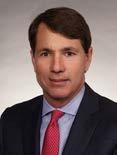
ADDRESS
390 North Orange Street, Suite 1000 Orlando. FL 32801
PH
(407) 843-3939
FAX (407) 649-8118 WEB www.wickersmith.com
PRIMARY Richards H. Ford (407) 317-2170 rford@wickersmith.com
ALTERNATE Kurt M. Spengler (407) 317-2186 kspengler@wickersmith.com
MEMBER SINCE 2001 Founded in 1952, Wicker Smith O’Hara McCoy & Ford P.A. is a full-service trial firm deeply experienced in handling significant and complex litigation for a broad variety of clients including multinational corporations to individuals. With more than 260 attorneys, Wicker Smith services clients throughout Central and South Florida and beyond. Our Central Florida region serves Melbourne, Orlando, Tampa, and Sarasota. In South Florida, we serve Fort Lauderdale, Key Largo, Miami, Naples, Palmetto Bay, and West Palm Beach. The backbone of our relationship with clients is built upon integrity and stability. We strive to establish long-term relationships with our clients built upon a partnership of communication and trust by listening to our clients, understanding their businesses, and developing legal solutions to best meet their individual needs.

Additional Offices: Atlanta, GA • PH (407) 843-3939 | Brunswick, GA • PH (912) 266-8620 | Fort Lauderdale, FL • PH (954) 847-4800 Jacksonville, FL • PH (904) 355-0225 | Largo Key Largo, FL • PH (305) 448-3939 | Melbourne, FL • PH (321) 610-5800 Naples, FL • PH (239) 552-5300 | Orlando, FL • PH (407) 843-3939 | Palmetto Bay, FL • PH (305) 448-3939 Sarasota, FL • PH (941) 366-4200 | Tampa, FL • PH (813) 222-3939 West Palm Beach, FL • PH (561) 689-3800
68 | US LAW NETWORK MEMBER FIRMS Additional Offices: Los Angeles | Encino/Van Nuys | Orange County | Riverside | San Diego | Sacramento | Bay Area/Pleasant Hill | Fresno | San Jose/Salinas | Santa Rosa • PH (916) 787-2312
CA COLEMAN CHAVEZ & ASSOCIATES FOR WORKERS’ COMPENSATION ONLY CO LEWIS ROCA
CA SNYDER BURNETT EGERER, LLP
FL WICKER SMITH | SOUTH FLORIDA
ADDRESS
2800 Ponce de Leon Blvd.
Suite 800 Coral Gables, FL 33134
PH (305) 448-3939
FAX (305) 441-1745
WEB www.wickersmith.com
ALTERNATE
PRIMARY
Nicholas E. Christin (305) 461-8710 nchristin@wickersmith.com
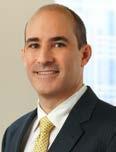
Oscar J. Cabanas ((305 )461-8710 ocabanas@wickersmith.com
ID DUKE EVETT PLLC
ADDRESS
1087 W River Street Suite 300 Boise, ID 83702
PH (208) 342-3310
FAX (208) 342-3299
WEB www.dukeevett.com
ALTERNATE Constantine “Dean” Nickas (305) 461-8703 cnickas@wickersmith.com
PRIMARY
Keely E. Duke (208) 342-3310 ked@dukeevett.com


ALTERNATE
Joshua S. Evett (208) 342-3310 jse@dukeevett.com
MEMBER SINCE 2001
Founded in 1952, Wicker Smith O’Hara McCoy & Ford P.A. is a full-service trial firm deeply experienced in handling significant and complex litigation for a broad variety of clients including multinational corporations to individuals. With more than 260 attorneys, Wicker Smith services clients throughout Central and South Florida and beyond. Our Central Florida region serves Melbourne, Orlando, Tampa, and Sarasota. In South Florida, we serve Fort Lauderdale, Key Largo, Miami, Naples, Palmetto Bay, and West Palm Beach. The backbone of our relationship with clients is built upon integrity and stability. We strive to establish long-term relationships with our clients built upon a partnership of communication and trust by listening to our clients, understanding their businesses, and developing legal solutions to best meet their individual needs.
Additional Offices: Atlanta, GA • PH (407) 843-3939 Brunswick, GA • PH (912) 266-8620 | Fort Lauderdale, FL • PH (954) 847-4800 Jacksonville, FL • PH (904) 355-0225 | Key Largo, FL • PH (305) 448-3939 Melbourne, FL • PH (321) 610-5800 Naples, FL • PH (239) 552-5300 | Orlando, FL • PH (407) 843-3939 | Palmetto Bay, FL • PH (305) 448-3939 Sarasota, FL • PH (941) 366-4200 Tampa, FL • PH (813) 222-3939 | West Palm Beach, FL • PH (561) 689-3800
FL CARR ALLISON | NORTHWEST FLORIDA
ADDRESS
305 South Gadsden St. Tallahassee, FL 32301
PH (850) 222-2107
FAX (850) 222-8475
WEB www.carrallison.com
PRIMARY Christopher Barkas (850) 518-6913 cbarkas@carrallison.com
ALTERNATE
William B. Graham (850) 518-6917 bgraham@carrallison.com
MEMBER SINCE 2001 The Tallahassee office of Carr Allison brings a legacy of more than 40 years of providing quality legal service to north Florida. A member of USLAW since 2001, Carr Allison has increased the scope of services available to its clientele, covering the Gulf Coast from Mississippi through Alabama and across the northern Florida panhandle to Jacksonville on the Atlantic coast.The lawyers handle all insurance issues from licensing to litigation. Firm members have extensive trial experience in the event matters can’t be resolved. Clients of the firm include insurance carriers as well as self-insured companies. Having a unique location in Florida’s Capital gives us the ability to lobby the legislature and influence public policy.With the resources of more than 120 lawyers in Alabama, Florida and Mississippi behind it, Carr Allison’s offices in Tallahassee and Jacksonville stand ready to serve the national and international client faced with legal exposure in Florida.
Additional
HI GOODSILL ANDERSON QUINN & STIFEL LLP
ADDRESS
First Hawaiian Center Suite 1600 999 Bishop Street Honolulu, HI 96813

PH (808) 547-5600
FAX (808) 547-5880
WEB www.goodsill.com
PRIMARY Edmund K. Saffery (808) 547-5736 esaffery@goodsill.com
ALTERNATE
Johnathan C. Bolton (808) 547-5854 jbolton@goodsill.com
MEMBER SINCE 2004 With more than 50 attorneys located in downtown Honolulu, Goodsill offers knowledge and experience in all aspects of civil law, including business and securities law, banking, real estate, tax, trusts and estates, public utilities, immigration, international transactions and civil litigation. In addition to representing clients in alternative dispute resolution, a number of our trial lawyers are trained mediators and are retained to resolve disputes. Goodsill’s litigation department also handles appeals in both state and federal courts.
Goodsill attorneys provide innovative, solutions-oriented legal and general business counsel to an impressive list of domestic and international clients. We work closely with each client to identify and deploy the right mix of legal and business expertise, talented support staff and technology.
MEMBER SINCE 2012 Success. Excellence. Experience. Dedication. These values form the foundation of our firm. At Duke Scanlan & Hall, we are dedicated to representing corporate, insurance, and healthcare clients through litigation, trials, and appeals all across Idaho and Eastern Oregon. We offer the experience and dedication of seasoned trial attorneys who insist on excellence in the pursuit of success for our clients. Our clients know that we not only consistently win, but that we keep them informed of case strategy and developments, while helping them manage the costs of litigation. In handling each case, we employ the following key strategies to help us effectively and efficiently fight for our clients: early and continued case evaluation and budgeting; consistent and timely communication with our clients; efficient staffing; and the use of advanced legal technology both in and out of the courtroom. While we bring experience and dedication to each of our cases, we are also proud of our profession and feel strongly that we – and the profession – can positively impact the lives of others. As part of our commitment, we support enhancing diversity in the legal field, working to improve our profession, and helping our community.
IL AMUNDSEN DAVIS LLC
ADDRESS
150 North Michigan Ave. Suite 3300 Chicago, IL 60601
PH (312) 894-3200
FAX (312) 894-3210 WEB www.amundsendavislaw. com
PRIMARY Lew R.C. Bricker (312) 894-3224 lbricker@ amundsendavislaw.com
ALTERNATE Larry A. Schechtman (312) 894-3253 lschechtman@ amundsendavislaw.com
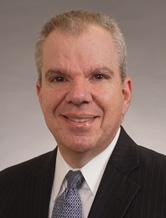
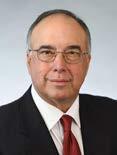
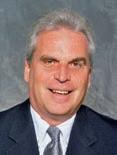
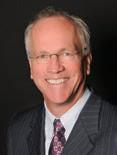

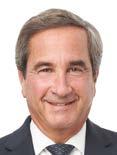

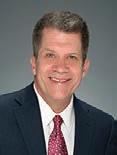
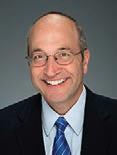
ALTERNATE Dennis J. Cotter (312) 894-3229 dcotter@ amundsendavislaw.com
MEMBER SINCE 2001 Amundsen Davis is a full service business law firm of more than 230 attorneys serving companies of all sizes throughout the U.S. and beyond. Our attorneys are prepared to handle a multitude of diverse legal services from the inception of business, to labor and employment issues, and litigation. We understand the entrepreneurial thinking that drives business decisions for our clients. Amundsen Davis attorneys combine experience with a practical business approach to offer client-centered services efficiently and effectively. The foundation for our success is the integrity, quality and experience of our attorneys and staff, an understanding of the relationship between legal risks and business objectives, and the desire to explore new and innovative ways to solve client problems.
IA SIMMONS PERRINE MOYER BERGMAN PLC
ADDRESS
115 Third Street SE Suite 1200 Cedar Rapids, IA 52401
PH (319) 366-7641 FAX (319) 366-1917 WEB www.spmblaw.com
PRIMARY Kevin J. Visser (319) 366-7641 kvisser@spmblaw.com
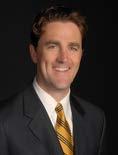

ALTERNATE
Lynn W. Hartman (319) 366-7641 lhartman@spmblaw.com
ALTERNATE
Brian J. Fagan (319) 366-7641 bfagan@spmblaw.com
MEMBER SINCE 2005 Simmons Perrine Moyer Bergman PLC is a full-service law firm headquartered in Cedar Rapids, Iowa with an additional office located in Coralville, Iowa. The firm’s deep history dates back to 1916, having more than a century of experience representing national (and international) clients in matters from complex transportation, construction and intellectual property litigation to business transactions of all sizes. We are also home to one of the largest banking practices in Iowa and are known for our long history of serving the needs of families and their businesses, including estate and succession planning. Our attorneys work together to find the most efficient solutions for the best outcomes for our clients.
Additional Office: Coralville, IA • PH (319) 354-1019
Daphne,
•
626-9340 | Dothan, AL • PH (334) 712-6459
Jacksonville,
Gulfport, MS • PH
Offices: Birmingham, AL • PH (205) 822-2006 |
AL
PH (251)
Florence, AL • PH (256) 718-6040 |
FL • (904) 328-6456 |
(228) 864-1060
Additional
Lake, IL • PH (815) 337-4900 | Rockford, IL • PH (815) 987-0441 | St. Charles, IL • PH (630) 587-7910 69 | US LAW NETWORK MEMBER FIRMS
Offices: Crystal
KS/MO DYSART TAYLOR
ADDRESS
700 West 47th Street
Suite 410 Kansas City, MO 64112
PH (816) 931-2700
FAX (816) 931-7377
WEB www.dysarttaylor.com
MD FRANKLIN & PROKOPIK P.C.
ADDRESS
2 North Charles Street, Suite 600 Baltimore, MD 21201
PH (410) 752-8700
FAX (410) 752-6868
WEB www.fandpnet.com
PRIMARY Amanda Pennington Ketchum (816) 714-3066 aketchum@dysarttaylor.com


ALTERNATE Michael Judy (816) 714-3031 mjudy@dysarttaylor.com
ALTERNATE John F. Wilcox, Jr. (816) 714-3046 jwilcox@dysarttaylor.com
MEMBER SINCE 2014 Dysart Taylor was founded in 1934. It is a highly respected Midwestern law firm with broad expertise to support its clients’ growth and success in a myriad of industries. It is also touted as one of the nation’s leading transportation law firms. Six members of the firm have served as Presidents of the Transportation Lawyers Association, the leading bar association for attorneys in the transportation industry.
Our attorneys are active in the community and have held governing positions in local and state bar associations and community organizations. Our AV-rated law firm is proud of its reputation for zealous advocacy, high ethical standards, and outstanding results. We are equally proud of the trust our local and national clients place in us.
LA MCCRANIE, SISTRUNK, ANZELMO, HARDY, MCDANIEL & WELCH
ADDRESS
909 Poydras Street Suite 1000 New Orleans, LA 70112
PH (504) 831-0946
PH (800) 237-9108
FAX (800) 977-8810
WEB www.mcsalaw.com
PRIMARY Keith W. McDaniel (504) 846-8330 kmcdaniel@mcsalaw.com

ALTERNATE Heather N. Shockley (504) 846-8334 hshockley@mcsalaw.com
MEMBER SINCE 2001 McCranie, Sistrunk, Anzelmo, Hardy, McDaniel & Welch is an aggressive, experienced, “AV” rated law firm with numerous “AV” rated attorneys. We provide our clientele with innovative, cost-effective representation statewide and in the gulf south.
We represent both insured and self-insured clients who face a multiplicity of exposures in today’s business environment.
Our practice areas include tort litigation, professional liability litigation, transportation, products liability, hotel-innkeeper liability, construction, workman’s compensation, environmental and toxic tort, maritime claims, premises liability, insurance coverage, excess insurance issues, highway design cases, civil rights litigation, municipal liability, medical malpractice, and other related areas.
Our attorneys also have expertise in commercial entity risks such as fidelity, surety, director and officer liability, and errors and omissions claims.
ME RICHARDSON, WHITMAN, LARGE & BADGER
ADDRESS
465 Congress Street, 9th Floor Portland, ME 04101
PH (207) 774-7474
FAX
(207) 774-1343
WEB www.rwlb.com
PRIMARY Elizabeth G. Stouder (207) 774-7474 estouder@rwlb.com

ALTERNATE Eric J. Uhl (207) 774-7474 euhl@rwlb.com

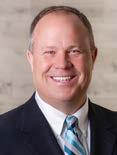
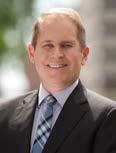



ALTERNATE Joseph L Cahoon (207) 774-7474 jcahoon@rwlb.com
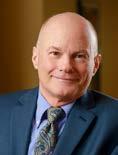
MEMBER SINCE 2004 The core of Richardson, Whitman, Large & Badger’s practice is civil litigation. We are one of the largest and most diverse trial practice firms in Northern New England. From offices in Portland and Bangor we handle hundreds of cases in all of Maines’s state and federal courthouses. In addition, RWLB has developed an extensive labor and employment practice: counseling clients, writing policies and employee handbooks, and handling cases filed in the Maine Human Rights Commission, the EEOC, and all Maine courts.
RWLB’s trial practice covers the full breadth of civil litigation, from products liability to professional malpractice, from dam construction to ship collision, from gender discrimination to wiretapping and criminal defense. Our clients include small family businesses, local Maine companies, and some of the world’s largest multinational corporations. They come from all sectors of the economy and have included automakers, construction contractors, retailers, electric utilities, insurers, law firms, lending institutions, supermarkets, doctors, consumer product manufacturers, insurance agencies, and municipalities.
Additional Office: Bangor, ME
PRIMARY Albert B. Randall, Jr. (410) 230-3622 arandall@fandpnet.com
ALTERNATE
Tamara B. Goorevitz (410) 230-3625 tgoorevitz@fandpnet.com
ALTERNATE
Stephen J. Marshall (410) 230-3612 smarshall@fandpnet.com
MEMBER SINCE 2005 Headquartered in Baltimore City, Franklin & Prokopik is a regional law firm comprised of over 70 experienced attorneys. Our mission of providing the highest quality personal service enables us to grow, as we attract and develop other likeminded attorneys to serve our clients. From twenty-four hour emergency services to complex litigation, we listen carefully to our clients and tailor our services to meet their outcome goals. Franklin & Prokopik provides a broad spectrum of legal services and represents corporate and business entities of all sizes, from small “mom and pops” to Fortune 500 companies across a wide range of industries.
Additional Offices: | Easton, MD • PH (410) 820-0600 | Hagerstown, MD • PH (301) 745-3900
MA RUBIN AND RUDMAN LLP
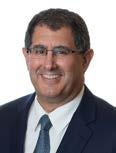
ADDRESS 53 State Street Boston, MA 02109
PH
(617) 330-7000
FAX (617) 330-7550
WEB www.rubinrudman.com
PRIMARY John J. McGivney (617) 330-7017 jmcgivney@rubinrudman.com
ALTERNATE
Michael D. Riseberg (617) 330-7180 mriseberg@rubinrudman.com
ALTERNATE
Michael F. Connolly (617) 330-7101 mconnolly@rubinrudman.com

MEMBER SINCE 2020 Founded over a century ago, Rubin and Rudman LLP is a full-service law firm with more than 75 lawyers in Boston, Massachusetts. With a diverse mix of practices, Rubin and Rudman serves national and international companies, including large public companies and closely held businesses; real estate developers; biotechnology, pharmaceutical and medical device makers; regulated industries, public entities and municipalities; insurance companies and their insureds; educational and other institutions; non-profit organizations; families and high net worth individuals. Rubin and Rudman also has a suburban office in Woburn, Massachusetts. Web: www. rubinrudman.com.
Our years of experience and continuing dedication to providing high quality legal advice has earned us client loyalty and respect amongst our peers. Our attorneys thrive on challenging assignments across diverse areas of the law. We offer innovation and responsiveness, with a collaborative team approach to solving problems that get results
Additional Office: | Woburn, MA • PH (781) 933-5505
MN larson•king, LLP


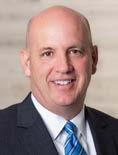

ADDRESS
30 East Seventh Street Suite 2800 St. Paul, MN 55101
PH (651) 312-6500
FAX (651) 312-6618 WEB www.larsonking.com
PRIMARY Mark A. Solheim (651) 312-6503 msolheim@larsonking.com
ALTERNATE
David M. Wilk (651) 312-6521 dwilk@larsonking.com
ALTERNATE Shawn M. Raiter (651) 312-6518 sraiter@larsonking.com
MEMBER SINCE 2002 As a nationally recognized firm with an enviable track record of success, Larson • King delivers high quality legal services through a nimble and cost-effective team, without strict or overpriced fee structures. Our firm is capable of efficiently managing dispersed litigation resources and our attorneys provide seamless integration and rapid response times. Larson • King partners work directly with clients, and are closely involved with all aspects of a dispute. Whether it is finding the right expert testimony in a construction case, or retaining local counsel in a remote jurisdiction, Larson • King attorneys hand-select the right team to achieve client objectives. With these resources, Larson • King stands ready to take a case to the highest court – there are times when this fact alone can deter the opposition.
70 | US LAW NETWORK MEMBER FIRMS
MS CARR ALLISON | SOUTHERN MISSISSIPPI
ADDRESS
1319 26th Avenue Gulfport, MS 39501
PH (228) 864-1060
FAX (228) 864-9160
WEB www.carrallison.com
PRIMARY Douglas Bagwell (228) 678-1005 dbagwell@carrallison.com
MEMBER SINCE 2001 Carr Allison is one of the fastest growing firms in the Southeast. Why? Our clients tell us the fact that we have lawyers with a lifetime of ties in the seven cities in Alabama, Florida and Mississippi where our offices are located is the primary reason they come to us for legal problems in those areas. In Mississippi, we provide litigation services to national clients in the southern part of Mississippi from our office in Gulfport.When clients face litigation exposure in Mississippi they often hear the horror stories involving the imposition of punitive damages. We like to think we “wrote the book” on the subject of punitive damages in Mississippi. With the resources of more than 120 lawyers in Alabama, Florida and Mississippi behind it, the Carr Allison office in Gulfport, Mississippi stands ready to serve the national and international client faced with legal exposure in southern Mississippi.
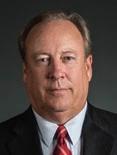
Additional Offices:
Birmingham, AL • PH (205) 822-2006 | Daphne, AL • PH (251) 626-9340 | Dothan, AL • PH (334) 712-6459
Florence, AL • PH (256) 718-6040 | Jacksonville, FL • PH (904) 328-6456 | Tallahassee, FL • PH (850) 222-2107
MS COPELAND, COOK, TAYLOR AND BUSH, P.A.
ADDRESS
600 Concourse, Suite 200 1076 Highland Colony Pkwy. Ridgeland, MS 39157
PH
(601) 856-7200
FAX (601) 856-7626
WEB www.copelandcook.com
PRIMARY James R. Moore, Jr. (601) 427-1301 jmoore@cctb.com
ALTERNATE Greg Copeland (601) 427-1313 gcopeland@cctb.com
ALTERNATE R. Eric Toney (601) 427-1302 etoney@cctb.com
MEMBER SINCE 2004 Copeland, Cook, Taylor and Bush, P.A. is a full-service AV-rated law firm based in the Metro Jackson area of Mississippi. Founded in 1985 by the four named shareholders, the firm’s original practice was based principally on Commercial Litigation, Oil and Gas, and Insurance Defense. The firm’s growth has resulted from strategic planning in direct response to the diverse needs of our clients. CCTB has built a reputation for strong client relationships as a result of its lawyers’ skills in communication and counseling. If litigation cannot be avoided, our seasoned litigation group is prepared to aggressively defend the interests of our clients in state and federal courts. While Mississippi can be a challenging jurisdiction, the record of CCTB clients speaks well for the quality of our representation.
Additional Offices: Gulfport, MS • PH (228) 863-6101 | Hattiesburg, MS • PH (601) 264-6670
MO LASHLY & BAER, P.C.
ADDRESS
714 Locust Street St. Louis, MO 63101
PH (314) 621-2939
FAX (314) 621-6844
WEB www.lashlybaer.com
MT DAVIS, HATLEY, HAFFEMAN & TIGHE, P.C.
ADDRESS
The Milwaukee Station Third Floor 101 River Drive North Great Falls, MT 59401
PH
(406) 761-5243
FAX
(406) 761-4126
WEB
www.dhhtlaw.com
ALTERNATE
ALTERNATE
PRIMARY Maxon R. Davis (406) 761-5243 max.davis@dhhtlaw.com
Paul R. Haffeman (406) 761-5243




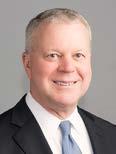
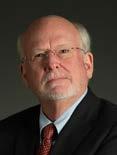
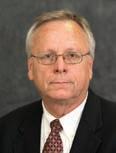
paul.haffeman@dhhtlaw.com
Gregory J. Hatley (406) 761-5243
greg.hatley@dhhtlaw.com
MEMBER SINCE 2007 Davis, Hatley, Haffeman & Tighe, P.C., is a business and litigation law firm located in Great Falls, Montana. It has been in continuous existence since 1912. Originally the firm focused on insurance defense work. While the defense of insureds and insurers remains a primary component of DHHT’s practice, the firm’s work has expanded over the years to include business litigation, representation of national and multi-national corporations in class actions, products liability, employment, environmental, toxic tort and commercial litigation, and the defense of public entities, including the State of Montana and numerous cities and counties, as well as a wide range of transactional work, running the gamut of business formations, farm and ranch sales, commercial leasing, oil and gas, and business consulting. There is also an active estate planning and probate practice. The firm carries on a state-wide trial practice. The lawyers at DHHT are proud of their reputation in the Montana legal community as attorneys who are always willing to go the distance for their clients. Since 2007, DHHT lawyers tried cases to verdict in federal and state courts all over Montana, including Great Falls, Billings, Missoula, Helena, Bozeman, Kalispell, Lewistown, Glasgow, Deer Lodge and Shelby. That reputation assures clients of experienced representation through all phases of litigation and instant creditability with the Montana bench & bar.
ADDRESS
1700 Farnam Street Suite 1500 Omaha, NE 68102
PH (402) 344-0500
FAX (402) 344-0588
WEB www.bairdholm.com
PRIMARY Jennifer D. Tricker (402) 636-8348 jtricker@bairdholm.com



ALTERNATE
J. Scott Searl (402) 636-8265 ssearl@bairdholm.com
ALTERNATE Christopher R. Hedican (402) 636-8311 chedican@bairdholm.com


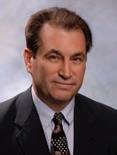
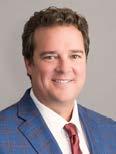
MEMBER SINCE 2007 Baird Holm LLP’s integrated team of 97 attorneys, licensed in 22 states, is committed to connecting each of its valued clients to the positive outcomes they seek. With extensive and diverse expertise, we leverage one another’s skills to respond efficiently to our clients’ local, regional, national and international legal needs. We are proud to represent public and private companies, individuals, private funds and other investors, financial institutions, governmental entities and nonprofit organizations.
Rooted by the promise to constantly evolve in anticipation of our clients’ changing needs, Baird Holm has enjoyed steady and measured growth since its founding in 1873. We are proud of our strong tradition of uncompromising quality, dedication to clients, personal and professional integrity, and service to the profession and the community.
PRIMARY Stephen L. Beimdiek (314) 436-8303 sbeim@lashlybaer.com
ALTERNATE Kevin L. Fritz (314) 436-8309 klfritz@lashlybaer.com
ALTERNATE Julie Z. Devine (314) 436-8329 jdevine@lashlybaer.com
MEMBER SINCE 2002 Lashly & Baer, P.C. is a mid-size Missouri law firm with deep roots in St. Louis and surrounding areas. As a full-service firm, we have been fortunate to develop a very diverse and extremely loyal base of national, regional and local clients. Our clients have learned to expect a high level of service and a great degree of satisfaction, regardless of their size. Whether it’s a publicly-owned or private business, government institution, hospital or an individual – to each client, there is no more important legal matter than theirs. We know this and work hard to achieve results and help our clients reach their goals. Given the complexities of today’s business environment, lawyers develop experience in specific practice areas, such as: civil litigation, corporate, product liability, retail, transportation, professional liability, labor and employment, education, estate planning, government, health care, medical malpractice defense, personal injury, toxic tort and real estate.
Since 1912 our simple philosophy has never changed: at the core of every case is the client. The client’s goals become our goals, and our firm works tirelessly to find the most efficient and cost-effective solution to each legal issue.
ADDRESS
1100 E. Bridger Avenue Las Vegas, NV 89101
PH (702) 366-0622
FAX (702) 366-0327
WEB www.thorndal.com
PRIMARY Brian K. Terry (702) 366-0622 bkt@thorndal.com
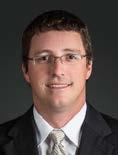
ALTERNATE Katherine F. Parks (775) 786-2882 kfp@thorndal.com
ALTERNATE Michael C. Hetey (702) 366-0622 mch@thorndal.com
MEMBER SINCE 2007 Thorndal Armstrong has enjoyed a strong Nevada presence since 1971. Founded in Las Vegas, the firm has grown from two lawyers to just under thirty. It expanded its statewide services in 1986 with the opening of the northern Nevada office in Reno. An additional office was opened in Elko in 1996 to further satisfy client demand in the northeastern portion of the state.
With a strong emphasis in civil defense litigation for insureds and self-insureds, including expertise in complex litigation, general business, commercial law, and industrial insurance defense, Thorndal, Armstrong, Delk, Balkenbush & Eisinger is committed to providing thorough, efficient and effective legal services to its clients. Its experienced attorneys, combined with a highly capable professional support staff, allow the firm to represent clients on a competitive, cost-efficient basis.
Additional Office: Reno, NV • PH (775) 786-2882
NE baird holm llp NV THORNDAL
ARMSTRONG
71 | US LAW NETWORK MEMBER FIRMS
NJ CONNELL FOLEY LLP
ADDRESS
56 Livingston Avenue Roseland, NJ 07068
PH (973) 535-0500
FAX (973) 535-9217
WEB www.connellfoley.com
PRIMARY Kevin R. Gardner (973) 840-2415 kgardner@connellfoley.com



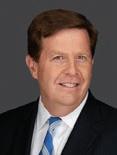
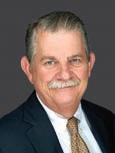
ALTERNATE John D. Cromie (973) 840-2425 jcromie@connellfoley.com
ALTERNATE Karen P. Randall (973) 840-2423 krandall@connellfoley.com





MEMBER SINCE 2005 A leading full-service regional law firm headquartered in New Jersey, Connell Foley LLP has more than 140 attorneys across seven offices. We take a hands-on approach to provide outstanding legal services while maintaining a firm culture predicated on service and teamwork. Our clients range from Fortune 500 corporations, to government entities, middle market and start-up businesses, and entrepreneurs. With experience in the various industries in which our clients operate, we offer innovative and cost-effective solutions. Connell Foley is recognized as a leader in numerous areas of law, including: banking and finance, bankruptcy and restructuring, commercial litigation, construction, corporate law, cybersecurity, environmental, immigration, insurance, labor and employment, product liability, professional liability, real estate, zoning and land use, transportation, trusts and estates, and white collar criminal defense.
Additional Offices: Cherry Hill, NJ • PH (856) 317-7100 | Jersey City, NJ • PH (201) 521-1000 Newark, NJ • PH (973) 436-5800 | New York, NY • PH (212) 307-3700
NM MODRALL SPERLING
ADDRESS
500 Fourth Street N.W. Suite 1000 Albuquerque, NM 87102
PH (505) 848-1800
FAX (505) 848-9710
WEB
www.modrall.com
PRIMARY Jennifer G. Anderson
(505) 848-1809
Jennifer.Anderson@modrall.com
NY TRAUB LIEBERMAN
ADDRESS
7 Skyline Drive Hawthorne, NY 10532
PH (914) 347-2600
FAX (914) 347-8898
WEB www.traublieberman.com
PRIMARY Stephen D. Straus (914) 586-7005 sstraus@tlsslaw.com
ALTERNATE Lisa Rolle (914) 586-7047 lrolle@tlsslaw.com
ALTERNATE Colleen E. Hastie (914) 586-7075 chastie@tlsslaw.com
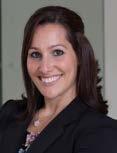

MEMBER SINCE 2005 Traub Lieberman, located in Westchester County, NY, has achieved a national reputation for excellence in legal service. We are recognized by multiple organizations that monitor the legal community for outstanding service and high ethical standards.
Our focus is on innovative solutions to serve the needs of clients with sophisticated legal representation. We represent corporate clients in commercial disputes, and professionals in lawsuits alleging breach of contract and professional negligence, including employment practices, defense of lawyers, accountants, financial advisors, agents, brokers, corporate directors and officers. Our practice groups include defense of general and municipal liability, products liability, and complex toxic tort lawsuits.
Traub Lieberman provides a complete range of services to our insurance company clients including claim and coverage analysis, complex dispute resolution and policy drafting.
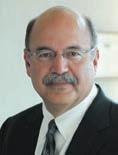
Additional Office: London, England • PH +44 20 3741 9500
ALTERNATE
Megan T. Muirhead
(505) 848-1888
Megan.Muirhead@modrall.com
ALTERNATE
Timothy L. Fields (505) 848-1841
Timothy.Fields@modrall.com
ADDRESS 926 RXR Plaza Uniondale, NY 11556-0926
PH
(516) 357-3000
FAX (516) 357-3333
WEB www.rivkinradler.com
PRIMARY David S. Wilck (516) 357-3347 david.wilck@rivkin.com
MEMBER SINCE 2004
Modrall Sperling provides high quality legal services on a range of issues and subjects important to businesses and individuals in New Mexico. Our clients include financial institutions, state and local governmental bodies, insurance companies, small and family businesses, national and multi-national corporations, energy and natural resource companies, educational institutions, private foundations, farmers, ranchers, and other individuals.With offices in Albuquerque and Santa Fe, the firm provides innovative legal solutions and is prepared to meet both the basic and sophisticated demands of business and individual clients in a challenging economy. Since its founding in 1937, Modrall Sperling has been recognized for excellence in a variety of practice areas and many of our lawyers have been consistently ranked among the best and brightest by peer review, as conducted by legal ranking organizations including Best Lawyers in America®, Chambers USA, Southwest Super Lawyers®, Martindale-Hubbell, and Benchmark Litigation. Several of our lawyers have also been recognized on a regional and national level.
Additional Office: Santa Fe, NM • PH (505) 983-2020
NY BARCLAY DAMON LLP
ADDRESS
The Avant Building, 200 Delaware Avenue Buffalo, NY 14202
PH (716) 856-5500
FAX
(716) 856-5510
WEB www.barclaydamon.com
PRIMARY Peter Marlette (716) 858-3763
pmarlette @barclaydamon.com
ALTERNATE Michael Murphy (518) 429-4209 mjmurphy@ barclaydamon.com

ALTERNATE Courtney Merriman (315) 425-2715 cmerriman@ barclaydamon.com
MEMBER SINCE 2019 Barclay Damon has 300 attorneys across a strategic platform of locations. Our attorneys team across practices and offices to provide customized, targeted solutions grounded in industry knowledge and a deep understanding of clients’ businesses. For more information, visit our award-winning website at barclaydamon.com.
Additional Offices: Albany, NY • PH (518) 429-4200 | Rochester, NY • PH (585) 295-4400 Syracuse, NY • PH (315) 425-2700 | New York, NY • PH (212) 784-5800 | Washington, DC • PH (202) 582-0601
ALTERNATE
ALTERNATE
Jacqueline Bushwack (516) 357-3239 jacqueline.bushwack@rivkin.com
Stella Lellos (516) 357-3373 stella.lellos@rivkin.com

MEMBER SINCE 2016 Through five offices and 200 lawyers, Rivkin Radler consistently delivers focused and effective legal services. We’re committed to best practices that go beyond professional and ethical standards. Our work product is clear and delivered on time. As a result, our clients proceed with confidence.
We provide strong representation and build even stronger client relationships. Many clients have been placing their trust in us for more than 30 years. Our unwavering commitment to total client satisfaction is the driving force behind our firm. We are the advisor-of-choice to successful individuals, middle-market companies and large corporations.
Additional Office: New York, NY • PH (212) 455-9555
NY RIVKIN RADLER LLP NC POYNER SPRUILL LLP


ADDRESS
301 Fayetteville St. Ste. 1900
P.O. Box 1801 (27602) Raleigh, NC 27601
PH (919) 783-6400
FAX (919) 783-1075
WEB www.poynerspruill.com
PRIMARY Deborah E. Sperati (252) 972-7095 dsperati@poynerspruill.com
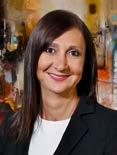
ALTERNATE Randall R. Adams (252) 972-7094 radams@poynerspruill.com
ALTERNATE Karen H. Chapman (704) 342-5293 kchapman@poynerspruill.com
MEMBER SINCE 2004 Poyner Spruill LLP is a large, multidisciplinary North Carolina law firm, providing a comprehensive range of business and litigation legal services. The firm has a reputation for professional excellence and client service throughout the Southeast. Poyner Spruill has approximately 100 attorneys with offices in Charlotte, Raleigh, Rocky Mount, Southern Pines and Wilmington, from which we cover all federal and state courts. Approximately one-half of the firm attorneys practice litigation including a broad range of general commercial litigation, bank litigation and defense work in various types of liability cases. Many of our practice groups send up-to-the-minute legal developments on a myriad of issues pertinent to our clients’ business needs. Our periodic mailings are distributed via e-mail and posted to our web site’s publications page. We invite you and your clients to take advantage of this complimentary news service by signing up through our web site.
Additional Offices: Charlotte, NC • PH (704) 342-5250 | Rocky Mount, NC • PH (252) 446-2341 | Southern Pines, NC • PH (910) 692-6866
72 | US LAW NETWORK MEMBER FIRMS
ND EBELTOFT . SICKLER . LAWYERS PLLC
ADDRESS
2272 Eighth Street West Dickinson, ND 58601
PH (701) 225-5297
FAX (701) 225-9650
WEB www.ndlaw.com
PRIMARY Randall N. Sickler (701) 225-5297 rsickler@ndlaw.com
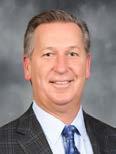

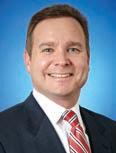


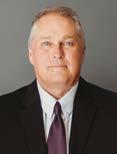
ALTERNATE Nicholas C. Grant (701) 225-5297 ngrant@ndlaw.com
ALTERNATE Courtney Presthus (701) 225-5297 cpresthus@ndlaw.com


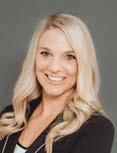
MEMBER SINCE 2003 At Ebeltoft . Sickler . Lawyers PLLC we break away from rigid traditions and place our clients at the heart of all we do.
Our lawyers are skilled in civil litigation and means to avoid litigation. We provide advance planning and problem solving for businesses large and small, established and new. Our clients include a wide range of energy and mineral developers, manufacturers, insurance companies, financial institutions, public entities, hospitals and nursing homes, construction and transportation industries, educational institutions and non-profit entities.
Ebeltoft . Sickler . Lawyers PLLC is a law firm better for you. Better for your needs.
OH ROETZEL & ANDRESS
ADDRESS
1375 East Ninth Street
One Cleveland Center 10th Floor Cleveland, OH 44114
PH (216) 623-0150
FAX (216) 623-0134
WEB www.ralaw.com
PRIMARY Bradley A. Wright (330) 849-6629 bwright@ralaw.com
ALTERNATE
Moira H. Pietrowski (330) 849-6761 MPietrowski@ralaw.com

ADDRESS 1515 SW Fifth Avenue Suite 600 Portland, OR 97201-5449
PH (503) 228-7967
FAX (503) 222-7261
WEB www.williamskastner.com
ALTERNATE Chris Cotter (330) 819-1127 ccotter@ralaw.com
MEMBER SINCE 2003
Founded in 1876, Roetzel & Andress is a leading full-service law firm headquartered in Ohio. The firm provides comprehensive legal services to publicly traded and privately held companies, financial services participants, professional and governmental organizations, as well as private investors, industry executives and individuals. With over 160 lawyers in 12 offices, including five regional offices in Ohio, Roetzel & Andress collaborates seamlessly across industries and disciplines to provide sophisticated transactional, employment and litigation guidance to clients across the public and private sectors.
OK PIERCE COUCH HENDRICKSON BAYSINGER & GREEN, L.L.P.
ADDRESS
1109 North Francis Pierce Memorial Building Oklahoma City, OK 73106
PH (405) 235-1611
FAX
(405) 235-2904
WEB www.piercecouch.com
PRIMARY Gerald P. Green (405) 552-5271 jgreen@piercecouch.com
ALTERNATE Amy Bradley-Waters (918) 583-8100 abradley-waters@ piercecouch.com
ALTERNATE Mark E. Hardin (918) 583-8100 mhardin@piercecouch.com

MEMBER SINCE 2002 Pierce Couch Hendrickson Baysinger & Green, L.L.P. was founded in 1923 and is the largest litigation defense firm in the state of Oklahoma. The Firm has offices in Oklahoma City and Tulsa and is engaged in the representation of clients in all 77 Oklahoma Counties and all three federal district courts. Our attorneys have expertise in the areas listed below and prides itself in developing strategies for the defense of its clients, delivering advice and counsel to deal with claims ranging from the defensible to the catastrophic. Our attorneys have tried hundreds of cases to jury verdict and have mediated and/or arbitrated thousands of disputes. We attribute the success and longevity of our firm to our steadfast philosophy of combining the best in cost-efficient legal services with client-tailored strategies.
Additional Office: Tulsa, OK • PH (918) 583-8100
PRIMARY Thomas A. Ped (503) 944-6988 tped@williamskastner.com
ALTERNATE Heidi L. Mandt (503) 228-7967 hmandt@williamskastner.com
MEMBER SINCE 2002 Williams Kastner has been providing legal and business advice to a broad mix of clients since our Seattle office opened in 1929. With more than 65 lawyers in Washington and Oregon, the firm combines the resources and experience to offer national and regional capabilities with the client service and sensibility a local firm can provide. The firm culture is characterized by hard work, high-performance teamwork, diversity and partnerships with our clients and the local community. Our commitment to our clients is reflected through our quality legal work, personalized approach to servicing our clients and the integrity and pride we devote towards the practice of law.
Additional Office: Seattle, WA • PH (206) 628-6600
OR WILLIAMS KASTNER PA SWEENEY & SHEEHAN, P.C.
ADDRESS 1515 Market Street Suite 1900 Philadelphia, PA 19102
PH (215) 563-9811
FAX (215) 557-0999
WEB www.sweeneyfirm.com
PRIMARY
J. Michael Kunsch (215) 963-2481 michael.kunsch@ sweeneyfirm.com

ALTERNATE
Warren E. Voter (215) 963-2439 warren.voter@ sweeneyfirm.com
ALTERNATE
Robyn F. McGrath (215) 963-2485 robyn.mcgrath@ sweeneyfirm.com

MEMBER SINCE 2003 Founded in 1971, Sweeney & Sheehan is a litigation firm of experienced and dedicated trial attorneys and other professionals working in partnership with our clients to meet their changing and increasingly sophisticated particular needs. With client satisfaction our primary goal, we are committed to delivering superior legal services and pursuing excellence in all aspects of our practice. Our success is achieved without compromising the ideals which define the best in our profession: integrity, loyalty and expertise. We constantly enhance our firm to meet the expectations of our clients. Committed to these principles, we have a reputation as skillful and effective litigators in a broad range of practice areas, providing the talent and experience of larger firms while maintaining flexibility to deliver personalized, cost-effective quality service.
PA PION, NERONE, GIRMAN, WINSLOW & SMITH, P.C.
ADDRESS
1500 One Gateway Center 420 Ft. Duquesne Blvd. Pittsburgh, PA 15222
PH
(412) 281-2288
FAX (412) 281-3388
WEB www.pionlaw.com
PRIMARY John T. Pion (412) 667-6200 jpion@pionlaw.com
ALTERNATE Michael F. Nerone (412) 667-6234 mnerone@pionlaw.com
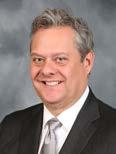
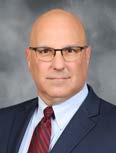
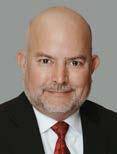

ALTERNATE Timothy R. Smith (412) 667-6212 tsmith@pionlaw.com
MEMBER SINCE 2011 Pion, Nerone, Girman, Winslow & Smith, P.C. is a civil litigation firm with offices in Pittsburgh and Harrisburg.
Our practice areas include transportation, railroad, asbestos, premises liability, products liability, family law, estate, Medicare Set-Aside, workers’ compensation, and general liability. In addition to trial representation, catastrophic response and business consulting, the firm has an appellate and complex research group. The Partners of the firm have more than 150 years of collective experience.
Most of our lawyers and staff were born and raised in Pennsylvania and we are proud to be part of the distinguished Pittsburgh and Harrisburg legal communities. The emergency response telephone number (412-600-0217) is answered by a lawyer 24/7 and allows us to provide high quality service to our clients. We urge our clients to utilize this number should the need arise.
Additional Offices: Akron, OH • PH (330) 376-2700 | Cincinnati, OH • PH (513) 361-0200 | Columbus, OH • PH (614) 463-9770 Toledo, OH • PH (419) 242-7985 | Wooster, OH • PH (330) 376-2700 | Detroit, MI • PH (313) 309-7033 73 | US LAW NETWORK MEMBER FIRMS
RI ADLER POLLOCK & SHEEHAN P.C.
ADDRESS
One Citizens Plaza
8th Floor Providence, RI 02903
PH (401) 274-7200
FAX (401) 751-0604
WEB www.apslaw.com
PRIMARY Richard R. Beretta, Jr. (401) 427-6228 rberetta@apslaw.com
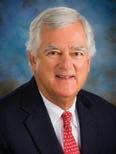

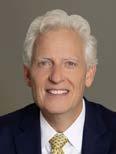
ALTERNATE Robert P. Brooks (401) 274-7200 rbrooks@apslaw.com
ALTERNATE Elizabeth M. Noonan (401) 274-7200 bnoonan@apslaw.com
MEMBER SINCE 2008 Since 1960, Adler Pollock & Sheehan P.C. has delivered client-focused business law services designed to achieve cost-effective solutions for today’s complex challenges. Based in Providence, the firm is a full-service regional law firm, featuring a sophisticated corporate practice and a nationally-renowned litigation practice. The firm successfully combines the depth and breadth of expertise of a large law firm with the advantages of responsive and direct personal service by partners found in smaller firms.
Among the firm’s more than 60 attorneys are several former leaders of the Rhode Island legislature as well as former senior members of state administrations who are able to provide a unique understanding of governmental processes for clients. The firm’s client base includes Fortune 500 and 100 companies, small and medium-sized businesses, individuals, public and quasi-public agencies, and private not for- profit organizations.
Additional Office: Newport, RI • PH (401) 847-1919
SC SWEENY, WINGATE & BARROW, P.A.
ADDRESS
1515 Lady Street Columbia, SC 29201 PO Box 12129 (29211)
PH (803) 256-2233
FAX (803) 256-9177
WEB www.swblaw.com
PRIMARY Mark S. Barrow (803) 256-2233 msb@swblaw.com
ALTERNATE Kenneth B. Wingate (803) 256-2233 kbw@swblaw.com
ALTERNATE Christy E. Mahon (803) 256-2233 cem@swblaw.com
MEMBER SINCE 2002 Sweeny, Wingate & Barrow, P.A. is a litigation and consulting law firm serving the needs of individuals, businesses and insurance companies throughout South Carolina. We are committed to a philosophy of excellence, integrity, and service.
Cooperation, selflessness, and diligence are essential to providing high-quality service to every client. At Sweeny, Wingate and Barrow, we are committed to providing excellent representation to our clients in helping achieve their legal goals. Our relationships with our clients are honest, open, and fair.
Our practice covers many legal issues in two distinct areas. As a business and tort litigation defense firm, we provide defense representation to corporations and individuals in trucking litigation, construction defect litigation, product liability cases, medical malpractice cases, and insurance coverage matters, including opinion letters and defense of accident claims, professional liability, construction defect, and product liability defense.
The other section of our practice includes the transactions and litigation situations that arise in connection with business planning, estate planning, probate administration, and probate litigation. We handle contract drafting, incorporations, startups, wills, trusts, probate matters, and countless other business needs for our clients.
Additional Office: Hartsville, SC • PH (843) 878-0390
SD RITER ROGERS, LLP
ADDRESS Professional & Executive Building
319 South Coteau Street
Pierre, SD 57501
PH
(605) 224-5825
FAX
(605) 224-7102
WEB
www.riterlaw.com
TN MARTIN, TATE, MORROW & MARSTON, P.C.
ADDRESS 6410 Poplar Avenue Suite 1000 Memphis, TN 38119 PH (901) 522-9000
FAX (901) 527-3746
WEB www.martintate.com
PRIMARY Lee L. Piovarcy (901) 522-9000 lpiovarcy@martintate.com
ALTERNATE
ALTERNATE
Earl W. Houston, II (901) 522-9000 ehouston@martintate.com
Shea Sisk Wellford (901) 522-9000 swellford@martintate.com
MEMBER SINCE 2002 Martin Tate was endowed by its founder, Judge John D. Martin, Sr., over 100 years ago, with a solid tradition of service to clients, the profession and the Memphis Community. Because of its long-term commitment to the Memphis community, Martin Tate projects a unique perspective in delivering legal services for Memphis businesses and national clients. The firm combines quality legal services with innovative legal thinking to create practical solutions that provide clients a competitive edge. The firm’s areas of significant practice are business and commercial transactions; litigation in state and federal courts; trusts and estates; and commercial real estate. The firm’s attorneys counsel clients in M&As, banking, IPOs, partnership matters, PILOT transactions, bankruptcy reorganizations and creditor’s rights. Attorneys regularly deal with matters involving contracts, transportation law, insurance, products liability, and employment rights. Attorneys in the real estate section are involved in transactions regarding construction, development, leasing and operation of shopping centers, office buildings, industrial plants, and warehouse distribution centers. The firm is involved in financing techniques for real estate syndications, issuance of tax-exempt bonds, and equity participations.
Additional Office: Nashville, TN • PH (615) 627-0668
FEE, SMITH & SHARP LLP
ADDRESS 13155 Noel Road Suite 1000 Dallas, TX 75240
PH (972) 934-9100 FAX (972) 934-9200 WEB www.feesmith.com
PRIMARY Michael P. Sharp (972) 980-3255 msharp@feesmith.com
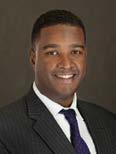
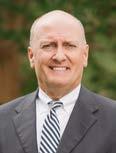
ALTERNATE Thomas W. Fee (972) 980-3259 tfee@feesmith.com
ALTERNATE Jennifer M. Lee (972) 980-3264 jlee@feesmith.com
MEMBER SINCE 2005 Fee, Smith & Sharp, LLP an AV rated firm based in Dallas, Texas, was founded to service the litigation needs of the firm’s individual, corporate and insurance clients. The partners’ combined experience as lead counsel in well over 200 civil jury trials allows the firm to deliver an aggressive, team-oriented approach on behalf of their valued clients. The partnership is supported by a team of talented, experienced, and professional associate attorneys and legal staff who understand the importance of delivering efficient, quality legal services. The attorneys at Fee, Smith & Sharp, LLP are actively involved in representing clients throughout Texas in a variety of commercial, property and casualty cases at the state, federal and appellate levels.
Additional Office: Austin, TX • PH (512) 479-8400
TX MEHAFFY WEBER PC
ADDRESS
One Allen Center 500 Dallas, Suite 2800 Houston, Texas 77002
PH (713) 655-1200 FAX (713) 655-0222 WEB www.mehaffyweber.com
PRIMARY Robert C. Riter r.riter@riterlaw.com

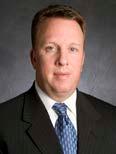
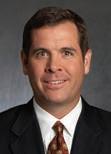
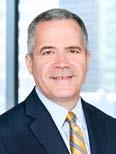

ALTERNATE Darla Pollman Rogers dprogers@riterlaw.com
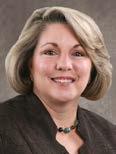



ALTERNATE Lindsey Riter-Rapp l.riter-rapp@riterlaw.com

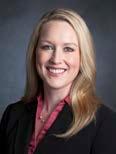

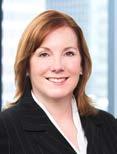
MEMBER SINCE 2004 The original predecessor firm of Riter Rogers, LLP commenced the practice of law in Pierre, South Dakota over 100 years ago.
The firm has a wide and varied practice, particularly in central South Dakota, but also maintains a statewide litigation practice, regularly appears before State boards and commissions, and serves as legislative counsel for numerous associations and cooperatives.
Firm members have spent considerable time representing insurance companies in defense of casualty suits, products liability claims and similar matters.
The firm handles substantial regulatory law matters, and also does much work relating to banking, contracts, real estate, title work and probate and estate planning.
All members of the firm are active in professional activities and civic and fraternal organizations.
PRIMARY Barbara J. Barron (832) 526-9728
BarbaraBarron@ mehaffyweber.com
ALTERNATE Bernabe G. Sandoval, III (713) 210-8906
TreySandoval@ mehaffyweber.com
ALTERNATE Michele Y. Smith (409) 951-7736
MicheleSmith@ mehaffyweber.com
MEMBER SINCE 2019 MehaffyWeber was founded in 1946 as a litigation firm. As our clients’ needs expanded, we evolved into a broad-based law firm, still with a strong litigation emphasis. We tailor our approaches to best suit the client’s individual needs. We are proud to have a long record of winning cases in tough jurisdictions, but we know that not all cases need to be tried. We use legal motions and other means to achieve positive results pre-trial, and when appropriate, we work hand in hand with our clients to secure advantageous settlements. Today, we continue to believe that hard work, ethical and innovative approaches are core values that result in success for the firm and our clients.
Additional Offices: Austin, TX • PH (512) 394-3840 | Beaumont, TX • PH (409) 835-5011 | San Antonio, TX • PH (210) 824-0009
TX
74 | US LAW NETWORK MEMBER FIRMS
UT STRONG & HANNI
ADDRESS
102 South 200 East, Suite 800 Salt Lake City, UT 84111
PH (801) 532-7080
FAX (801) 596-1508
WEB www.strongandhanni.com
PRIMARY
Kristin A. VanOrman (801) 323-2020 kvanorman@ strongandhanni.com
ALTERNATE
Peter H. Christensen (801) 323-2008 pchristensen@ strongandhanni.com
ALTERNATE
Ryan P. Atkinson (801) 323-2195 ratkinson@ strongandhanni.com
MEMBER SINCE 2005 Strong & Hanni, one of Utah’s most respected and experienced law firms, demonstrates exceptional legal ability and superior quality. For more than one hundred years, the firm has provided effective, efficient, and ethical legal representation to individuals, small businesses, and large corporate clients. The firm’s attorneys have received awards and commendations from many national and state legal organizations. The firm’s practice groups allow attorneys to focus their in-depth knowledge in specific areas of the law. The firm’s organization fosters interaction with attorneys across the firm’s practice groups insuring that even the most complex legal matter is handled in the most effective and efficient manner. The firm’s commitment to up to date technology and case management tools allows matters to be handled with client communication and document security in mind. The firm’s trial attorneys have received commendations and recognition from local, state, and national organizations. Our business is protecting your business.
Additional Office: Sandy, UT • PH (801) 532-708
VA MORAN REEVES & CONN PC
ADDRESS
1211 E. Cary Street Richmond, VA 23219
PH (804) 421-6250
FAX (804) 421-6251
WEB www.moranreevesconn.com
PRIMARY A.C.Dewayne Lonas (804) 864-4820 dlonas@moranreevesconn.com
ALTERNATE Martin A. Conn (804) 864-4804 mconn@moranreevesconn.com
ALTERNATE Shyrell A. Reed (804) 864-4826 sreed@moranreevesconn.com
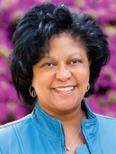
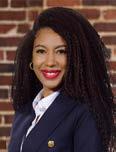
MEMBER SINCE 2022 Richmond, Virginia-based Moran Reeves & Conn PC specializes in complex litigation, business transactions, and commercial real estate/finance. Its attorneys and legal professionals operate within a technologically advanced, nimble work environment. Client service is foremost at Moran Reeves Conn. Firm leaders also encourage community involvement and are proponents of a collaborative, inclusive culture.<br><br>The firm’s litigation team handles product liability defense, toxic torts and environmental litigation, construction litigation, premises liability, commercial litigation, and general liability defense. Its award-winning healthcare team works on matters involving medical professional liability, healthcare litigation, and employment disputes. Known as experienced trial attorneys, MRC lawyers also pursue alternative means of dispute resolution when appropriate, including arbitration and mediation.<br><br>The firm’s robust business transactional practice includes representation of corporate clients and developers in large-scale financing and commercial real estate deals. Team attorneys are experienced in entity formation, creditors’ rights, securities offerings, tax-advantaged arrangements such as 1031 exchanges, and other complex transactions.
WA WILLIAMS KASTNER
ADDRESS
Two Union Square
601 Union Street Suite 4100 Seattle, WA 98101-2380
PH
(206) 628-6600
FAX
(206) 628-6611
WEB
www.williamskastner.com
SENSABAUGH BONASSO PLLC
ADDRESS
200 Capitol Street Charleston, WV 25301
PH (304) 345-0200
FAX (304) 345-0260
WEB
www.flahertylegal.com
PRIMARY Peter T. DeMasters (304) 225-3058 pdemasters@flahertylegal.com





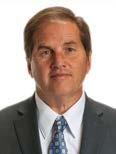
ALTERNATE Tyler Dinsmore (304) 347-4234 tdinsmore@flahertylegal.com

ALTERNATE
Michael Bonasso (304) 347-4259 mbonasso@flahertylegal.com

MEMBER SINCE 2015 Flaherty Sensabaugh Bonasso PLLC serves local, national and international clients in the areas of litigation and transactional law. Founded in 1991, today more than 50 attorneys provide quality counsel to turn clients’ obstacles into opportunities.
At Flaherty, we are deeply committed to partnering with our clients to obtain optimum results. Throughout our history, our prime consideration has been our client’s interests, with a key consideration of the costs associated with litigation.
While avoiding litigation may be desired, when necessary, our attorneys stand prepared to bring their considerable experience to the courtroom. We are experienced in trying matters ranging from simple negligence to complex, multi-party matters involving catastrophic damages.
Additional Offices: Clarksburg, WV • PH (304) 624-5687 | Morgantown, WV • PH (304) 598-0788 | Wheeling, WV • PH (304) 230-6600
ADDRESS 325 E. Chicago Street, Suite 200 Milwaukee, WI 53202
PH (414) 312-7003
FAX (414) 755-7089
WEB www.llgmke.com
PRIMARY Rodney L. Umberger (206) 628-2421 rumberger@williamskastner.com
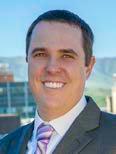



ALTERNATE
Sheryl J. Willert (206) 628-2408 swillert@williamskastner.com

MEMBER SINCE 2002 Williams Kastner has been providing legal and business advice to a broad mix of clients since our Seattle office opened in 1929. With more than 65 lawyers in Washington and Oregon, the firm combines the resources and experience to offer national and regional capabilities with the client service and sensibility a local firm can provide. The firm culture is characterized by hard work, high-performance teamwork, diversity and partnerships with our clients and the local community. Our commitment to our clients is reflected through our quality legal work, personalized approach to servicing our clients and the integrity and pride we devote towards the practice of law.
Additional Office: Portland, OR • PH (503) 228-7967
PRIMARY
Jack J. Laffey (414) 312-7105 jlaffey@llgmke.com

ALTERNATE Joseph S. Goode (414) 312-7181 jgoode@llgmke.com
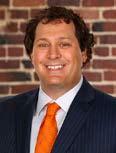
ALTERNATE Mark M. Leitner (414) 312-7108 mleitner@llgmke.com
MEMBER SINCE 2019 Relentless. Inspired. Committed. Authentic. Our team of professionals share an almost fanatical commitment to practicing Law as a means of balancing the unbalanced, leveling the unleveled, and bringing big-time results to you, our client.
We want the hardest problems you can throw at us. There is nothing we love more than diving deep into complex litigation and disputes. We will solve your problems, no matter how large or how small. This team thrives under pressure, so pile it on. Our team of battle-tested attorneys brings an unmatched drive and determination to every client. We don’t rest on our laurels. We innovate and create new solutions to produce winning results. We bring order and symmetry to chaos and complexity. We love what we do.
Lots of firms talk about being responsive; we live it. Our commitment to serving our clients fundamentally shapes how we view and practice law.
We are human beings. While we thrive under incredible challenges and difficult circumstances, we also care deeply about the people we work with and represent. Being authentic also means that we recognize our clients are people too. We understand them, and we know them.
& GOODE LLC WY WILLIAMS, PORTER, DAY & NEVILLE, P.C.
ADDRESS
159 North Wolcott Suite 400 Casper, WY 82601
PH (307) 265-0700
FAX
(307) 266-2306
WEB www.wpdn.net
PRIMARY Scott E. Ortiz (307) 265-0700 sortiz@wpdn.net
ALTERNATE Scott P. Klosterman (307) 265-0700 sklosterman@wpdn.net
ALTERNATE Keith J. Dodson (307) 265-0700 kdodson@wpdn.net
MEMBER SINCE 2006 Williams, Porter, Day & Neville, P.C. (WPDN) has deep roots in Wyoming, running back over 70 years. WPDN is the pinnacle of representation in Wyoming and has been involved in Wyoming’s most seminal legal decisions, across many practice areas, in state and Federal courts. WPDN represents clients from international, national, and state-based insurance providers, publically-traded to privately-held natural resource companies, national and local trucking operations, local and state governmental entities, ranches, banks and other business entities. With its high standards and integrity, WPDN offers clients a vast knowledge and understanding of the ways of Wyoming and provides the highest quality representation within its practice. WPDN attorneys and staff work as a team to ensure fairness, productive working atmosphere and high-quality representation.
WV
WI LAFFEY,LEITNER
FLAHERTY
75 | US LAW NETWORK MEMBER FIRMS
ARGENTINA | BARREIRO, OLIVA, DE LUCA, JACA & NICASTRO
ADDRESS
Av. Córdoba 1309 3° A
Ciudad de Buenos Aires
C1055AAD Argentina
PH +54 11 4814 1746
WEB
www.bodlegal.com
PRIMARY Nicolas Jaca Otano +54 11 4814 1746 njaca@bodlegal.com
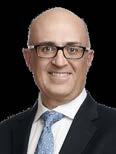


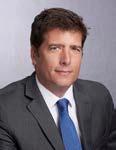
ALTERNATE Gonzalo Oliva-Beltrán +54 11 4814-1746 goliva@bodlegal.com
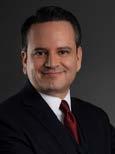


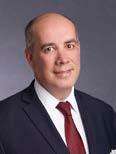
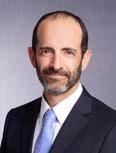
ALTERNATE Ricardo Barreiro Deymonnaz +54 11 4814-1746 rbarreiro@bodlegal.com

MEMBER SINCE 2019 BARREIRO, OLIVA, DE LUCA, JACA & NICASTRO is a law firm based in Buenos Aires, Argentina. We advise our clients on all business matters including M&A, Banking & Finance, Employment & Labor, Dispute Resolution, Regulatory and Tax. We also have special teams focused on infrastructure and construction, corporate and foreign investments, technology, energy and natural resources. As a boutique firm, we have a high involvement at partner and senior associate level, which allows us to work efficiently and to provide an outstanding level of service to our clients
CANADA | THERRIEN COUTURE JOLI-COEUR L.L.P. | QUEBEC
ADDRESS
1100 Blvd. René-Lévesque
West, Suite 2000
Montreal, Quebec H3B 4N4
PH (514) 871-2800 / (855) 633-6326
FAX (514) 871-3933
WEB www.groupetcj.ca
BRAZIL | MUNDIE E ADVOGADOS
ADDRESS
Av. Brig. Faria Lima, 3400
CJ. 151 15.º andar
04538-132 São Paulo, SP, Brazil
PH
(55 11) 3040-2900
WEB
www.mundie.com.br
PRIMARY Rodolpho Protasio (55 11) 3040-2923 rofp@mundie.com.br
ALTERNATE Eduardo Zobaran (55 11) 3040-2923 emz@mundie.com.br
ALTERNATE Cesar Augusto Rodrigues (55 11) 3040-2855 crc@mundie.com.br
MEMBER SINCE 2012 Mundie e Advogados was established with the goal of providing high quality legal services to international and domestic clients. The firm is a full service law firm, with a young and dynamic profile, and it is renowned for its professionalism and its modern and pragmatic approach to the practice of law. Since its inception, in 1996, the firm has been involved in several landmark transactions that helped shape the current Brazilian economic environment and has become a leading provider of legal services in several of its areas of practice, especially in corporate transactions, mergers & acquisitions, finance, tax, litigation, arbitration, governmental contracts and administrative law, regulated markets and antitrust.
Clients of the firm benefit from its knowledge and experience in all areas of corporate life and our commitment to excellence. The firm`s work philosophy, combined with the integration among its offices, practice groups and lawyers, put the firm in a privileged position to assist its clients with the highest quality in legal services.
CANADA | KELLY SANTINI LLP | OTTAWA

ADDRESS
160 Elgin Street
Suite 2401
Ottawa, Ontario K2P 2P7
PH
(613) 238-6321
FAX
(613) 233-4553
WEB
www.kellysantini.com
PRIMARY Lisa Langevin (613) 238-6321 ext 276 llangevin@kellysantini.com

ALTERNATE Kelly Sample (613) 238-6321, ext 227 ksample@kellysantini.com
ALTERNATE J. P. Zubec (613) 238-6321 jpzubec@kellysantini.com
MEMBER SINCE 2011 Kelly Santini LLP is based in the nation’s capital of Ottawa and is ideally placed to advise businesses looking to establish or grow their Canadian operations. We act for many Torontobased financial institutions and insurers and represent clients throughout the province of Ontario. We also regularly advise on procurement matters with the Canadian Federal Government and interface with regulatory bodies at both national and provincial levels on our clients’ behalf. Our Business Group handles cross border transactional files throughout the US.
Our insurance defence team is amongst the largest in the region and is recognized in the Lexpert Legal Directory for Canada as a ‘leading litigation firm in eastern Ontario’ in the area of commercial insurance. The group regularly acts for leading insurers on insurance defence and subrogation.
Additional Office: Ottawa, Ontario • PH (613) 238-6321
PRIMARY Douglas W. Clarke (514) 871-2800 douglas.clarke@groupetcj.ca
ALTERNATE Eric Lazure (450) 462-8555 eric.lazure@groupetcj.ca


ALTERNATE Yannick Crack (819) 791-3326 yannick.crack@groupetcj.ca
MEMBER SINCE 2013 Therrien Couture Joli-Coeur LLP is a team of more than 350 people including a multidisciplinary team of experienced professionals that consist of lawyers, notaries, tax specialists, trademark agents and human resources specialists working together to create a stimulating, collegial work environment in which to serve their clients with an approach to the law that is simple, dynamic and rigorous.
From our original focus on agri-business, the firm has grown and branched out both in terms of its size and expertise. While we have maintained our industry leadership with respect to our historical roots, we handle a wide range of matters for our clients. Our most significant ingredient for success however continues to be the professionals of our firm who commit themselves every day to serving our clients.
Additional Offices:
Brossard, QC • PH (450) 462-8555 | Laval, QC • PH (450) 682-5514 | Quebec City, QC • PH (418) 681-7007
Saint-Hyacinthe, QC • PH (450) 773-6326 | Sherbrooke, QC • PH (819) 791-3326
CHINA | DUAN&DUAN
ADDRESS
Floor 47, Maxdo Center, 8 Xing Yi Road 200336, Shanghai, China
PH
(008621) 6219 1103, ext. 7122
FAX (008621) 6275 2273
WEB www.duanduan.com
PRIMARY George Wang (008621) 3223 0722 george@duanduan.com

MEMBER SINCE 2012 In 1992, Duan&Duan Law Firm was one of the first firm to open its doors in Shanghai and in China. From its beginning, Duan&Duan Law Firm has always offered, to selected PRC Lawyers, a unique opportunity to leave their mark on the legal community and to contribute to China’s flourishing economy and developing legal environment. Due to its long history, Duan&Duan can be seen as a window reflecting the multiple changes and the rapid evolution of the legal industry in the PRC during China’s reform and opening-up. Duan&Duan’s success can be understood by examining closely its unique business model: • It is the first private partnership that has been established in the PRC by Chinese nationals returning to China after completing overseas studies and after gaining working experience abroad; and • It is also a small, but a representative example, of the many successful businesses that saw the need for services focusing on PRC related to foreign businesses and transactions. Duan&Duan Law Firm has grown to become a prestigious medium size PRC law firm, with an international profile and practicing law in accordance with international standards, focusing on legal issues involving foreign businesses and PRC laws and regulations.
MEXICO | EC RUBIO
ADDRESS
Ejército Nacional 7695-C
32663 Ciudad Juárez, Chihuahua México
PH +52 656 227 6100
FAX
+52 55 5596-9853
WEB www.ecrubio.com
PRIMARY René Mauricio Alva +1 (915) 217-5673 rene.alva@ecrubio.com
ALTERNATE Javier Ogarrio +52 (55) 5251-5023 javier.ogarrio@ecrubio.com
ALTERNATE Fernando Holguín +52 (656) 227-6123 fernando.holguin@ecrubio.com
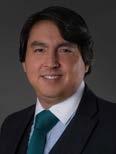
MEMBER SINCE 2016 Our firm’s attorneys have more than 40 years of experience catering to foreign companies doing business in Mexico. Because of the importance of providing high-quality legal assistance to our clients, we have built one of Mexico’s largest legal firms with a presence in the top income per capita cities in Mexico with specialized attorneys with key practices to fulfill our clients’ needs and satisfy their expectations. Our firm and attorneys have been ranked as leading firm and practitioners in Mexico in M&A, customs and foreign trade, labor & employment, real estate and finance. We have a wide range of clients from all spectrums of industries and businesses, each of our clients has its own particular manner of operating and doing business in Mexico, which requires us to be cognizant of their specialized and peculiar legal needs both for their day-today operations, as well as with their finer and greater projects. For many of our clients, our attorneys act as the in-house counsel in Mexico. EC Legal has become their legal department for their entire operations in Mexico, working closely not only with our peers in our clients’ headquarters but also with their local teams..
Additional Office: México City
Additional Offices: Brasilia • PH (55) 61 3321 2105 | Rio de Janeiro - RJ • PH (55) 21 2517 5000
Additional Offices: Beijing • PH 010 - 5900 3938 | Chengdu • PH 028 - 8753 1117 | Chongqing • PH 023-60333 969 Dalian • PH 0411 - 8279 9500 | Hefei • PH 0551 - 6353 0713 | Kunming • PH 0871 - 6360 1395 | Shenzhen • PH 07552515 4874 | Sichuan Province • PH 0838-2555997 | Wanchai • PH 00852 - 2973 0668 | Xiamen • PH 0592 - 2388 600
76 | US LAW NETWORK INTERNATIONAL MEMBER FIRMS
BELGIUM | BRUSSELS CEW & PARTNERS
250 Avenue Louise • 1050 Brussels, Belgium • (+32 2) 534 20 20 • Fax: (+32 2) 534 30 18 • Web: www.cew-law.be Additional Offices: Correspondents in Antwerp and Liège
ENGLAND | LONDON WEDLAKE BELL LLP
71 Queen Victoria Street • London EC4V 4AY • 44(0)20 7395 3000 • Fax: +44(0)20 7395 3100 Web: www.wedlakebell.com
GERMANY | FRANKFURT BUSE
Bockenheimer Landstraße
PRIMARY Charles Price (+32) 485660807 Charles.price@ cew-law.be
ALTERNATE Laurent Verbraken (+32) 477447814 Laurent.verbraken@ cew-law.be




ALTERNATE Sébastien Popijn (+32) 4793084 58 sebastien.popijn@ cew-law.be
CYPRUS DEMETRIOS A. DEMETRIADES LLC.
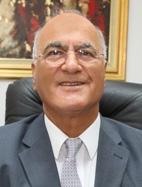
Three Thasos Street • Nicosia, 1087 • Cyprus PHONE: (+357) 22 769 000 • FAX (+357) 22 769 004 Web: www.dadlaw.com.cy
PRIMARY Martin Arnold +44 (0)20 7395 3186 marnold@wedlakebell.com

ESTONIA | LATVIA | LITHUANIA LEXTAL LEGAL
PRIMARY Jasper Hagenberg (+49) 30 327942 38 hagenberg@buse.de
ALTERNATE Michael Krämer (+49) 69 989 7235-55 brueckner@buse.de
ALTERNATE Dr. Dagmar Waldzus (+49) 40 41999 215 waldzus@buse.de




GREECE | ATHENS CORINA FASSOULI-GRAFANAKI & ASSOCIATES


PRIMARY Demetrios A. Demetriades +357 22769000 ddemetriades@dadlaw. com.cy
ALTERNATE Harris D. Demetriades +357 22769000 hdemetriades@dadlaw. com.cy
ALTERNATE Natasa Flourentzou +357 22769000 nflourentzou@dadlaw. com.cy
CZECH REPUBLIC | PRAGUE VYSKOCIL, KROSLAK & PARTNERS, ADVOCATES
PRIMARY Lina SiksniuteVaitiekuniene ILAW LEXTAL +370 5 248 76 70 lina.vaitiekuniene@ ilaw.legal
ALTERNATE Urmas Ustav LEXTAL +372 6400 250 urmas.ustav@lextal.ee
ALTERNATE Jãnis Ešenvalds RER LEXTAL +371 67 280 685 esenvalds@rer.legal
FINLAND | HELSINKI LEXIA ATTORNEYS LTD.
PRIMARY Korina Fassouli-Grafanaki (+30) 210-3628512 korina.grafanaki@ lawofmf.gr

ALTERNATE Anastasia Aravani (+30) 210-3628512 anastasia.aravani@ lawofmf.gr
ALTERNATE Theodora Vafeiadou (+30) 210-3628512 nora.vafeiadou@ lawofmf.gr
HUNGARY | BUDAPEST BIHARY BALASSA & PARTNERS
PRIMARY
Jiri Spousta (00 420) 224 819 133 spousta@akvk.cz
ALTERNATE Michaela Fuchsova (00 420) 224 819 106 fuchsova@akvk.cz
DENMARK | COPENHAGEN LUND ELMER SANDAGER
PRIMARY Markus Myhrberg +358 10 4244200 markus.myhrberg@lexia.fi
ALTERNATE Peter Jaari +358 10 4244200 peter.jaari@lexia.fi
FRANCE | PARIS & LYON DELSOL AVOCATS

Lassagne • LYON 69001 France • +33(0) 472102030 • Web: www.delsolavocats. com • contact@delsolavocats.com
PRIMARY Ágnes Dr. Balassa 0036) 391-44-91 agnes.balassa@bihary balassa.hu
ALTERNATE Tibor Dr. Bihary (0036) 391-44-91 tibor.bihary@bihary balassa.hu
IRELAND | DUBLIN KANE TUOHY LLP SOLICITORS




Hambleden House, 19-26 Pembroke Street Lower, Dublin 2 Ireland • (+353) 1 6722233 • Fax: (+353) 1 6786033 • Web: www.kanetuohy.ie
PRIMARY Jacob Roesen (+45 33 300 268) jro@les.dk
ALTERNATE Sebastian Rungby (+45 33 300 255) sru@les.dk
ALTERNATE Carsten Brink (+45 33 300 203) cb@les.dk


PRIMARY Emmanuel Kaeppelin (+33) 472102007 ekaeppelin@ delsolavocats.com








PRIMARY Hugh Kane (+353) 1 6722233 hkane@kanetuohy.ie
ALTERNATE Cómhnall Tuohy (+353) 1 67722240 ctuohy@kanetuohy.ie
101 • Frankfurt 60325 Germany • (+49) 69 9897235-0 • Fax: (+49) 69 989 7235-99 • Web: www.buse.de Additional Offices: Berlin, Düsseldorf, Essen, Hamburg, Munich, Stuttgart, Sydney, Brussels, London, Paris, Milan, New York, Zurich, Palma de Mallorca Konstitucijos ave. 7 • LT-09308 Vilnius • Lithuania • (+370) 5 248 76 70 • Web: www.lextal.legal Additional Offices: Estonia • Latvia Panepistimiou 16 • Athens 10672 Greece • +30 210-3628512 • Fax: +30 210-3640342 • Web: www.cfgalaw.com Additional Offices: New York City Vorsilska 10 • 110 00 Prague 1 • Czech Republic • +420 224 819 141 • Fax: +420 224 816 366 • Web: www.akvk.cz Lönnrotinkatu 11 • FI-00120 Helsinki, Finland • +358 104 244 200 • Fax: +358 104 244 21 • Web: www.lexia.fi Zugligeti út 3 • Budapest 1121 Hungary • +36 1 391 44 91 • Fax: +36 1 200 80 47 • Web: www.biharybalassa.hu Kalvebod Brygge 39-41 • DK-1560 Copenhagen V • (+45 33 300 200) • Fax: (+45 33 300 299) • Web: www.les.dk 4 bis, rue du Colonel Moll • PARIS 75017 France • +33(0) 153706969 • 11, quai André
77 | TELFA MEMBER FIRMS
ITALY | PADUA
LEGALITAX STUDIO LEGALE E TRIBUTARIO
Main offices: Gall. Dei Borromeo, 3 - 35137 Padua • +39 049 877 58 11• Fax: +39 049 877 58 38 • Web: www. legalitax.it • 20123 Milano piazza Pio XI no.1 • 00196 Roma via Flaminia no. 135
Additional Office: 37122 Verona via Locatelli no. 3
NORWAY | OSLO ADVOKATFIRMAET BERNGAARD AS


Beddingen 8, 0250 Oslo, Norway • Telephone: +47 22 94 18 00 • Web: www.berngaard.no
SPAIN | MADRID ADARVE ABOGADOS SLP
Calle Guzmán el Bueno • 133, Edif. Germania • 4ª planta-28003 Madrid, Spain • (0034)91 591 30 60 • Fax: (0034)91 444 53 65 • info@adarve.com • Web: www.adarve.com
Additional Offices: Barcelona • Canary Islands • Malaga • Santiago de Compostela • Seville • Valencia
PRIMARY Alessandro Polettini +39 049 877 58 11 alessandro.polettini@ legalitax.it

ALTERNATE
Rescigno +39 02 45381201 andrea.rescigno@ legalitax.it
LUXEMBOURG | LUXEMBOURG TABERY & WAUTHIER
BP 619 • Luxembourg L-2016 • Grand-Duchy of Luxembourg • 10 rue Pierre d’Aspelt • Luxembourg L-1142 • +352 25 15 15-1 • Fax: +352 45 94 61 • Web: www.tabery.eu
PRIMARY Tom Eivind Haug +47 906 53 609 haug@berngaard.no

ALTERNATE Inger Roll-Matthiesen +47 928 81 388 irm@berngaard.no
POLAND | WARSAW GWW
ALTERNATE Heidi Grette +47 900 68 954 heidi@berngaard.no
PRIMARY Juan José Garcia (0034) 91 591 30 60 Juanjose.garcia@adarve.com
ALTERNATE Belén Berlanga (0034) 91 591 30 60 belen.berlanga@adarve.com
SWEDEN | STOCKHOLM WESSLAU SÖDERQVIST ADVOKATBYRÅ
PRIMARY Véronique Wauthier (00352) 251 51 51 avocats@tabery.eu






ALTERNATE Didier Schönberger (00352) 251 51 51 avocats@tabery.eu






MALTA | VALLETTA EMD
Vaults 13-15 • The Valletta
Dobra 40, 00-344 Warszawa, Poland • +48 22 212 00 00 • Fax: +48 22 212 00 01 • Web: www.gww.pl
Kungsgatan 36, PO Box 7836 • SE-103 98 Stockholm Sweden • (+46) 8 407 88 00 • Fax: (+46) 8 407 88 01• Web: www.wsa.se Additional Offices: Borås • Gothenburg • Helsingborg • Jönköping • Malmö • Umeå
PRIMARY Aldona Leszczynska-Mikulska +48 22 212 00 00 Aldona.leszczynska-mikulska@gww.pl
PORTUGAL | LISBOA CARVALHO MATIAS & ASSOCIADOS
PRIMARY Max Björkbom (+46) 8 407 88 00 max.bjorkbom@wsa.se
ALTERNATE Henrik Nilsson (+46) 8 407 88 00 henrik.nilsson@wsa.se
SWITZERLAND | GENEVA AND ZURICH MLL
PRIMARY Dr. Italo Ellul (+356) 99426555 iellul@emd.com.mt
ALTERNATE Dr. Tonio Ellul (+356) 99476110 tellul@emd.com.mt
NETHERLANDS | ARNHEM DIRKZWAGER
ALTERNATE Dr. Pierre Mifsud (+356) 99421212 pmifsud@emd.com.mt



PRIMARY António A. Carvalho (+351) 21 8855448 acarvalho@cmasa.pt
ALTERNATE Rita Matias (+351) 21 8855447 rmatias@cmasa.pt
SLOVAKIA | BRATISLAVA ALIANCIAADVOKÁTOV
PRIMARY Nadine von Büren-Maier (00 41) 58 552 01 50 nadine.vonburen-maier@ mll-legal.com


ALTERNATE Wolfgang Müller (00 41) 58 552 05 70 wolfgang.muller@ mll-legal.com
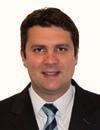
ALTERNATE Guy-Philippe Rubeli (00 41) 58 552 00 90 guy.philippe.rubeli@ mll-legal.com
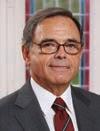
PRIMARY
Karen A. Verkerk +31 26 365 55 57 Verkerk@dirkzwager.nl
ALTERNATE Claudia van der Most +31 26 353 83 64 Most@dirkzwager.nl
ALTERNATE Daan Baas +31 26 353 84 16 Baas@dirkzwager.nl
PRIMARY Gerta Sámelová Flassiková +421 903 717431 flassikova@aliancia.sk

ALTERNATE Jan Voloch +421 903 297294 voloch@aliancia.sk

Waterfront • FRN 1914 MALTA +356 2203 0000 • Fax: +356 2123 7277 Web: www.emd.com.mt Rua Júlio de Andrade, 2 • Lisboa 1150-206 Portugal • (+351) 21 8855440 • Fax: (+351) 21 8855459 Web: www.cmasa.pt 65 rue du Rhône | PO Box 3199 • Geneva 1211 • Switzerland • (00 41) 58 552 01 00 Web: www.mll-legal.com Additional Offices: Zurich • Lausanne • Zug • London • Madrid
• 6800 AC
• The Netherlands • Velperweg 1 • 6824 BZ Arnhem • The
• +31 88
100 • Fax: +31
•
Additional Office: Nijmegen Vlˇckova 8/A • Bratislava 811 05 Slovakia • +421 2 57101313 • Fax: +421 2 52453071 • Web: www.aliancia.sk
Postbus 111
Arnhem
Netherlands
24 24
88 24 24 111
Web: www.dirkzwager.nl
Andrea
78 | TELFA MEMBER FIRMS
THANK Y OU PARTNERS
S-E-A
OFFICIAL TECHNICAL FORENSIC ENGINEERING AND LEGAL VISUALIZATION SERVICES PARTNER
www.SEAlimited.com
7001 Buffalo Parkway
Columbus, OH 43229
Phone: (800) 782-6851
Fax: (614) 885-8014
Chris Torrens Vice President
795 Cromwell Park Drive, Suite N
Glen Burnie, MD 21061
Phone: (410) 766-2390
Email: ctorrens@SEAlimited.com
Ami Dwyer, Esq. General Counsel
795 Cromwell Park Drive, Suite N
Glen Burnie, MD 12061
Phone: (410) 766-2390
Email: adwyer@SEAlimited.com
Dick Basom Manager, Regional Business Development
7001 Buffalo Parkway
Columbus, Ohio 43229
Phone: (614) 888-4160
Email: rbasom@SEAlimited.com
S-E-A is proud to be the exclusive partner/sponsor of technical forensic engineering and legal visualization services for USLAW NETWORK.
A powerful resource in litigation for more than 50 years, S-E-A is a multi-disciplined forensic engineering, fire investigation and visualization services company specializing in failure analysis. S-E-A’s full-time staff consists of licensed/registered professionals who are experts in their respective fields. S-E-A offers complete investigative services, including: mechanical, biomechanical, electrical, civil and materials engineering, as well as fire investigation, industrial hygiene, visualization services, and health sciences—along with a fully equipped chemical laboratory. These disciplines interact to provide thorough and independent analysis that will support any subsequent litigation.
S-E-A’s expertise in failure analysis doesn’t end with investigation and research. Should animations, graphics, or medical illustrations be needed, S-E-A’s Imaging Sciences/Animation Practice can prepare accurate demonstrative pieces for litigation support. The company’s on-staff engineers and graphics professionals coordinate their expertise and can make a significant impact in assisting a judge, mediator or juror in understanding the complex principles and nuances of a case. S-E-A can provide technical drawings, camera-matching technology, motion capture for biomechanical analysis and accident simulation, and 3D laser scanning and fly-through technology for scene documentation and preservation. In addition, S-E-A can prepare scale models of products, buildings or scenes made by professional model builders or using 3D printing technology, depending on the application.
You only have one opportunity to present your case at trial. The work being done at S-E-A is incredibly important to us and to our clients – because a case isn’t made until it is understood. Please visit www.SEAlimited.com to see our capabilities and how we can help you effectively communicate your position.
US LAW SUMMER 2023 USLAW MAGAZINE 79 2023 USLAW Corporate Partners
HHHHH
USLAW PREMIER PARTNER
American Legal Records
OFFICIAL RECORD RETRIEVAL PARTNER
www.americanlegalrecords.com
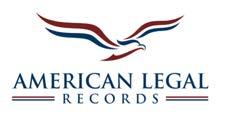
1974 Sproul Road, 4th Floor
Broomall, PA 19008
Phone: (888) 519-8565
Michael Funk
Director of Business Development
Phone: (610) 848-4302
Email: mfunk@americanlegalrecords.com
Jeff Bygrave
Account Executive
Phone: (610) 848-4350
Email: jbygrave@americanlegalrecords.com
Kelly McCann
Director of Operations
Phone: (610) 848-4303
Email: kmccann@americanlegalrecords.com
American Legal Records is the fastest-growing record retrieval company in the country. The pandemic has greatly impacted the record retrieval industry and made it increasingly difficult to obtain medical records in a timely fashion. We have streamlined this process to eliminate the monotonous, never-ending time your team/panel counsel is spending on obtaining records. Our team has over 200 years of experience and can provide nationwide coverage for all your record retrieval needs. Our highly trained staff is experienced in all civil rules of procedures and familiar with all state-mandated statutes regarding copying fees. We are approved by more than 80% of the carriers and TPAs.
Partners
Ametros OFFICIAL FUTURE MEDICAL FUND MANAGEMENT PARTNER
www.ametros.com
P.O. Box 827
Burlington, MA 01803
Phone: (877) 275-7415
Mark Doherty, CMSP
Executive Vice President of Sales
Email: mdoherty@ametros.com
Ametros is the largest and most trusted professional administration expert in the industry, working closely with everyone involved in the settlement process to drive resolution and provide support, security and potential savings for injured individuals once they settle their case. Ametros becomes the injured individual’s main resource to help guide them through their medical treatment and any necessary reporting after settlement. Ametros helps ease settlement fears and assists in settling difficult and complex claims, including workers’ compensation, liability, trusts, life care plans, Medicare Set Asides, and all other future medical allocations.
Arcadia
OFFICIAL STRUCTURED SETTLEMENT PARTNER
www.teamarcadia.com
5613 DTC Parkway, Suite 610 Greenwood Village, CO 80111
Phone: (800) 354-4098
Rachel D. Grant, CSSC
Structured Settlement Consultant
Phone: (810) 376-2097
Email: rgrant@teamarcadia.com
Your USLAW structured settlements consultants are:
Len Blonder • Los Angeles, CA
Rachel Grant, CSSC • Detroit, MI
Richard Regna, CSSC • Denver, CO
Iliana Valtchinova • Pittsburgh, PA
Arcadia Settlements Group is honored to be USLAW’s exclusive partner for structured settlement services.
Arcadia Settlements Group (Arcadia) and Structured Financial Associates (SFA) have merged to create the largest provider of structured settlement services, combining the strength of best-inclass consultants, innovative products and services, and deep industry expertise. Our consultants help resolve conflicts, reduce litigation expenses, and create long-term financial security for injured people through our settlement consulting services. Arcadia Consultants also assist in the establishment and funding of other settlement tools, including Special Needs Trusts and Medicare Set-Aside Arrangements, and are strategically partnered to provide innovative market-based, tax-efficient income solutions for injured plaintiffs.
Arcadia is recognized as the first structured settlement firm with more than 45 years in business. Our consultants have used our skill and knowledge, innovative products and unparalleled caring service to help settle more than 325,000 claims involving structured settlement funding of more than $40 billion and have positively impacted hundreds of thousands of lives by providing security and closure.
80 SUMMER 2023 USLAW MAGAZINE US LAW 2023
USLAW Corporate
IMS Consulting
OFFICIAL JURY CONSULTANT AND COURTROOM TECHNOLOGY PARTNER
www.expertservices.com
4400 Bayou Boulevard, Suite 4 Pensacola, FL 32503
Phone: (877) 838-8464
Twitter:@ExpertServices
Merrie Jo Pitera, Ph.D.
Senior Director of Jury Consulting
Phone: 913.339.6468
Email: mjpitera@expertservices.com
Adam Bloomberg
Client Services Advisor
Phone: 214.395.7584
Email: abloomberg@expertservices.com
Jill Leibold, Ph.D.
Jury Consulting Advisor
Phone: 310.809.8651
Email: jleibold@expertservices.com
Nick Polavin, PhD Senior Jury Consultant npolavin@expertservices.com
Email: 616-915-9620
Your goal is to provide high-caliber advocacy for your client—IMS Consulting helps you achieve that goal by providing jury consulting and courtroom technology services.
Everything we do at IMS is anchored in our commitment to help you gain the best position to win. Our 2021 union with Litigation Insights joined complementary strengths and common ideals to elevate your visual communications and jury research.
For 30 years, the most influential attorneys and firms have relied on IMS for the most comprehensive trial services. Our unique perspectives and proprietary methods have been developed over more than 20,000 cases and 2,000 completed trials. With strategic locations in major U.S. markets, the IMS team is primed to support your in-person and remote litigation proceedings.
Gain peace of mind with our experienced trial professionals. Let’s work together: expertservices.com.
Marshall Investigative Group
OFFICIAL INVESTIGATIVE PARTNER
www.mi-pi.com
401 Devon Ave. Park Ridge, IL 60068
Phone: (855) 350-6474 (MIPI)
Doug Marshall President
Email: dmarshall@mi-pi.com
Adam M. Kabarec Vice President
Email: akabarec@mi-pi.com
Matt Mills
Vice President of Business Development
Email: mmills@mi-pi.com
Thom Kramer Director of Business Development and Marketing
Email: tkramer@mi-pi.com
Amie Norton Business Development Manager
Email: anorton@mi-pi.com
Jake Marshall Business Development Manager jmarshall@mi-pi.com
Shannon Thompson Business Development Manager
sthompson@mi-pi.com
Marshall Investigative Group is a national investigative firm providing an array of services that help our clients mediate the validity of questionable cargo, disability, liability and workers’ compensation claims. Our specialists in investigations and surveillance have a variety of backgrounds in law enforcement, criminal justice, military, business and the insurance industry. Our investigators are committed to innovative thinking, formative solutions and detailed diligence.
One of our recent achievements is leading the industry in Internet Presence Investigations. With the increasing popularity of communicating and publishing personal information on the internet, internet presence evidence opens doors in determining the merit of a claim. Without approved methods for collection and authentication this information may be inadmissible and useless as evidence. Our team can preserve conversations, photographs, video recordings, and blogs that include authenticating metadata, and MD5 hash values. Our goal is to exceed your expectations by providing prompt, thorough and accurate information. At Marshall Investigative Group, we value each and every customer and are confident that our extraordinary work, will make a difference in your bottom line.
MDD Forensic Accountants
OFFICIAL FORENSIC ACCOUNTANT PARTNER
www.mdd.com
11600 Sunrise Valley Drive, Suite 450 Reston, VA 20191
Phone: (703) 796-2200
Fax: (703) 796-0729
David Elmore, CPA, CVA, MAFF
11600 Sunrise Valley Drive, Suite 450 Reston, VA 20191
Phone: (703) 796-2200
Fax: (703) 796-0729
Email: delmore@mdd.com
Kevin Flaherty, CPA, CVA
10 High Street, Suite 1000
Boston, MA 02110
Phone: (617) 426-1551
Fax: (617) 830-9197
Email: kflaherty@mdd.com
Matson, Driscoll & Damico is a leading forensic accounting firm that specializes in providing economic damage quantification assessments for our clients. Our professionals regularly deliver expert, consulting and fact witness testimony in courts, arbitrations and mediations around the world.
We have been honored to provide our expertise on cases of every size and scope, and we would be pleased to discuss our involvement on these files while still maintaining our commitment to client confidentiality. Briefly, some of these engagements have involved: lost profit calculations; business disputes or valuations; commercial lending; fraud; product liability and construction damages. However, we have also worked across many other practice areas and, as a result, in virtually every industry.
Founded in Chicago in 1933, MDD is now a global entity with over 40 offices worldwide.
In the United States, MDD’s partners and senior staff are Certified Public Accountants; many are also Certified Valuation Analysts and Certified Fraud Examiners. Our international partners and professionals possess the appropriate designations and are similarly qualified for their respective countries. In addition to these designations, our forensic accountants speak more than 30 languages.
Regardless of where our work may take us around the world, our exceptional dedication, singularly qualified experts and demonstrated results will always be the hallmark of our firm. To learn more about MDD and the services we provide, we invite you to visit us at www.mdd.com •
Services include:
•
US LAW SUMMER 2023 USLAW MAGAZINE 81 2023 USLAW Corporate
Partners
Activity/Background Checks
AOE / COE
Asset Checks
Bankruptcies
Contestable Death
Criminal & Civil Records
Decedent Check
Intellectual Property Investigations
Internet Presence Investigations
Pre-Employment
Recorded Statements
•
•
•
•
•
•
•
•
•
•
Skip Trace
Surveillance
•

Precisely revealing the cause of accidents and thoroughly testing to mitigate risk. Doing both at the highest level is what sets us apart. From our superior forensics talent, technology, and experience to the visualization expertise of our Imaging Sciences team, we dig past the speculation to find and convey the truth about what happened like no one else. We erase the speculation. We analyze the could’ve beens. We investigate the maybes. We explain away the what-ifs. To take note of the facts. Know. © 2023 800.782.6851 SEAlimited.com Since 1970 SUBMIT AN ASSIGNMENT Forensic Engineering, Investigation and Analysis Proud Partner USLAW NETWORK Inc. since 2004.






















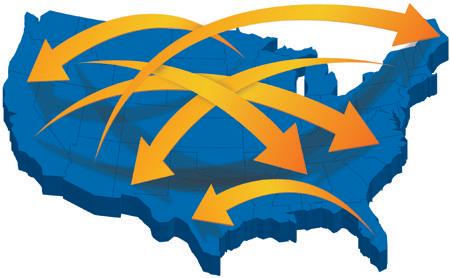


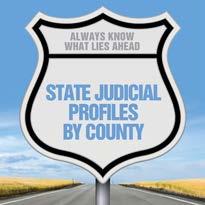
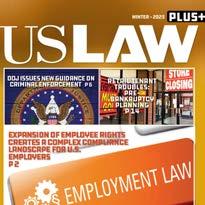



























www.uslaw.org 11555 Heron Bay Blvd., Suite 200 Coral Springs, FL 33076 fall 2023 USLAW NETWORK Client Conference OCTOBER 5-7, 2023 WALDORF ASTORIA MONARCH BEACH DANA POINT, CALIFORNIA www.uslaw.org Compendium of Law SPOLIATION OF EVIDENCE FALL 2014 Santiago CHINA Shanghai Hong Kong Birmingham, AL 35216 (205) 822-2006 AL CARR ALLISONand efficient legal representation. We are the largest pure litigation firm Alabama and have been recognized top five law firm by the include two former USLAW Chairs, the Executive Director the Alabama Self-Insurers Association, adjunct faculty Alabama’s law schools and several national speakers and writers on legal subjects ranging from punitive Daphne, PH (251) 626-9340 Dothan, AL PH (334) 712-6459 Florence, AL PH (256) 718-6040 Jacksonville, PH (904) 328-6456 Tallahassee, PH (850) 222-2107 Gulfport, MS PH (228) 864-1060 AZ Jones, Skelton & Hochuli, PLC Phillip Stanfield Michael Ludwig mludwig@jshfirm.com Clarice Spicker cspicker@jshfirm.com Jones, Skelton Hochuli, PLC the largest and most experienced law firm liability insureds throughout Arizona, New Mexico, and Utah. Recognized highly skilled, aggressive defenders the legal and business communities, JSH lawyersand mediation services. With over 75 years collective experience, our nationally-recognized in-house appellate team has handled over 800 appeals state and federal courts. AR Quattlebaum, Grooms & Tull PLLC www.QGTlaw.com Springdale, AR (479) 444-5200 With offices in Northwest and Central Arkansas, Quattlebaum, Grooms and respect to all clients, always keeping our client’s best interests the forefront. Whether engaging in CA Murchison & Cumming, LLP CA Klinedinst PC Irvine, CA (714) 972-9977 MEMBER SINCE 2001 Founded in 1930, Murchison Cumming, LLP an AV-rated AmLaw 500 “Go To” law firm for litigation California. One third the firm’s shareholders are from diverse backgrounds. individuals in litigated, non-litigated and transactional matters. We value our reputation for excellence and approach our work with enthusiasm and passion. What truly result in focused, efficient, and effective manner. Heather Rosing hrosing@klinedinstlaw.com 501 West Broadway Klinedinst PC serves domestic and international clients broad range of institutions, and individuals at both the trial and appellate levels federal and state courts. Each matter is diligently and effectively managed, from simple transactions to complex document-intensive matters and efforts of each member the firm. Klinedinst’s overriding goal to efficiently and effectively achieve optimal results for each client’s legal and business interests. Additional Office: Irvine, CA PH (949) 868-2600 CA Hanson bridgett llp (415) 777-3200 Hanson Bridgett LLP full service AmLaw 200 law firm with more than creating an environment that provides opportunities for people with varied backgrounds, both for attorneys and administrative professionals. We are also committed to the communities where our employees live and 1 USLAW NETWORK MEMBER FIRMS SO MUCH MORE THAN JUST A NETWORK OF OVER 6000 ATTORNEYS USLAW MEMBER CLIENTS RECEIVE THESE COMPLIMENTARY SERVICES: EDUCATION A TEAM OF EXPERTS USLAW ON CALL LAWMOBILE COMPENDIA OF LAW STATE JUDICIAL PROFILES BY COUNTY HOME FIELD ADVANTAGE PRACTICE GROUPS USLAW CONNECTIVITY USLAW MAGAZINE VIRTUAL OFFERINGS USLAW MEMBERSHIP DIRECTORY RAPID RESPONSE CLIENT LEADERSHIP COUNCIL AND PRACTICE GROUP CLIENT ADVISORS For more information about these complimentary services, visit uslaw.org today! ®
























 Rachel Grant, CSSC Detroit, MI
Rich Regna, CSSC Denver, CO
Iliana Valtchanova Pittsburgh, PA
Len Blonder Los Angeles, CA
Rachel Grant, CSSC Detroit, MI
Rich Regna, CSSC Denver, CO
Iliana Valtchanova Pittsburgh, PA
Len Blonder Los Angeles, CA



































 Jake Pipinich and Charlie Schreck Pierce Couch Hendrickson Baysinger & Green, LLP
Jake Pipinich and Charlie Schreck Pierce Couch Hendrickson Baysinger & Green, LLP





 Amie Norton Marshall Investigative Group
Amie Norton Marshall Investigative Group





 has occurred on a secondary or tertiary level, strict rules and enforcement will be the strongest defense.
has occurred on a secondary or tertiary level, strict rules and enforcement will be the strongest defense.

















































































































































































































































































































































